Liz Truss government formation – September 2022
As the Conservative leadership election draws to a close and Liz Truss takes office as prime minister, the IfG team follow the latest developments.
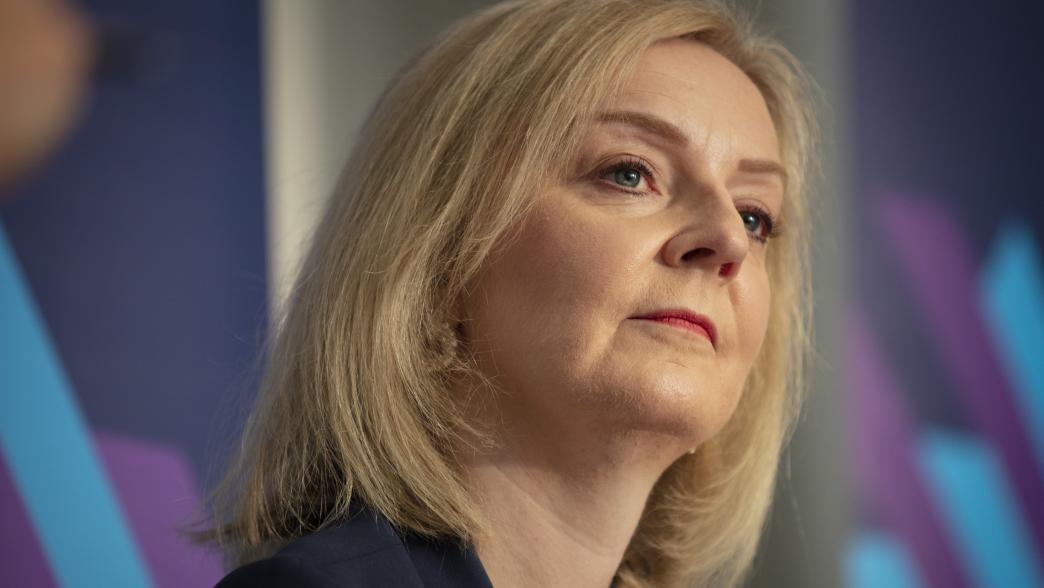
Ministerial appointments slowly continue - many posts still to fill
13 September 2022, 13:45
Last week, the formation of Liz Truss’ government was—understandably—paused following the death of Queen Elizabeth II.
The major appointments—to the cabinet—had already been made prior to the Queen’s death, as had some more junior ministers.
By our count, 73 posts have been filled, with the majority of them new appointments, although some ministers have stayed in the same roles. This means that a large number of ministers are yet to be appointed, as governments usually have around 110-120 ministers. Of course, the prime minister may choose not to fill each of the posts that existed before she took over, and she may choose to create some new ones that did not previously exist.
Some appointments were made at the end of last week, but we do not know when the expected further appointments will be made—and because all ministerial appointments must be formally signed off by the King, it may take some time, as the attention of both the government and the Palace is, of course, elsewhere at the moment.
We will bring you updates and analysis when further ministerial appointments are announced—but in the meantime, it is also worth emphasising the importance of government continuity. In the same way that there is always a monarch, there is always a government. While it is incredibly rare for both the monarch and the government to change within the period of just a few days, the principle of continuity is what ensures stability. The day-to-day work of government is continuing amid everything else—and ministers will remain in place until such time as they are moved.
We believe this is how the government currently stands - the large numbers of pink squares show how many people are new to their role:
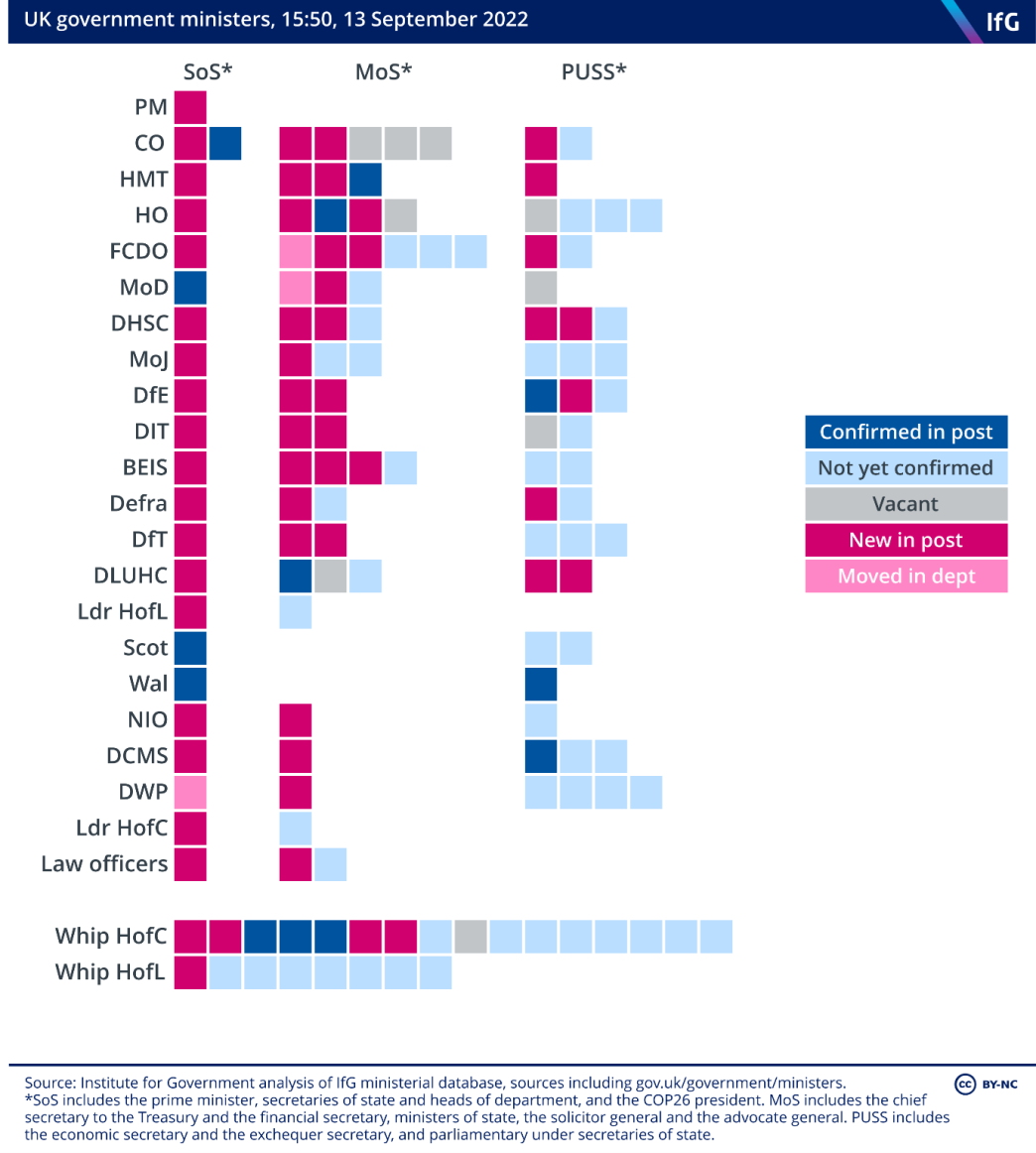
Where have all the ministers gone?
8 September 2022, 10:55
Truss has now appointed (we believe) 52 minsters to the government. Most governments have around 110-120 ministers (although not all are paid), so we don't think Truss is even halfway through the appointments list. Yes, all the big posts have been filled, and there have clearly been a lot of other things for her to deal with, but this feels like a slow, drawn out reshuffle. Given the briefing over the weekend about who would be getting which posts, we thought it would all be sorted, but it's clear the junior ranks are taking time.
These junior ranks are important - they have responsibility for specific policy issues, legislation and government services, and help a secretary of state manage their workload. With new secretaries of state getting up to speed in their departments, they'll want to know who is in their team to get going on the work. And with a heavy legislative agenda - even with some of Johnson's bills dropped - the government needs a full team of Whips to manage business in parliament. There are also lots of ambitious MPs hoping for a job - Truss possibly can't please everyone but she will be able to move allies into government.
So we're wondering - why is it taking so long? In the meantime, if you're interested in what junior ministers do (or you're hoping for a call from No10 yourself), have a read of our paper, setting out what the job is really like:
Many first-time ministers report a feeling of confusion about what precisely their new role entails. It is a job like no other, and there is little training available beforehand to those likely to be appointed. Stephen Hammond, who worked as a junior transport minister during the coalition, reflected that “there is no gradualism in this. You can’t halfway jump into the swimming pool”. Ministers have to get stuck into the job immediately.
Day 3 of Truss's premiership
8 September 2022, 10:00
Well Liz Truss has been prime minister since Tuesday lunchtime and still has many vacancies to fill in her government. With a big announcement today on energy bills, we don't expect the appointments to be particularly rapid - she'll have a lot to be dealing with. This is where the government stands now:
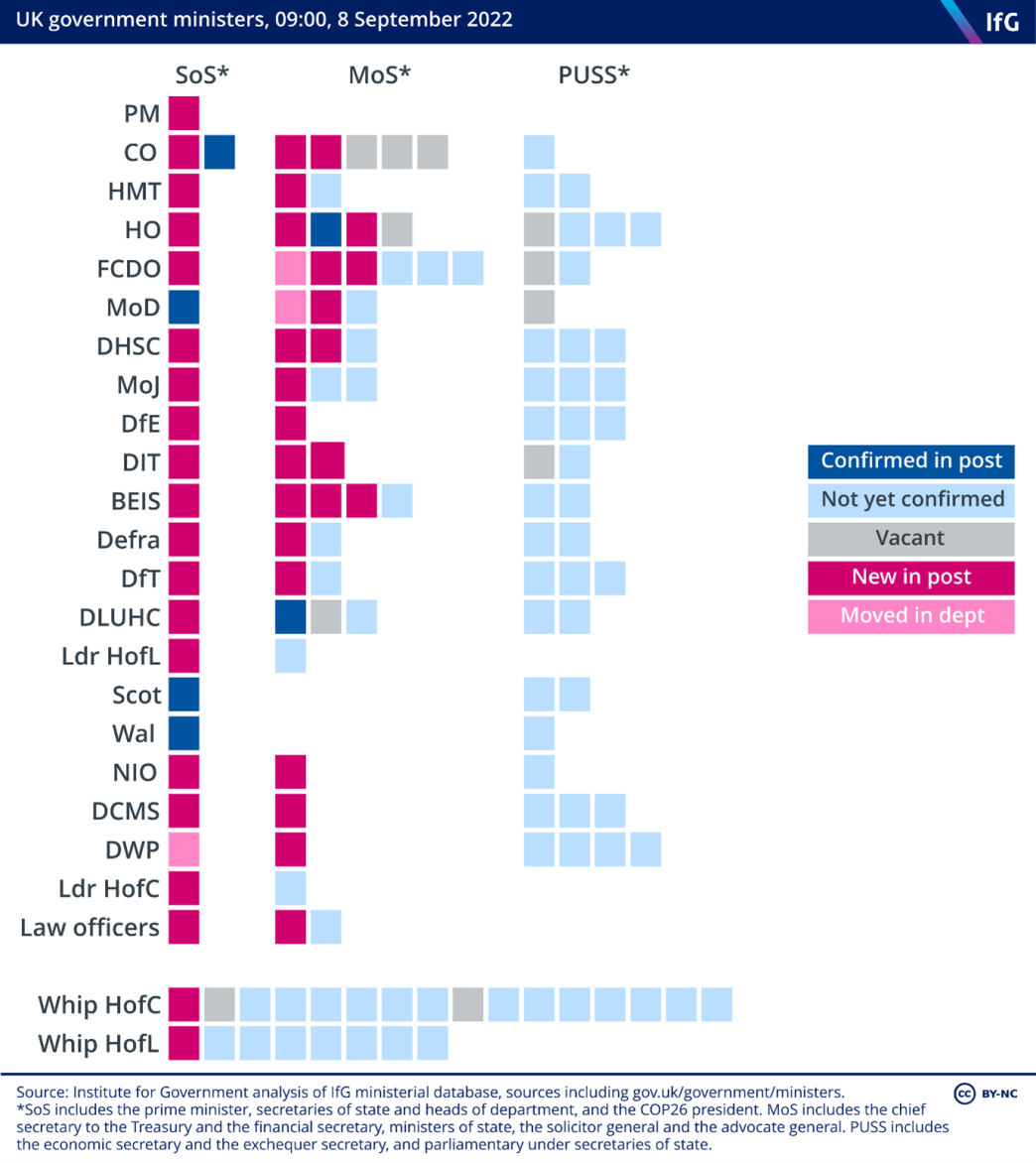
First 24 hours of Truss
7 September 2022, 17:18
Liz Truss has now been prime minister for 24 hours - she has appointed her cabinet and held the first meeting, spoken to Presidents Zelenskyy and Biden, attended the Commons for PMQs and met her backbenchers.
Her government currently has 44 ministers (we believe), when a government normally has around 120 or so - she has a long way to go on appointments.
The cabinet looks like this - most of them were Truss supporters from the beginning of the contest. You can see just how much change there has been, with lots of movement within cabinet and lots of new faces joining - only four out of 23 full cabinet positions did not change hands yesterday.
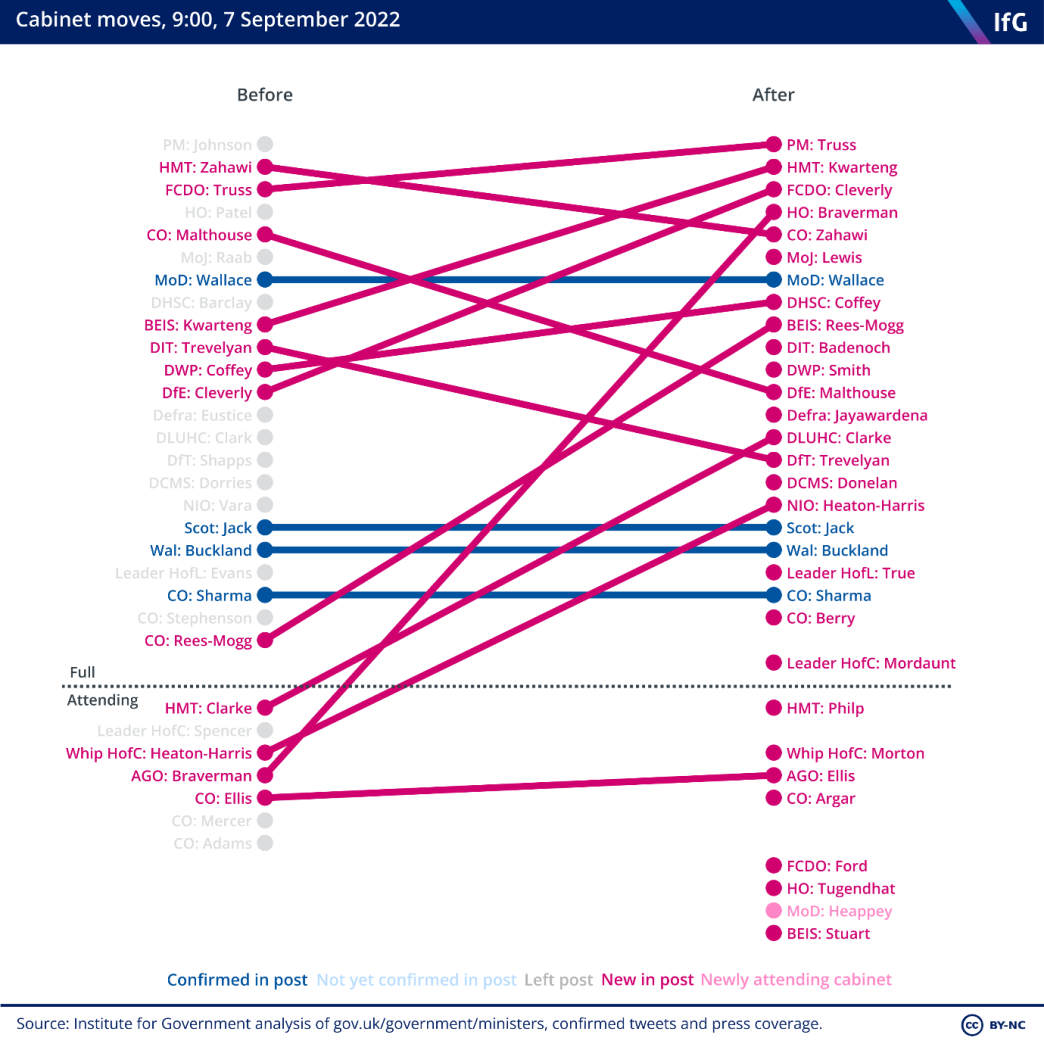
New national security adviser
7 September 2022, 17:00
There have been lots of rumours that a Truss government could herald some senior civil service moves. We now have the first one – Sir Stephen Lovegrove is stepping down as National Security Adviser to the PM. He will do a stopgap job as “Defence Industrial Adviser” until the end of the year and be replaced immediately by Sir Tim Barrow. Sir Tim worked with Truss at the FCDO as Second Permanent Secretary and is a former Ambassador to Russia and Ukraine. He was parachuted into the UK Representation in Brussels in early 2017 when Sir Ivan Rogers quit after negative briefings from the May team and managed to establish much better relations with both May and Johnson.
Lovegrove was the first of the six NSAs who was not a diplomat by profession, having been permanent secretary at the Department of Climate Change and Ministry of Defence. The post was created by David Cameron in 2010, to head the National Security Secretariat in the Cabinet Office when Cameron rebooted Gordon Brown’s rather moribund National Security Council. More detail on what it does and how it works in this report from 2014.
No woman has ever been NSA.
How many of the cabinet supported Truss?
7 September 2022, 16:54
Only one of Truss's cabinet attendees has consistently supported her main opponent in the leadership contest, Rishi Sunak. It will be an interesting question to see what proportion of her whole ministerial team were Trussites from the beginning!
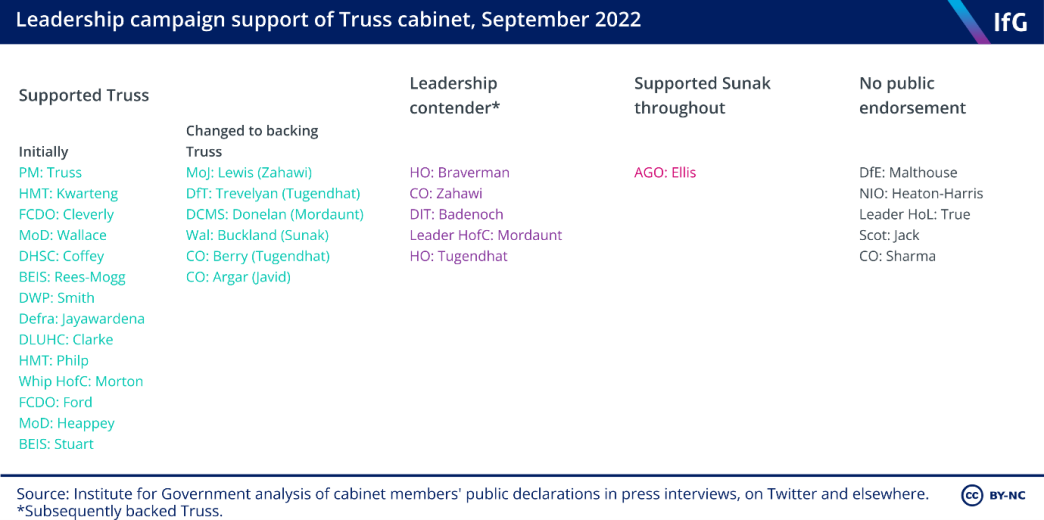
IfG podcast discusses new government
7 September 2022, 16:42
This week's episode of Inside Briefing, the podcast from the Institute for Government, discussed the appointment of the new PM and what she'll be dealing with. Our team were joined by Salma Shah, who worked as a spad for Sajid Javid in various departments, to talk through what it's like at the start of a new administration and what ministers and spads will be thinking about:
INSIDE BRIEFING with Institute for Government: In Liz we Truss? on Apple Podcasts
Lots of churn at minister of state levels
7 September 2022, 16:25
As more ministers of state are appointed, and Liz Truss meets her backbenchers for the first time as PM, it's becoming clear that she is making big changes to the government - there is lots of change at the minister of state rank, where ministers are responsible for specific projects and/or pieces of legislation.
Many of the new appointees have previously been in government, or have moved from one department to another, but even so it's a big job getting so many ministers up to speed at once:
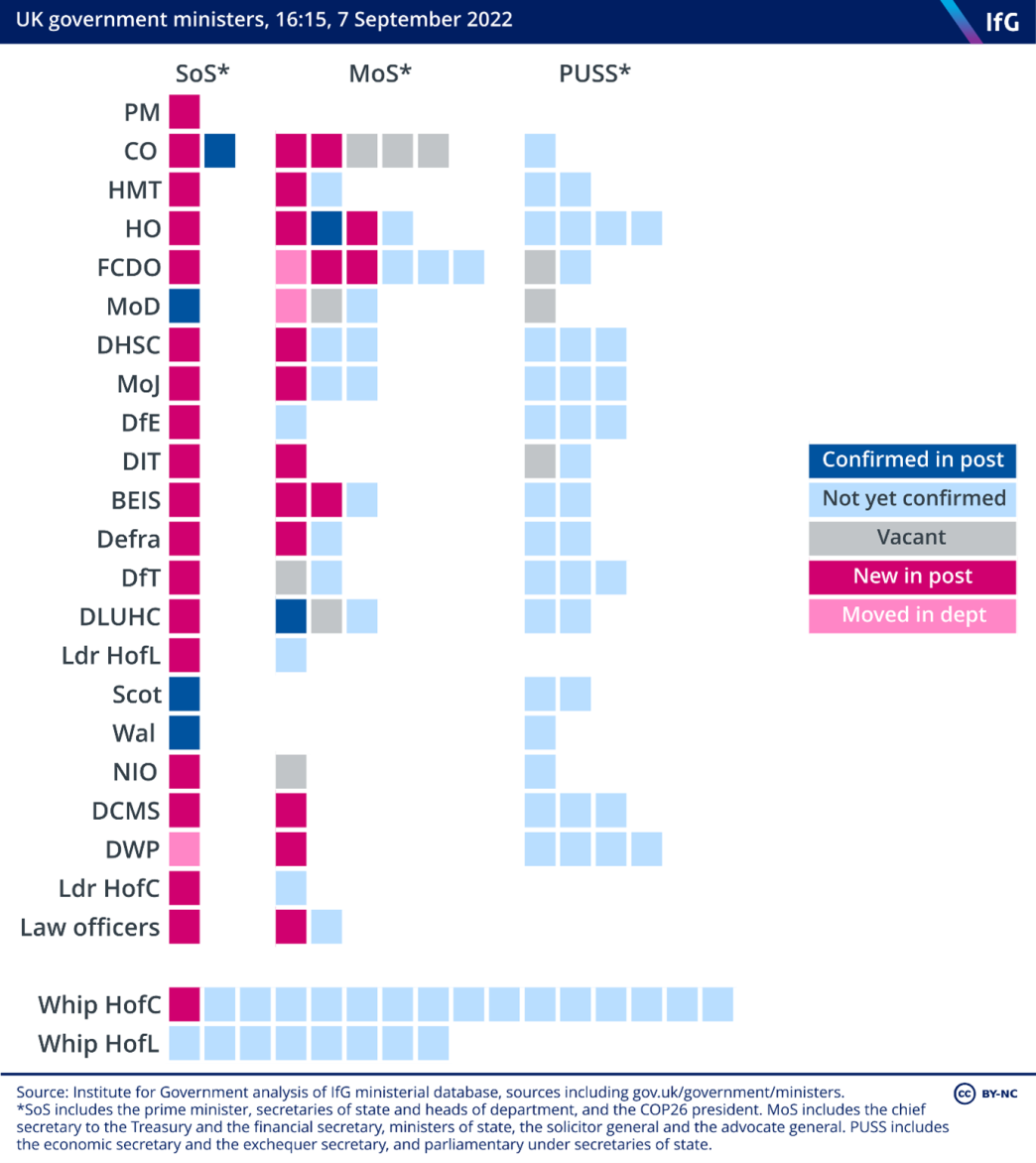
Robert Jenrick back in government
7 September 2022, 16:10
Robert Jenrick, formerly secretary of state at the Ministry of Housing, Communities and Local Government (now the Department for Levelling Up), is back in government as a minister of state at the Department of Health and Social Care.
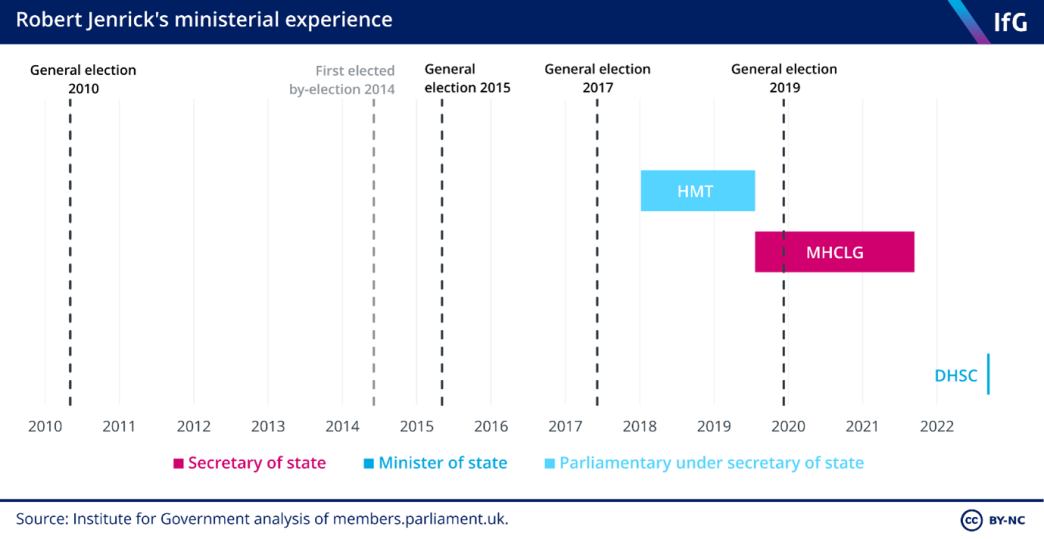
IfG senior fellow Jill Rutter wrote a blog in 2020 pointing out that accusations against Jenrick in his former capacity could damage the government - will his appointment be an issue for Truss?
The story has it all. The first “millennial” cabinet minister. A rich Tory donor. A lavish dinner with an unfortunate seating plan. Potential connections into the heart of Downing Street. In normal times, it would be leading the news bulletins and splashed across the front pages. These are not normal times, however, and that makes the minister in question, Robert Jenrick, a lucky man – for now.
The spad shuffle
7 September 2022, 16:02
Ministers aren't the only politicos nervously watching their phones this afternoon - special advisers, or spads, who support secretaries of state and other senior ministers, will also be finding out whether they've still got a job. Many will have left with the ministers who left yesterday, and others will be hoping to join government, either in No10 or working for newly-promoted secretaries of state - the PM has to approve each appointment herself.
The Institute's Cath Haddon has posted this thread about what it's like being a spad and why they're important to government.
Appointments starting again
7 September 2022, 16:02
After a busy morning of meeting her new cabinet and attending PMQs, Liz Truss has begun appointing ministers to her team again. She is now appointing ministers of state, the second rank in the ministerial team - many of her appointments have previously served in the Johnson government.
With the appointments just announced, the ministerial team now looks like this:
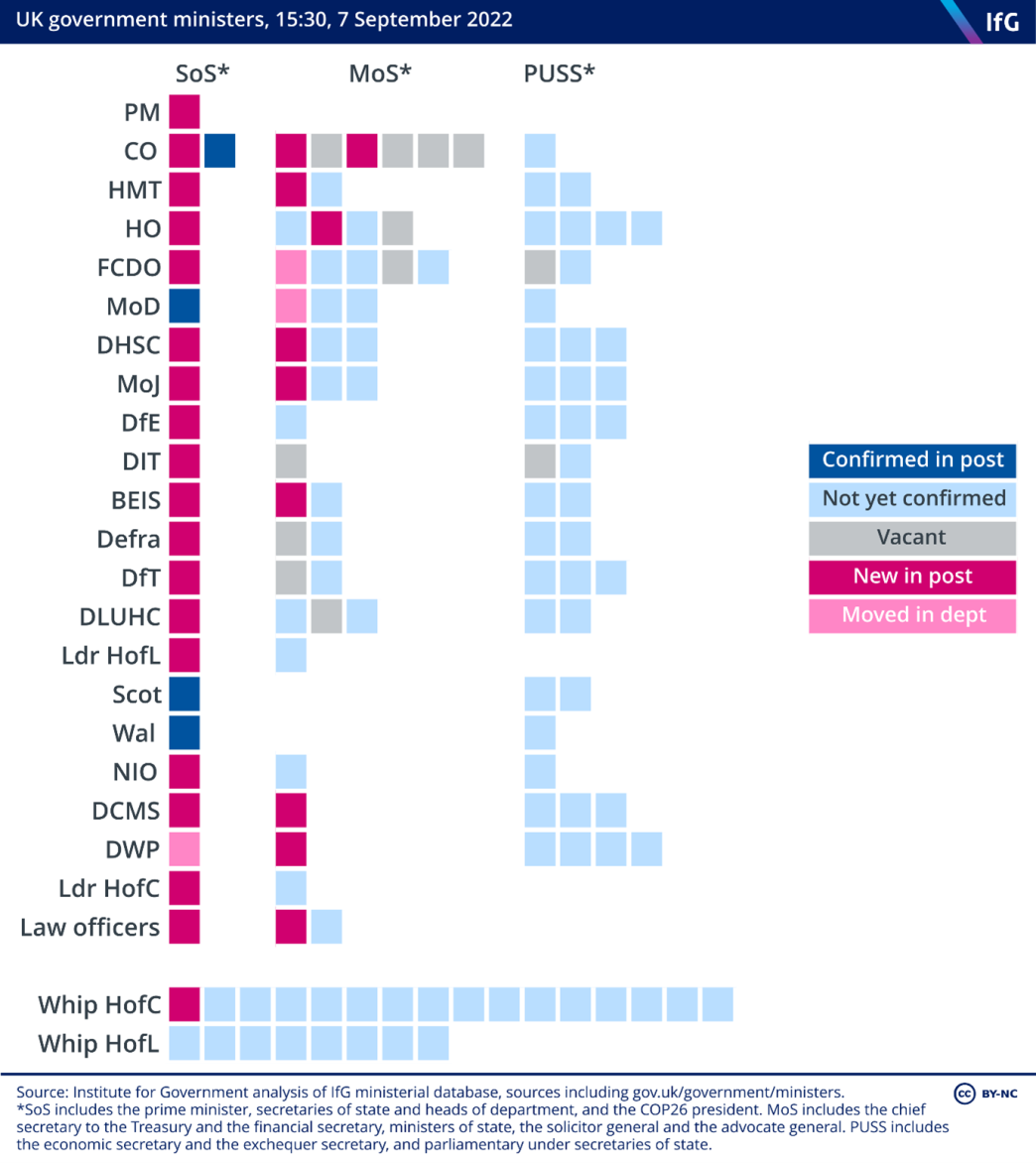
How does Truss's cabinet compare to her predecessors?
7 September 2022, 15:11
We have crunched the numbers and compared Truss's new cabinet to those of her recent predecessors...
Truss's cabinet, with 31 attendees in total, is one of the bigger teams of recent years - beaten only by Johnson's first cabinet and Cameron's at the end of the coalition. Larger cabinets tend to be less wieldy and less good at decision-making - though of course there's a question whether cabinet actually makes many decisions at all.
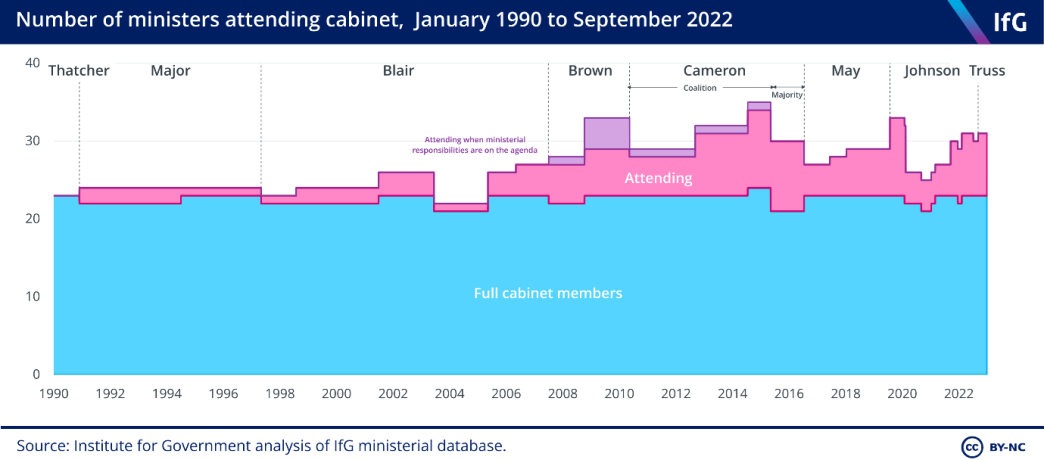
Truss is also the first prime minister to have no MPs in her cabinet who were elected before 2005. Unsurprisingly, she has also increased the proportion of MPs from the 2015 and 2017 intakes, as she brings in newer MPs - but there are as yet no cabinet members who were first elected in 2019. MPs first elected in 2010 - when Truss first entered the Commons - make up a smaller proportion of cabinet than under May and Johnson.
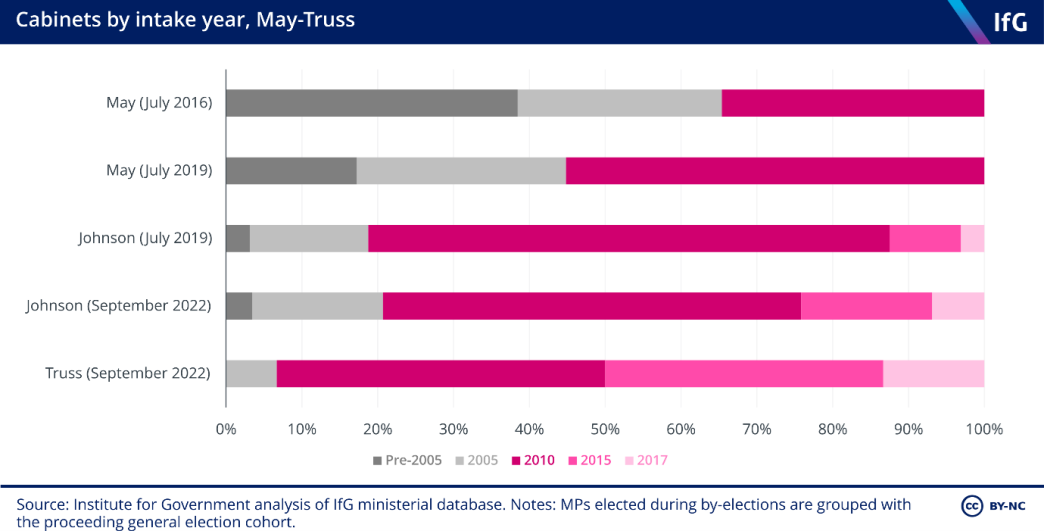
Truss has also increased the proportion of women attending her cabinet, with the proportion of full members and those attending who are women reaching 32%, the highest proportion in recent years. However, the proportion of full members of cabinet who are women is lower than in Theresa May's first cabinet.
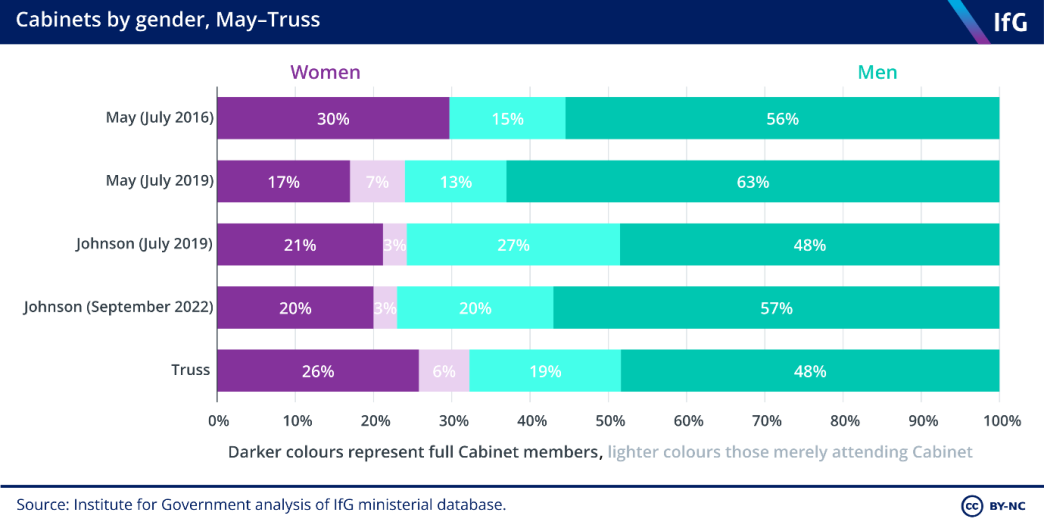
Truss's cabinet also has the highest proportion of privately educated ministers in recent years.
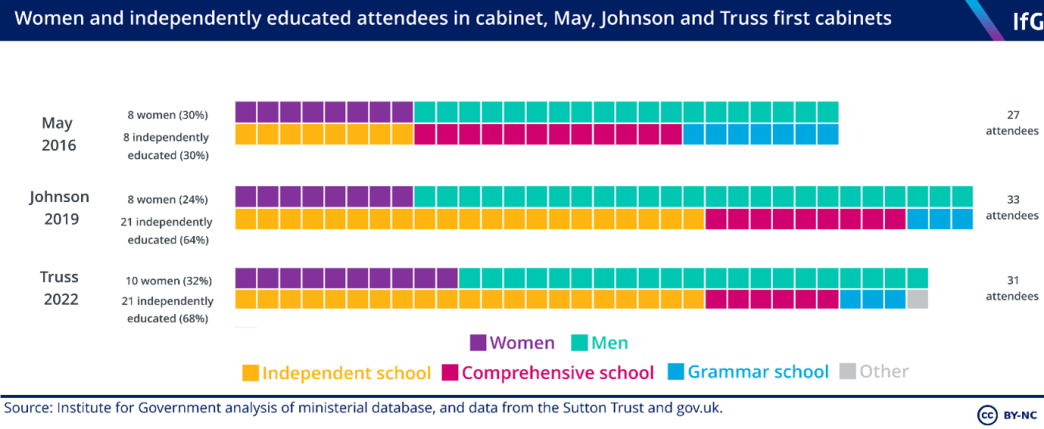
Truss makes changes to Johnson's legislative programme
7 September 2022, 14:37
Dr Alice Lilly, senior researcher at the IfG, writes:
"It’s only the first full day of Truss’ tenure as PM, but already we’re starting to see changes from her predecessor’s legislative plans.
Yesterday, the Data Protection and Digital Information Bill was pulled before its scheduled second reading in the Commons—with the (now former) Leader of the House Mark Spencer explaining that “to allow ministers to consider the legislation further”. The bill was only introduced just before summer recess, and the timetable for its passage is now unclear.
Then, today, it’s been reported that the government is also going to shelve the British Bill of Rights that Dominic Raab introduced while Justice Secretary—and which was due for debate next week.
It’s not surprising that Truss may want to review or change plans inherited from her predecessor— she will have her own priorities as PM, and may want to clear parliamentary space for them. But this does raise some questions about what the new PM’s legislative programme might look like.
The biggest thing we know so far is that Truss’ new energy package will be announced in the Commons on Thursday—but although Truss will get the debate underway, with new business secretary Jacob Rees-Mogg closing it, the announcement will be made through a general debate, not a ministerial statement. If that sounds technical, it is, but it has an important practical effect—it means that MPs will be able to debate and raise individual points, but ministers won’t be questioned on the details of the announcement in the way that they would be if making a statement."
Junior minister roles to be filled this afternoon
7 September 2022, 14:16
We understand that Truss will begin appointing junior ministers across government this afternoon. Will we see any former big names come back? Will any of those who resigned from Johnson's government - or were fired - make a return?
This is how the government looks currently - how many of those junior ministerial posts will change hands over the next few hours?
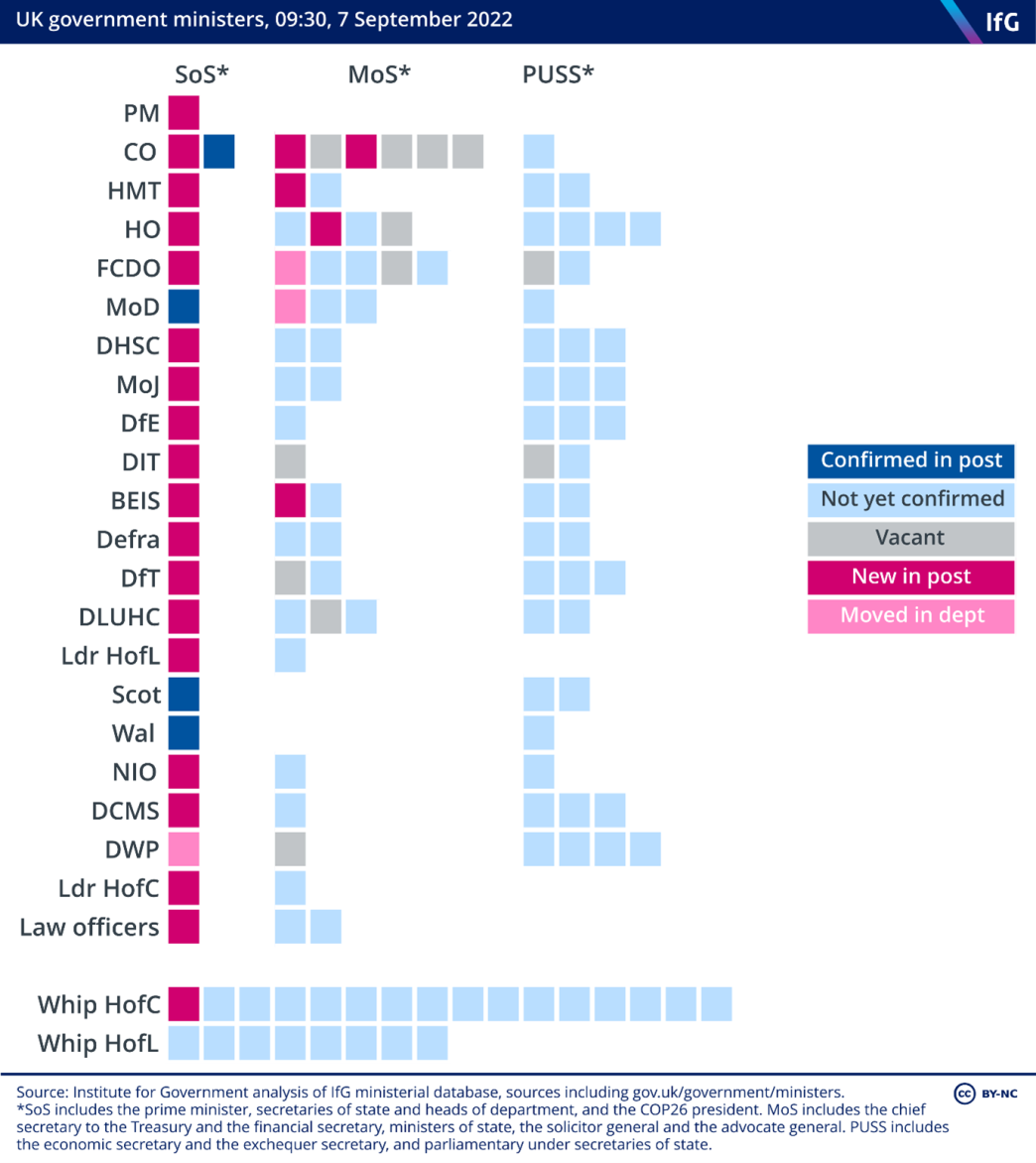
How will the new PM work with the devolved administrations?
7 September 2022, 11:58
Akash Paun, IfG Programme Director for devolution, has been speaking to ITV Borders about what the relationship between Truss and the devolved administrations in Edinburgh, Cardiff, and Belfast might be like. Watch the clip here.
Two of the three so-called 'territorial' secretaries of state have continued in post - Alister Jack in the Scotland Office and Robert Buckland in the Wales Office (though Buckland has only done that job since July). Chris Heaton-Harris is newly appointed in the Northern Ireland Office.
Other reshuffle alert...
7 September 2022, 11:51
Outside of Whitehall, there is another big managerial shakeup taking place in London this morning—Chelsea’s mens’ team have sacked their manager, Thomas Tuchel, who only took over at the club in January 2021.
As a sign of how much movement there has been inside government recently, worth noting that in Tuchel’s seventeen months as Chelsea boss, the UK had five education secretaries (Williamson, Zahawi, Donelan, Cleverly, and Malthouse), three culture secretaries (Dowden, Dorries, and Donelan), three chancellors (Sunak, Zahawi, and Kwarteng) and two prime ministers (Johnson and Truss). Or for another way of looking at it, the UK replaced its education secretary once for every twenty matches of the 100 matches that Tuchel was in charge for.
What do we know about the new faces in cabinet?
7 September 2022, 11:30
There are four new secretaries of state, and a new chief whip, who haven't been members of the cabinet before. Chloe Smith was elected in a by-election in 2009, and held various ministerial jobs in the coalition, before being brought back into government after the 2017 election. She now heads DWP, responsible for universal credit, other benefits and pensions, a department she has worked in for a year already.
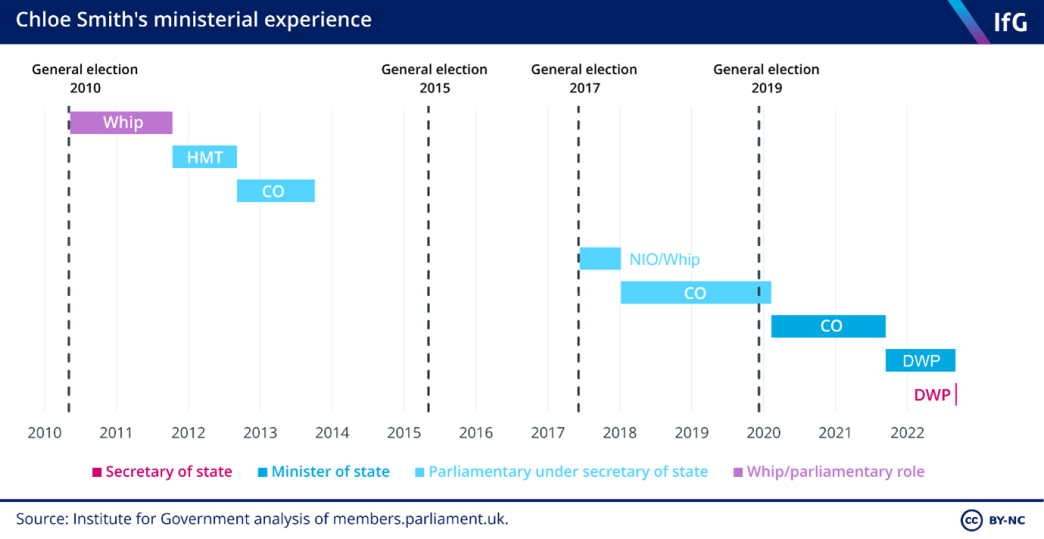
There are three new cabinet attendees who were first elected in 2015, when David Cameron led the Conservatives to form their first majority government in two decades. Ranil Jayawardena now heads Defra, having been a minister in the trade department for a couple of years. He has gone from parliamentary under secretary, the lowest rung on the ministerial ladder, to secretary of state in one go - a jump also made by one Liz Truss, whose first cabinet job was in... Defra! Will Jayawardena follow her path to the top?
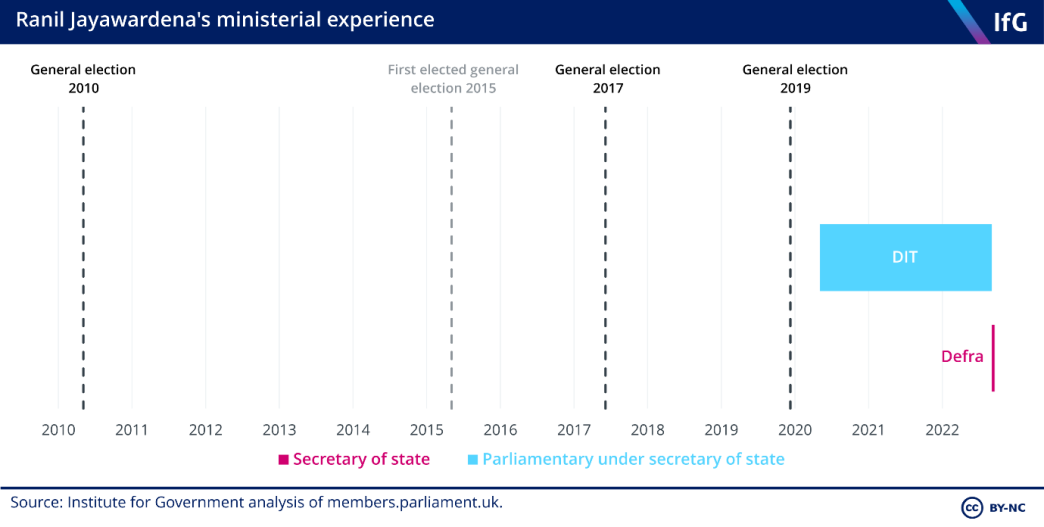
Also first elected in 2015, Michelle Donelan is now the secretary of state for digital, culture, media and sport. Technically Donelan has already been a secretary of state - she served as education secretary for around 36 hours in the summer, before resigning from Johnson's government.
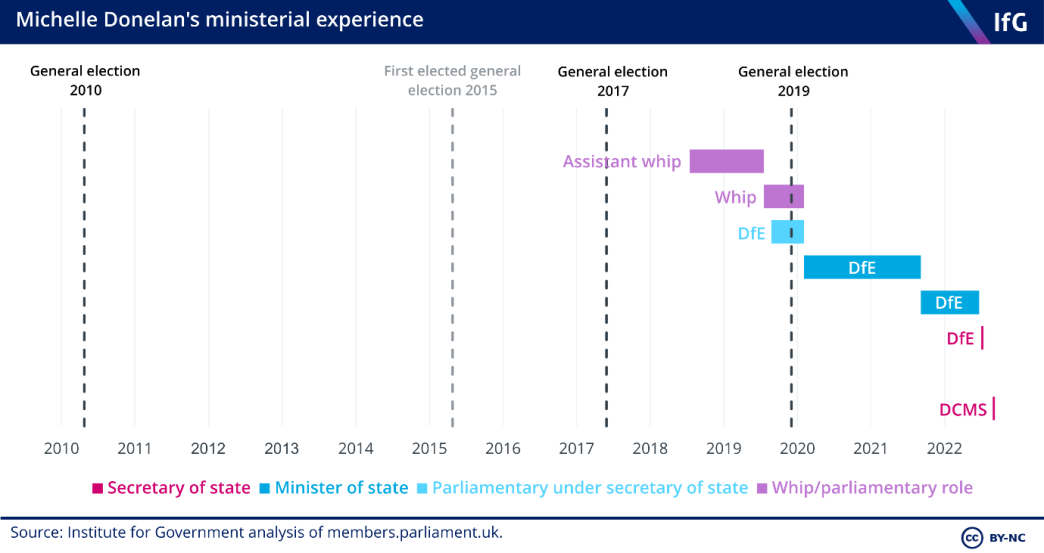
Wendy Morton is the first woman to be chief whip in a Conservative government - she was also elected in 2015, and has had ministerial jobs across a number of departments, as well as her time as a whip in Theresa May's government.
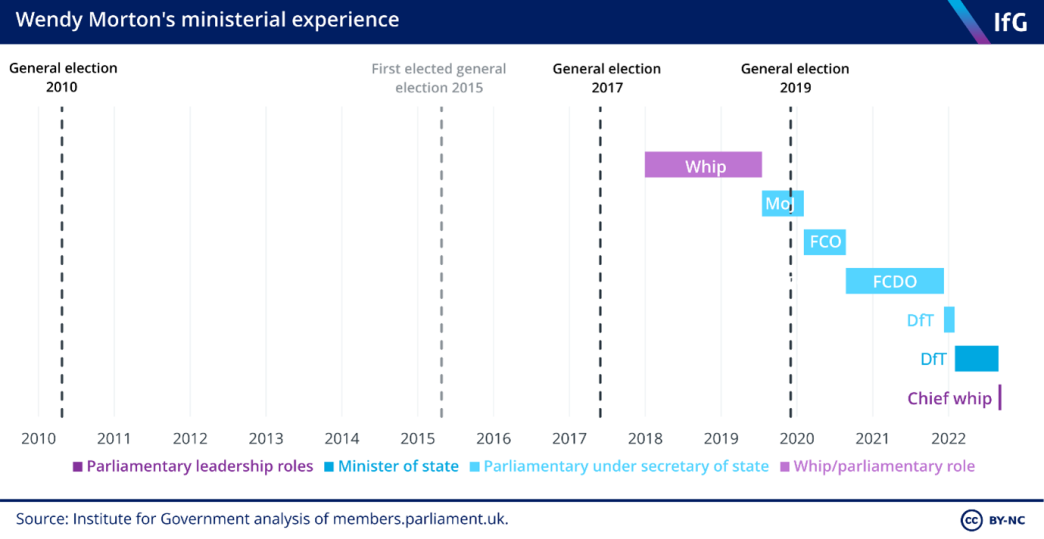
And finally, Kemi Badenoch - who also ran for leader - is the new secretary of state for international trade. First elected in 2017, Badenoch has worked in a number of departments too, and has worked closely with Truss as part of the women and equalities team. Badenoch resigned from Johnson's government in July as part of the mass resignations, but it is no surprise that she is back so quickly with a place at the top table.
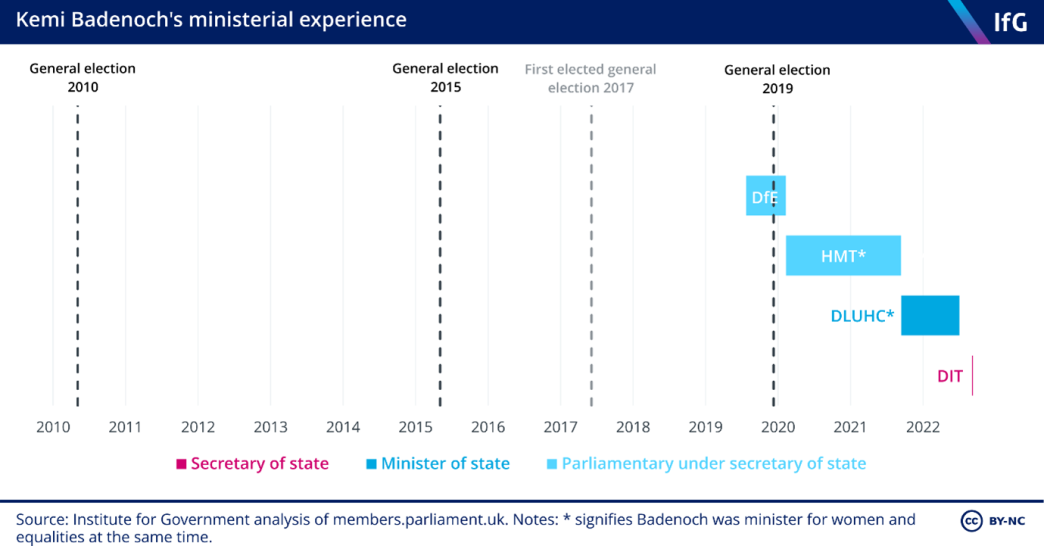
Zahawi first man to do women and equalities job
7 September 2022, 10:53
Nadhim Zahawi was appointed chancellor of the Duchy of Lancaster and minister for women and equalities. The latter role is always attached to a different cabinet post - nobody does it as a full-time job. However, in the past, a woman has always held at least the brief for women - Truss has broken with that convention, according to reports, by appointing Zahawi to both parts of the role. 4 https://twitter.com/tamcohen/status/1567423000290463746?ref_src=twsrc%5Etfw%7Ctwcamp%5Etweetembed%7Ctwterm%5E1567423000290463746%7Ctwgr%5Ec5dd6da3d30…
Sajid Javid held the role previously alongside Nicky Morgan, but both parts have been held by women since then:
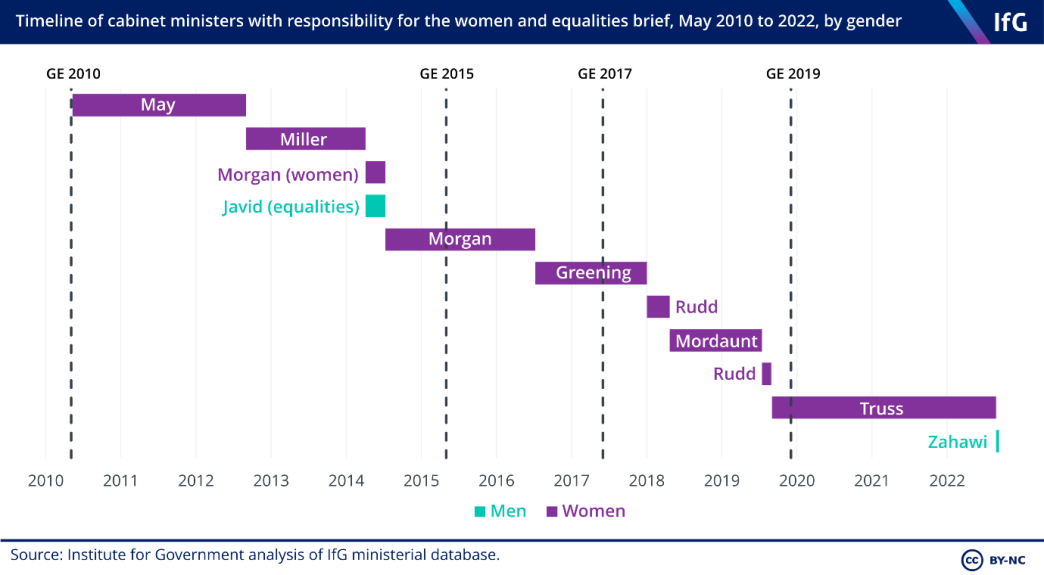
Nicky Morgan told the Institute that it was difficult to balance the women and equalities job with her main portfolio - Zahawi's role at the Cabinet Office is sure to keep him busy, so how will he manage both?
“There was a real danger that women and equalities would get squeezed out, because education is such a big portfolio and getting bigger”
How has the cabinet changed?
7 September 2022, 10:46
Now Liz Truss has appointed her full cabinet, we can see how much change there has been from Johnson's final team. Like several recent changes of PM within the same party, Truss has cleared out a lot of former cabinet ministers (although not as many as Johnson when he took over from May).
One of the key challenges Truss faces is maintaining party unity - with a lot of Johnson supporters on the backbenches, how easy will this be?
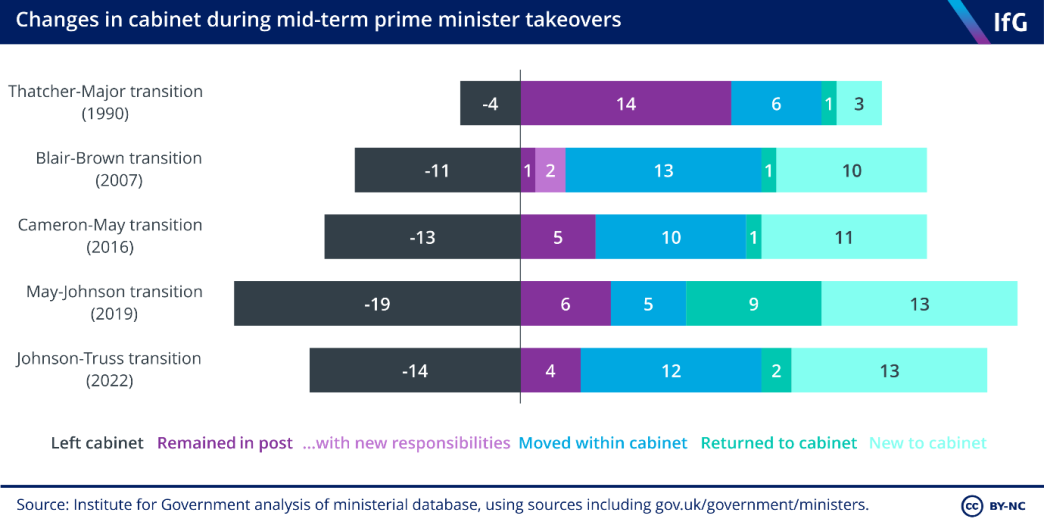
Her new team also represent different parts of the UK - a Norfolk MP herself, Truss has brought in several more MPs from the East of England, although she has lost a few too. George Eustice and Johnny Mercer's departures means there are no Cornwall or Devon MPs at the top table, and Alister Jack remains the only member of the cabinet representing a constituency outside England.
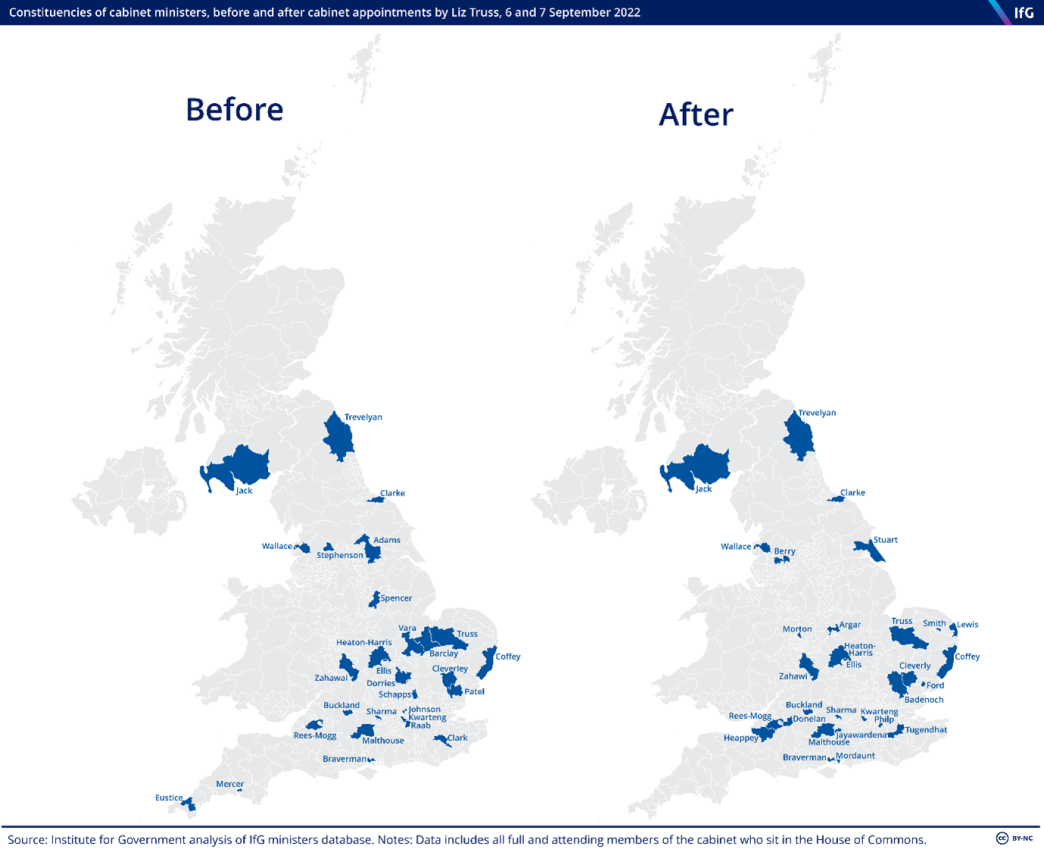
Rees-Mogg will need a lot of energy
7 September 2022, 10:12
Jacob Rees-Mogg was appointed business and energy secretary last night, putting him in charge of a major department for the first time. He is the 7th business secretary since 2010, and the sixth since the Conservatives won a majority in 2015 - meaning the government is averaging a new business secretary almost every year, a similar rate of turnover to the end of the last Labour government.
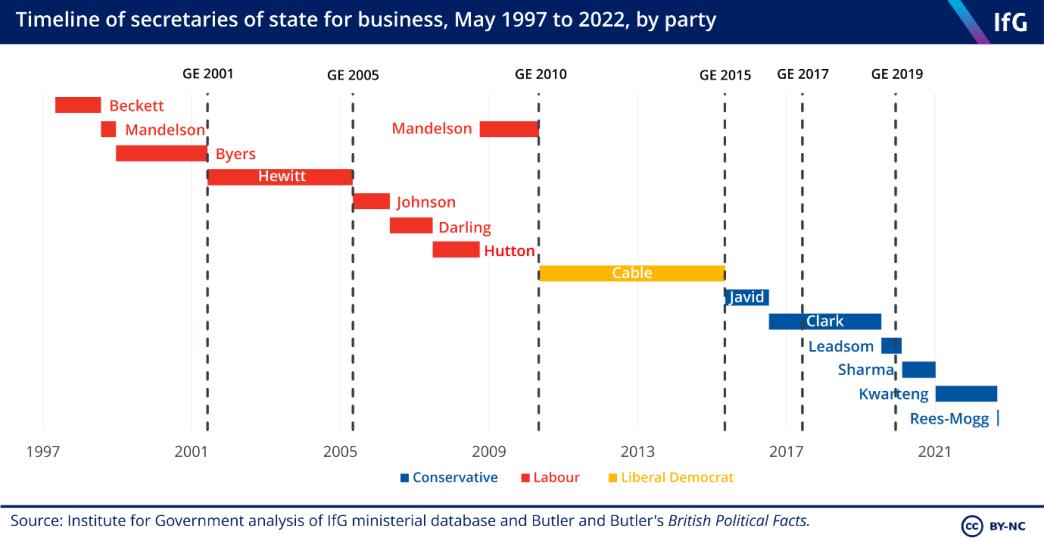
He will be tasked, alongside the new chancellor Kwasi Kwarteng, with leading the government's response to the energy bills crisis. Our economics team of Gemma Tetlow, Thomas Pope and Olly Bartrum had this advice for the new government on energy bills - and pointed out that it's not just a short term problem:
“Support is likely to be needed beyond this year. So far support is all focused on winter 2022/23, but current projections are for energy prices to be just as high, if not higher, next year. The new prime minister will need to be ready to provide further support again. Offsetting the same proportion of bills next year would cost nearly another £70bn. Given how long the crisis is expected to last, the government should also look at other measures to deal with the high energy bills, including investing in energy efficiency.”
Cabinet this morning
7 September 2022, 9:30
Liz Truss's first cabinet met this morning, and she will face questions later from Sir Keir Starmer and MPs in the Commons.
Overnight she completed appointments for her cabinet, meaning the top team in the government looks like this. There has been a lot of change, both with people moving jobs and people moving into cabinet for the first time, or back in after having resigned.
Truss has also changed who attends cabinet - she has made the leader of the House of Commons, Penny Mordaunt, a full cabinet role, and she has allowed other roles to attend cabinet, including a minister for development (Vicky Ford) and a minister for climate change (Graham Stuart).
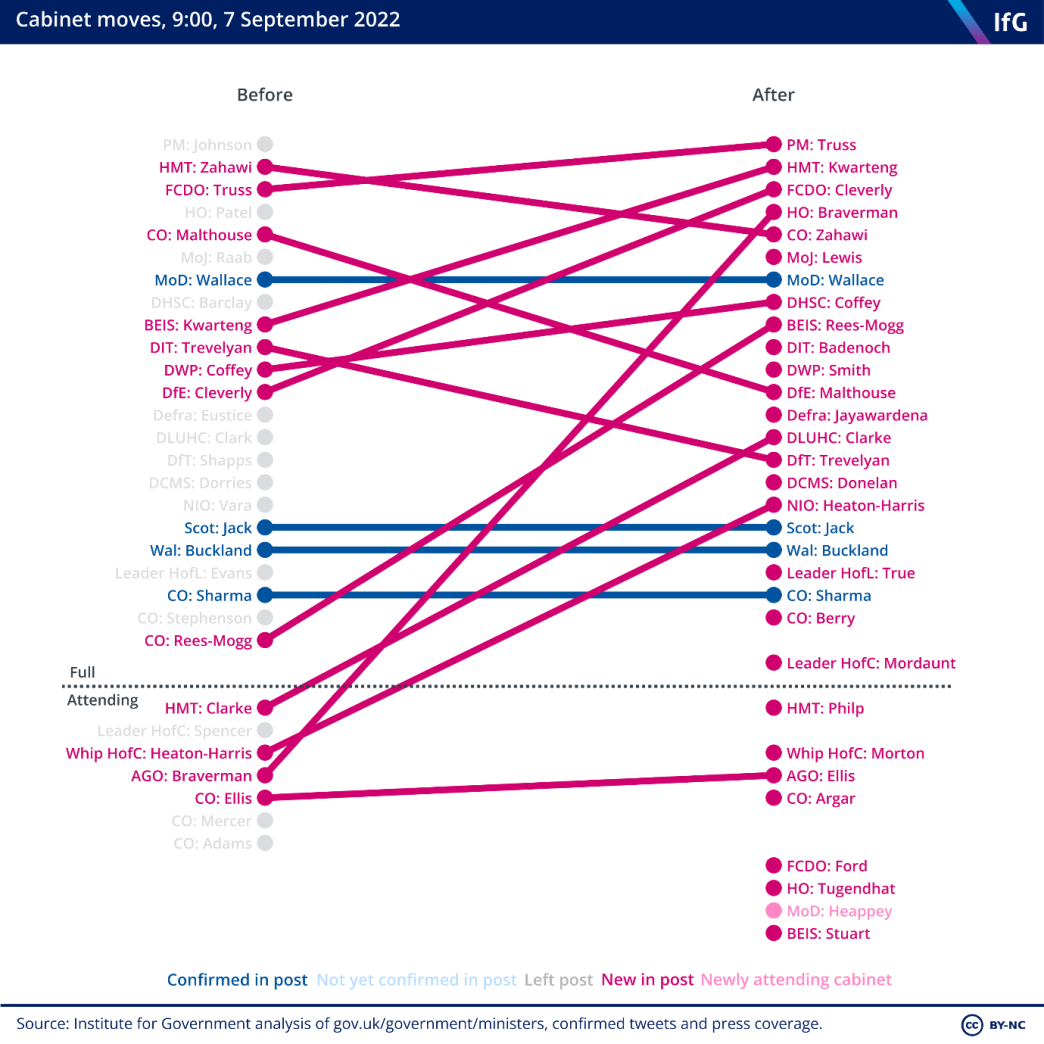
Today we are expecting many more of the junior ranks to be filled, when Truss has time to catch her breath in between phone calls with world leaders, meetings and of course PMQs. Currently the gaps in the government look like this, with the Cabinet Office in particular carrying a lot of vacancies after several ministers (Rees-Mogg, Ellis and True) moving elsewhere.
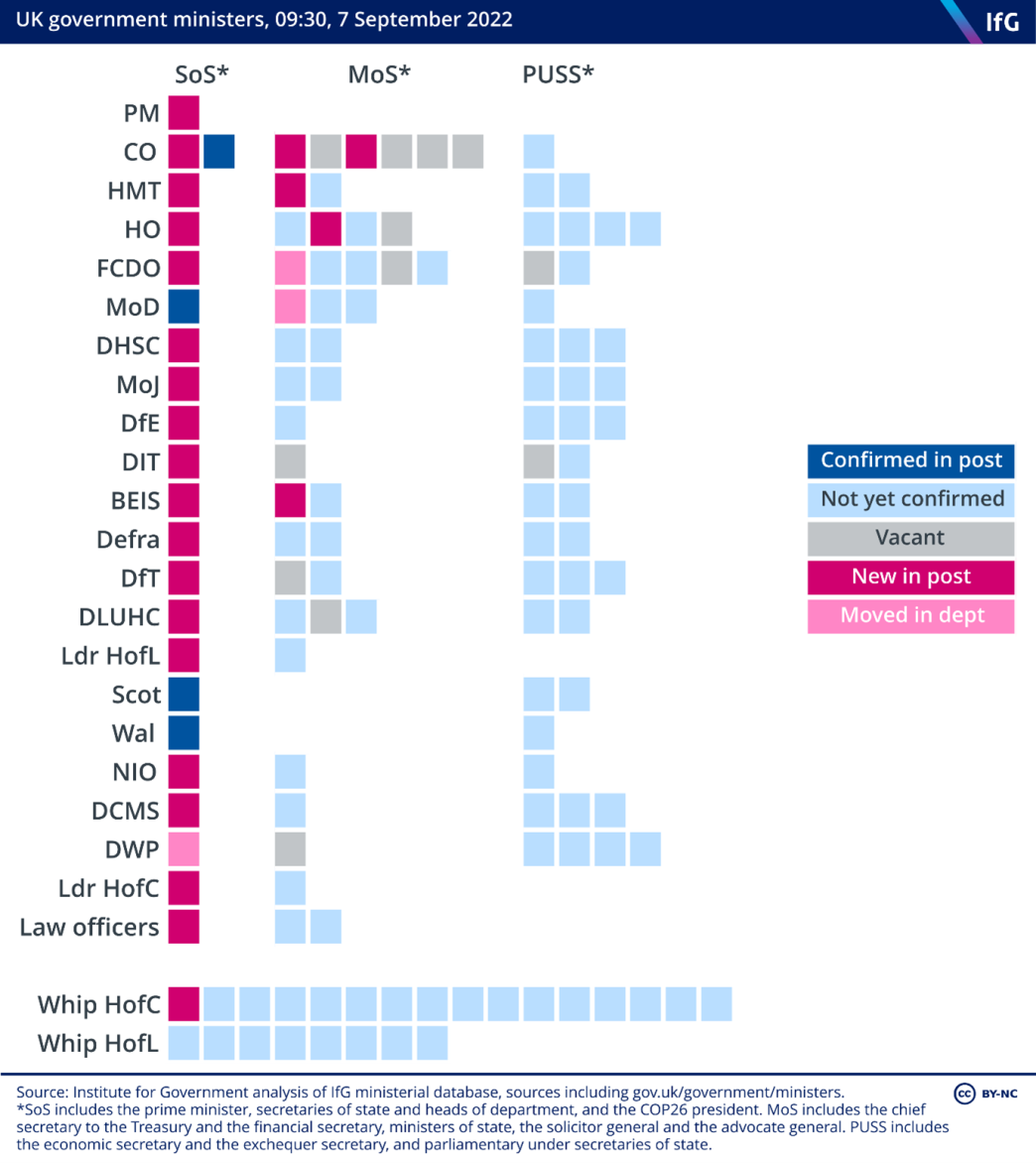
Reshuffle day one: Where do things stand?
6 September 2022, 20:54
It’s getting late here at IfG towers, and so we’re wrapping up today’s coverage of the formation of Liz Truss’s government. We’ll be back in the morning to cover Wednesday’s developments, when we’re likely to see plenty more ministerial appointments (and when Truss will have her first outing at PMQs). So where do things stand tonight – and what are we still waiting to find out?
The most notable thing so far is that this has been a wide-ranging reshuffle: the only cabinet positions that haven’t changed hands (so far) are secretary of state for defence, with Ben Wallace remaining in post, and Alok Sharma staying as COP26 president.
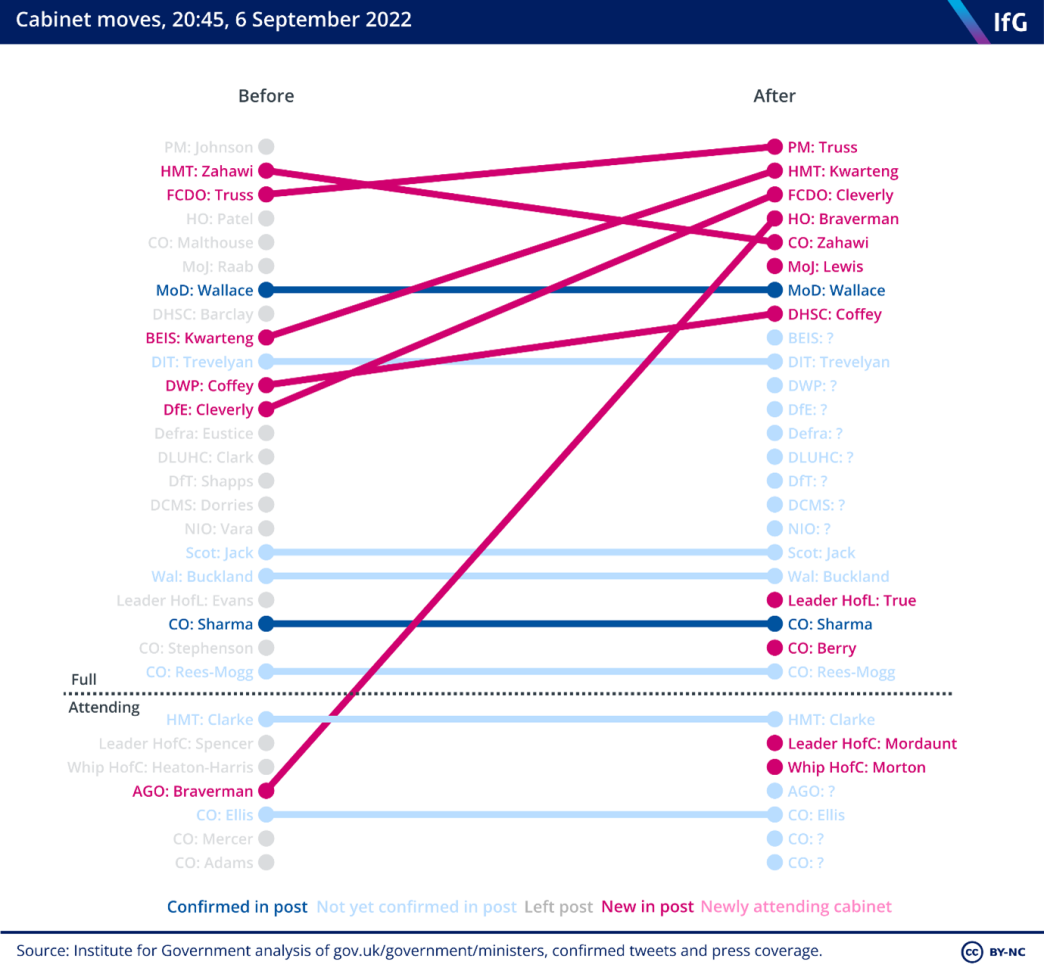
We’ve also seen several backers of Truss’s leadership rival, Rishi Sunak, leave the cabinet – including Dominic Raab and Grant Shapps. And Truss has appointed some of her most high-profile supporters to key roles – in particular Therese Coffey as deputy PM (and health secretary) and Kwasi Kwarteng as chancellor.
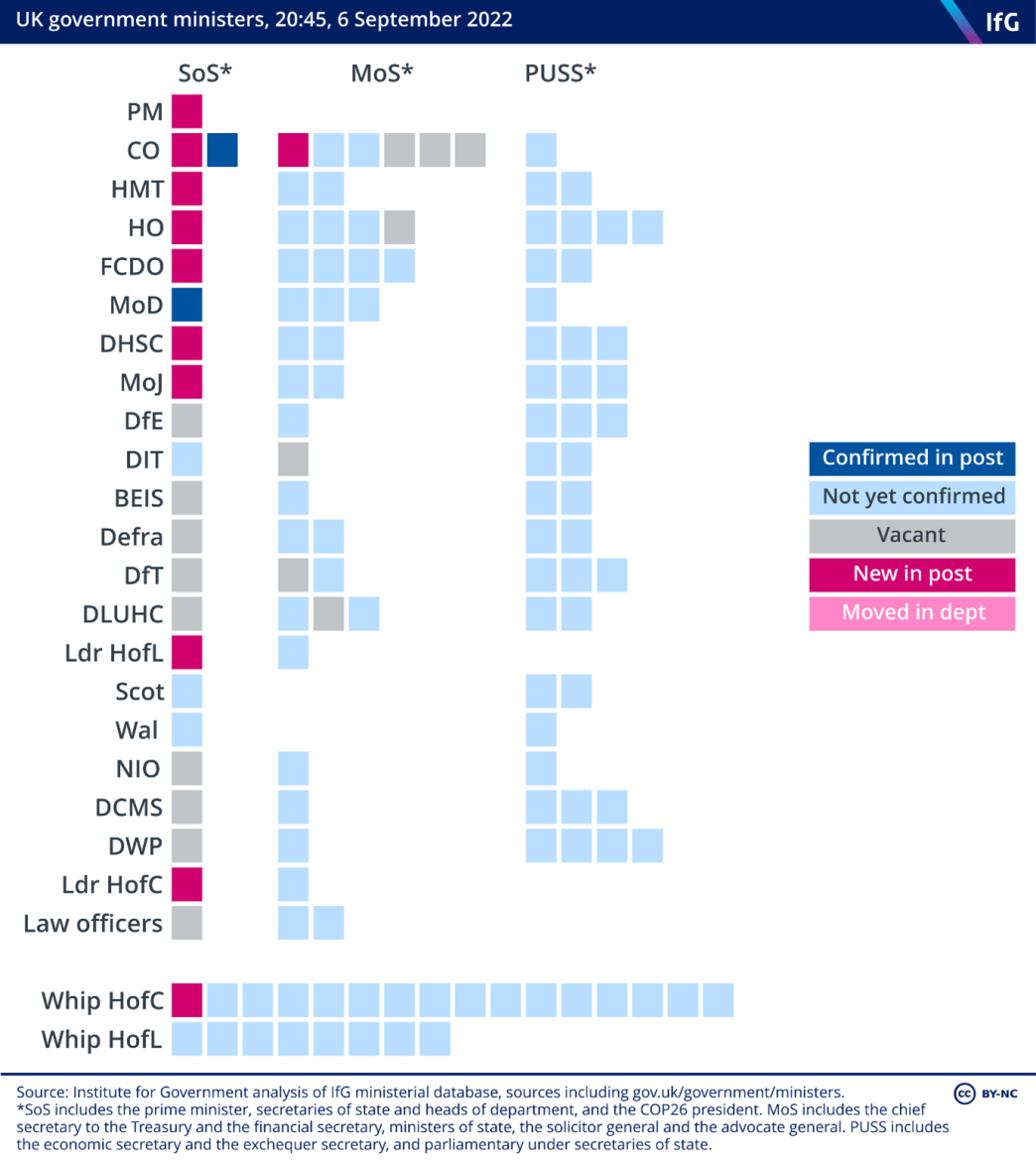
But there is still plenty left to look out for (some of these may have been answered overnight!)
- Who will take on the role of business secretary – a key role amid rapidly rising energy bills? There has been speculation in recent days that would go to Jacob Rees-Mogg, but this is yet to be announced – is this because of his reported scepticism over action on climate change?
- We’re also waiting on cabinet level-appointments at DWP, Education, Trade, Defra, DLUHC, DCMS, and DfT
- There has been a lot of chatter about the territorial offices – especially the Northern Ireland Office – though nothing has been officially confirmed
- How will these changes go down with Truss’ own party? We’ve already seen one very pointed letter from Johnny Mercer as he left government – will we see more signs that all is not harmonious?
- Are we going to see any machinery of government changes? Liz Truss has previously talked about appointing a ‘minister of the North’
Our acting director, Dr Hannah White, blogged about the issues facing the new PM:
"The first months of Liz Truss’s premiership will certainly be characterised by urgent challenges – backlogs in the NHS and other public services, strikes in the public and private sector, skyrocketing energy prices and inflation, and political crisis in Northern Ireland being among the most serious. But she is not the first prime minister to enter office in difficult circumstances and must avoid leading her new government in rolling crisis-management mode, which could lead to a focus on the symptoms – rather than the causes – of the problems the UK faces."
Leaders of both Houses changed
6 September 2022, 20:41
Penny Mordaunt has been appointed leader of the Commons and Lord True leader of the Lords. Mordaunt was one of Truss's rivals for the leadership, beating her in every stage of MP voting except the final one.
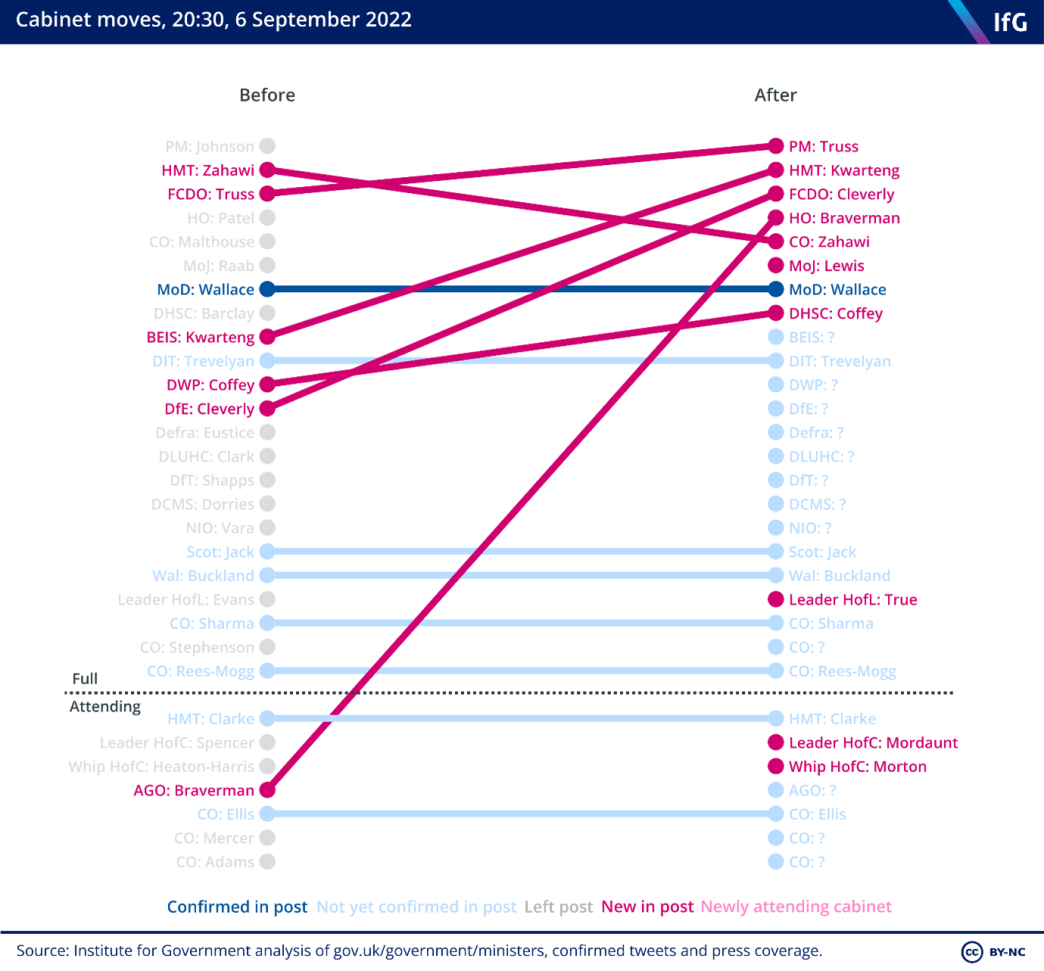
As leader of the Commons, Mordaunt is in charge of managing the government's business in the House. As noted earlier, even with a large majority, getting things done in the Commons is not always easy.
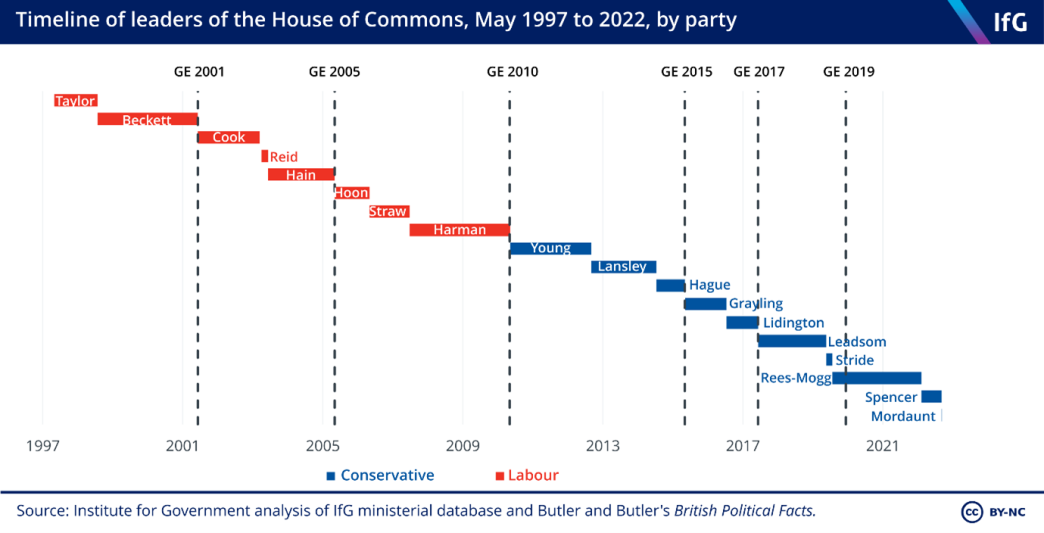
Lord True takes over from Baroness Evans, who was appointed by Theresa May and was the longest-serving minister in cabinet. True faces an increasingly assertive House of Lords, a job which Baroness Stowell said was very difficult:
"It’s a massive, massive job. I don’t think other Cabinet ministers really appreciate just how big a job it is. It’s very different than being Leader of the House of Commons."
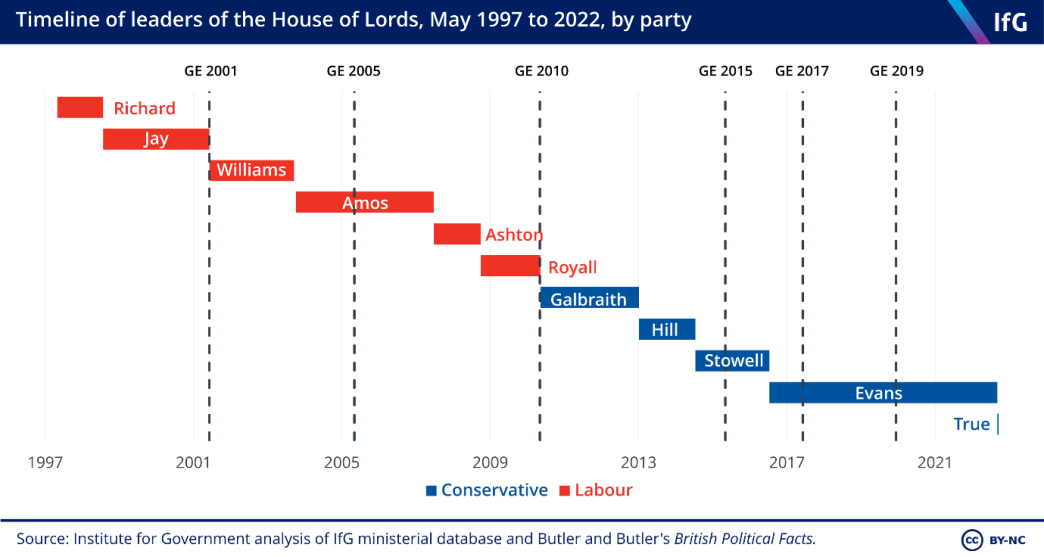
Zahawi: from chancellor to chancellor
6 September 2022, 20:22
Nadhim Zahawi, chancellor of the exchequer since July, has been appointed chancellor of the duchy of Lancaster. This wordy title is a senior minister at the Cabinet Office and is basically code for whatever the prime minister wants it to be - in recent years the CDL has been in charge of civil service reform, a key issue under Johnson. Will Truss make it such a big theme of her government? And what will she task Zahawi with sorting out?
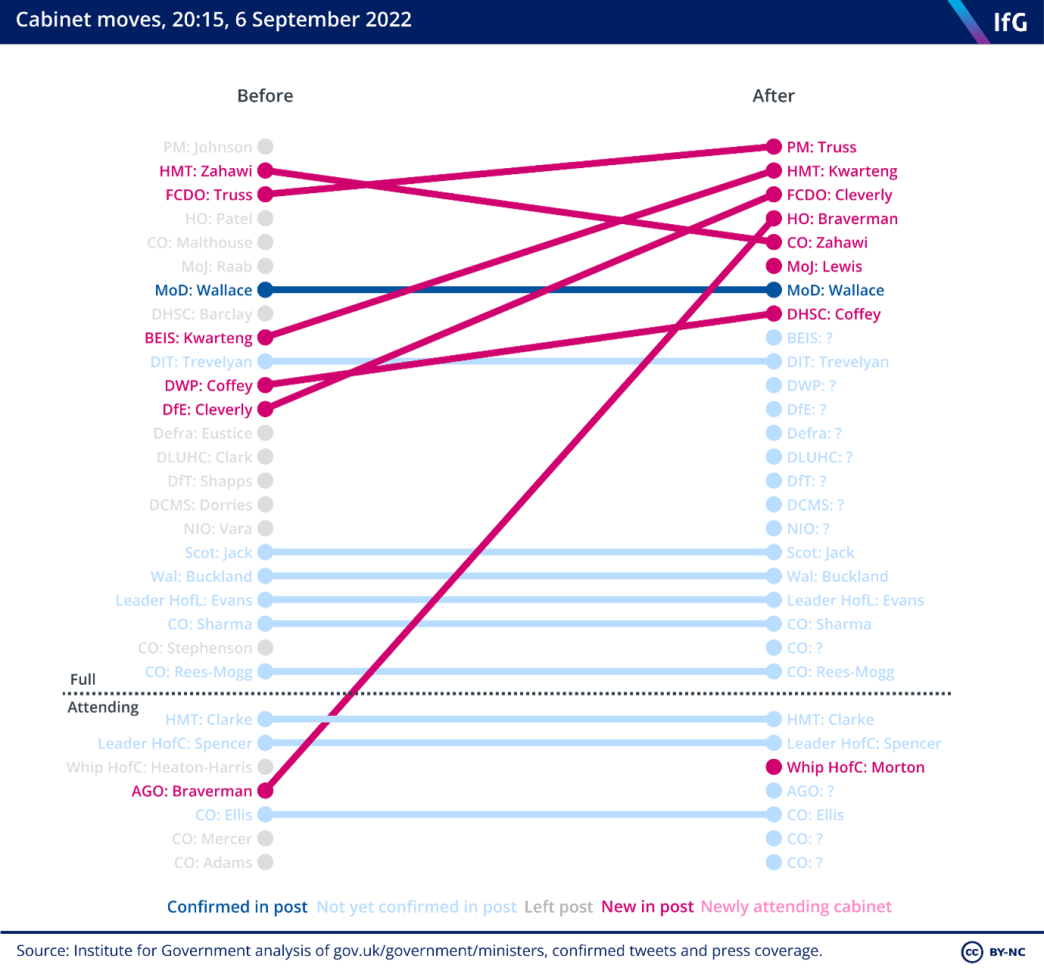
In recent years, the CDL has been a key confidante and ally of the prime minister - Michael Gove at the beginning of Johnson's premiership, Oliver Letwin under Cameron. Will Zahawi play the same role?
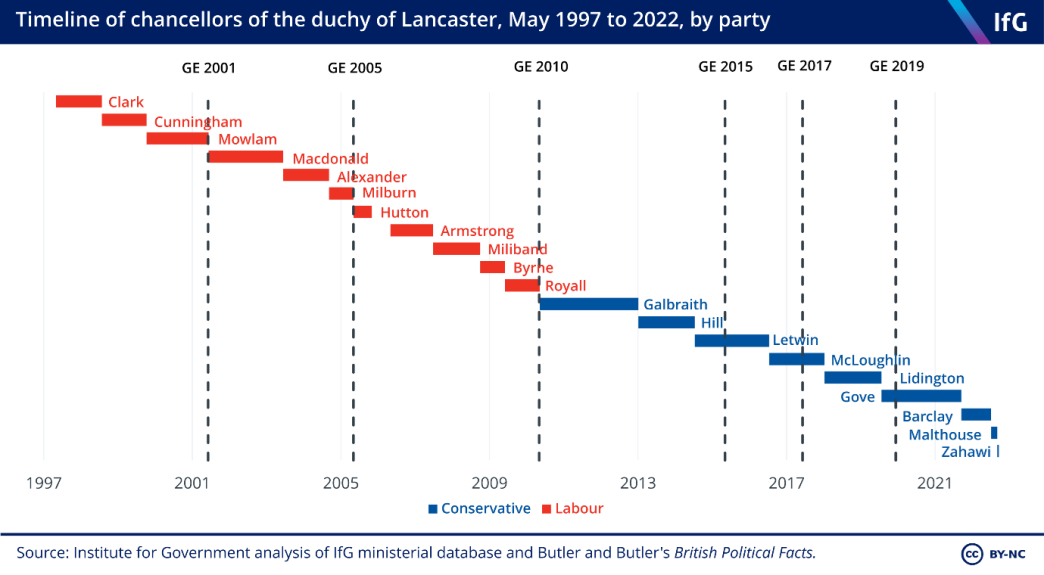
Wallace stays on at Defence, and Lewis moves to justice
6 September 2022, 20:04
Ben Wallace, who has played a key role in the UK's response to the war in Ukraine, is staying on at the Ministry of Defence. And Brandon Lewis, formerly Northern Ireland secretary until he resigned in July, has rejoined government to head up the Ministry of Justice.
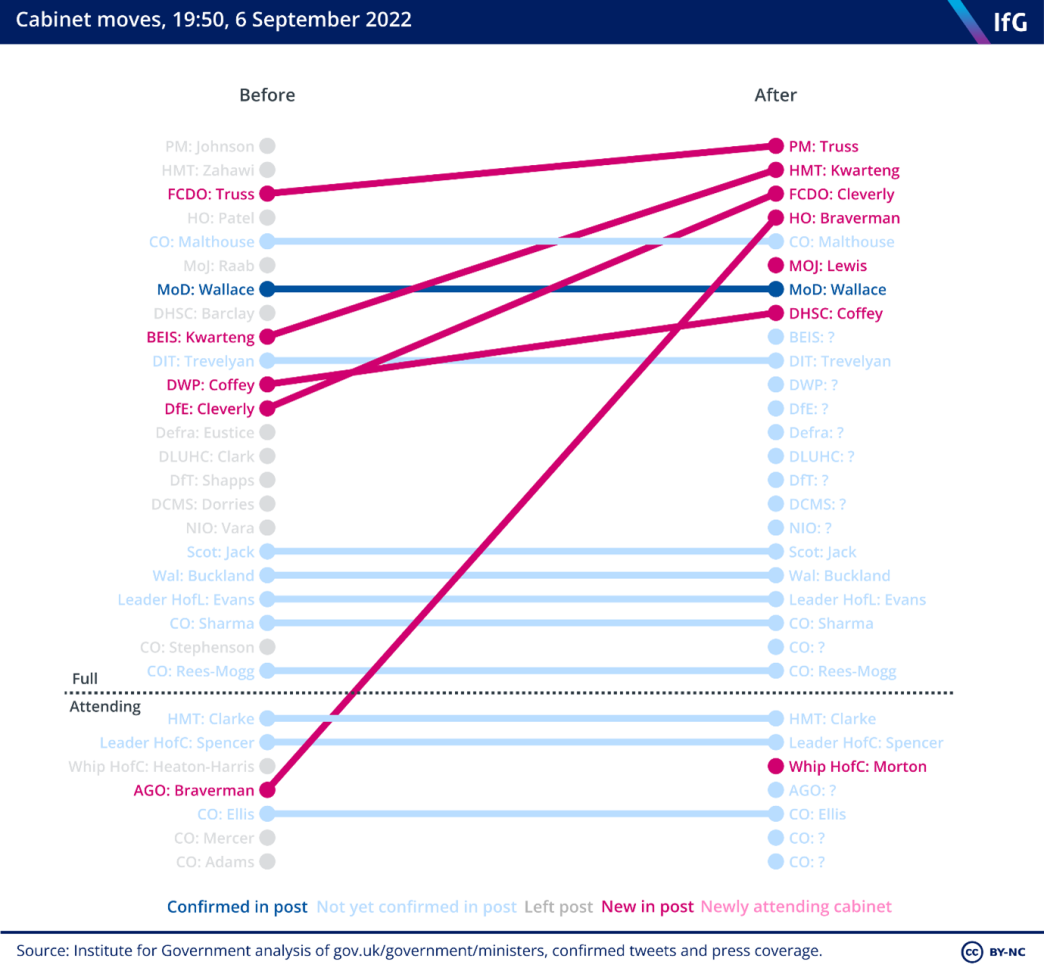
The ongoing war in Ukraine makes this a turbulent time for the Ministry of Defence, which may benefit from stability and an experienced pair of hands at the top of the department.
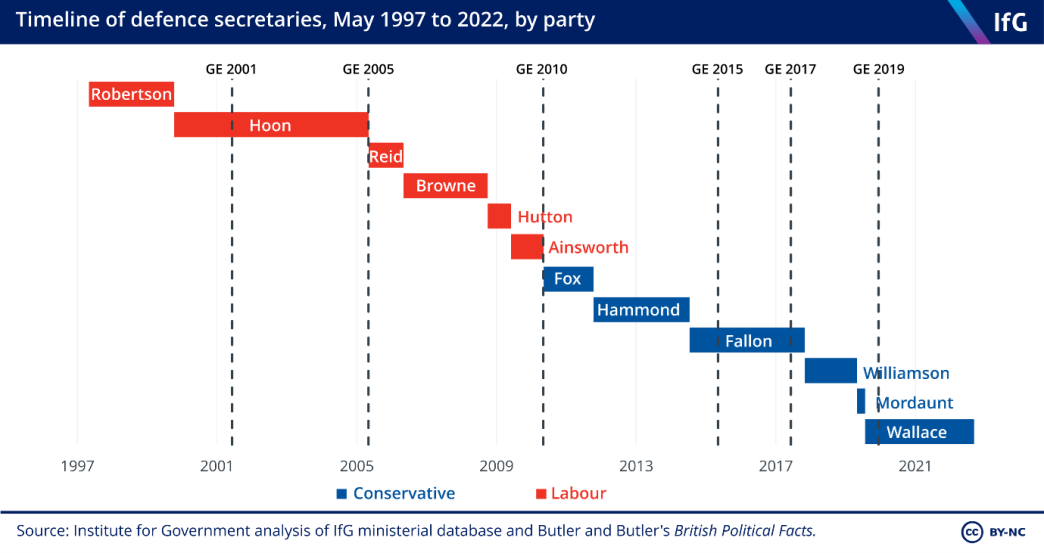
Wallace will have a bigger budget to work with than before – Truss plans to increase defence spending to 2.5% of GDP by 2026, and to 3% of GDP by the end of the decade. She has suggested she might review planned cuts of 10,000 armed personnel, even as she looks to reduce the size of the state elsewhere.
Keeping the defence secretary in post chimes with Truss’ stated intentions of maintaining strong diplomatic and military support for Ukraine, “following in the footsteps of Boris Johnson” as Ukraine’s “greatest friend”. Under Johnson, the UK was one of the largest suppliers of aid to Ukraine relative to GDP, a large share of which was military aid.
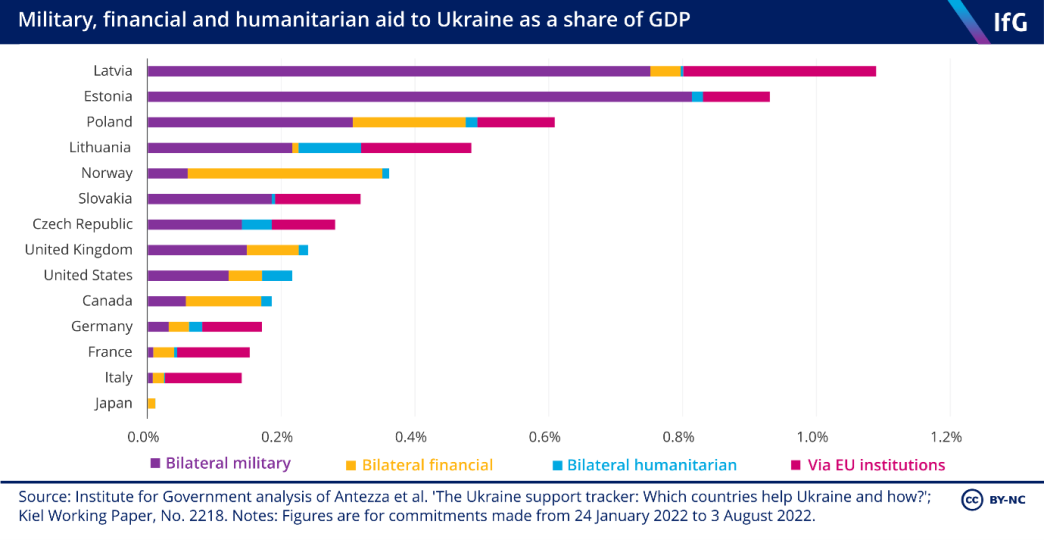
Lewis joins the Ministry of Justice at a time when the department is dealing with ongoing strikes by barristers and questions about backlogs in the courts.
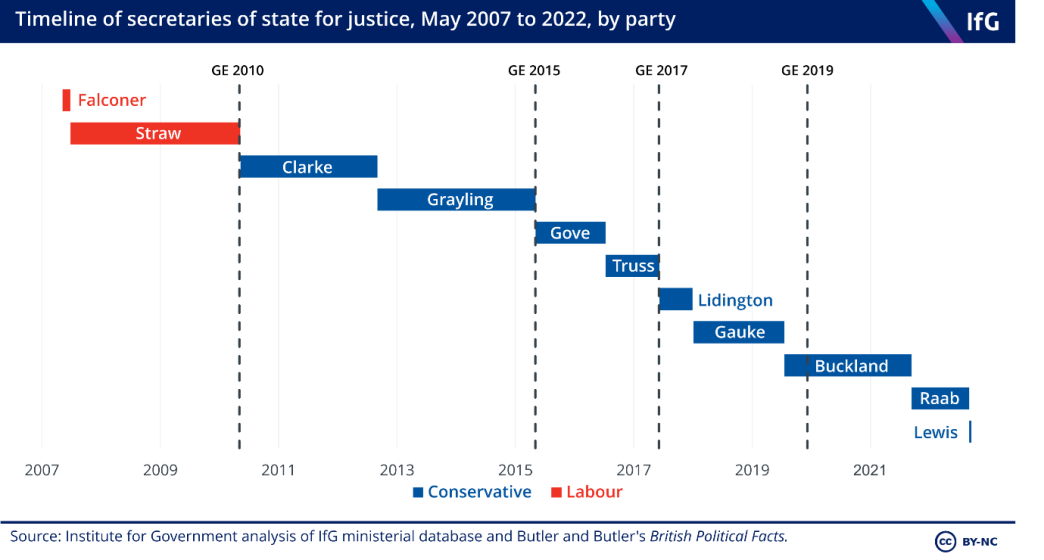
In June, former Secretary of State for Justice and Lord Chancellor Robert Buckland spoke to the IfG about the future of the role. Watch the event here.
First female Conservative chief whip
6 September 2022, 19:50
Wendy Morton has been appointed chief whip, the first Conservative woman to hold the job.
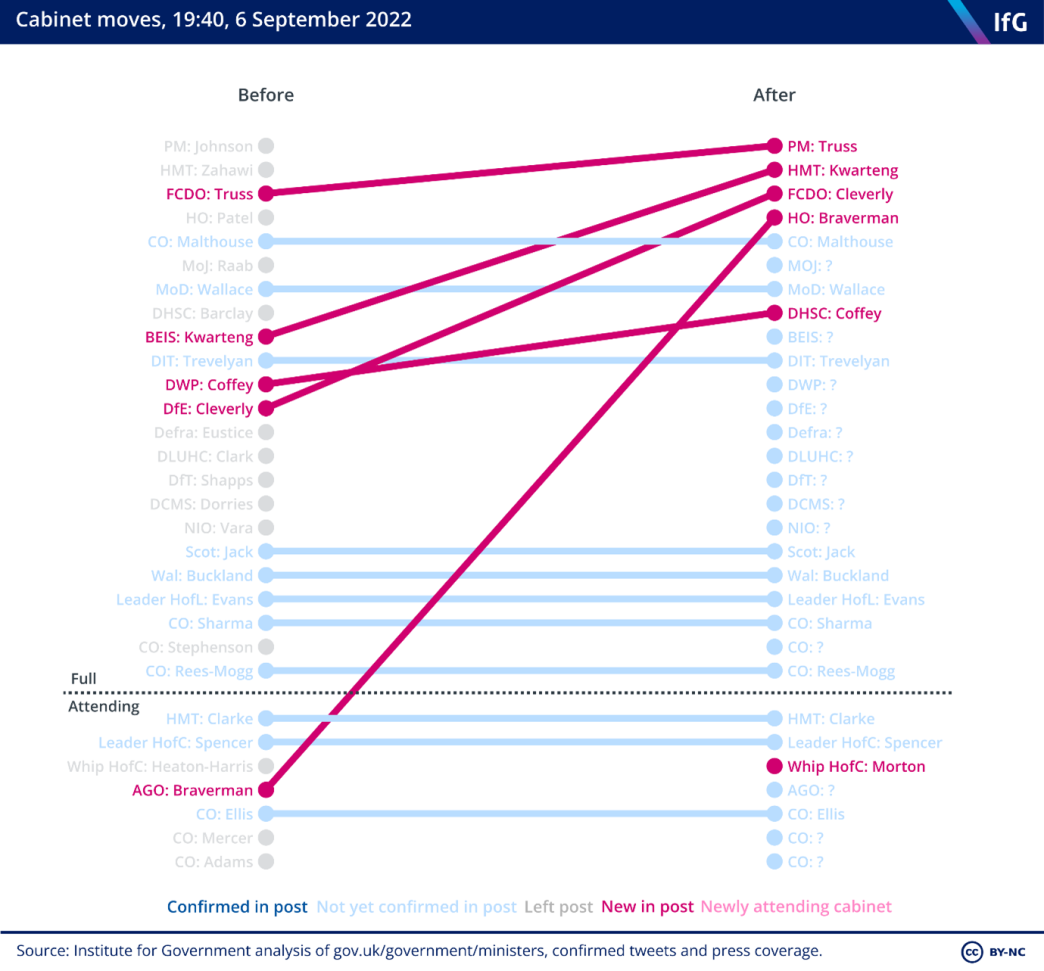
Labour has had female chief whips in the past:
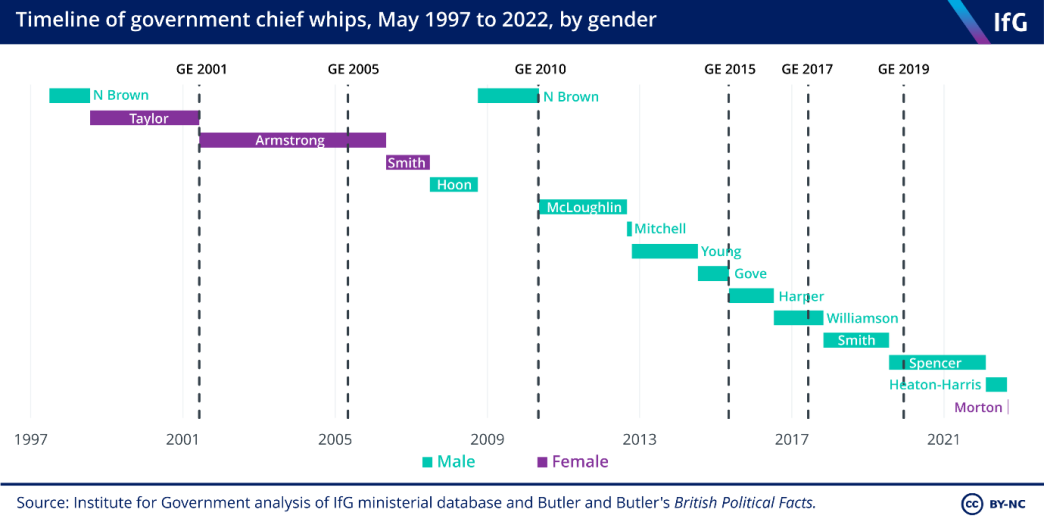
Morton has some experience in the Whips’ Office, having served as an assistant whip between 2018 and 2019. But Morton is unlikely to have an easy time. Although there may be some initial goodwill from Conservative MPs towards their new leader—and a desire for more unity than has been on display over the summer—we also know that Truss wasn’t the preferred candidate for leader among her own MPs (at least initially).
Under Truss’ predecessor, the government struggled with managing its own backbenchers—over 40% of Conservative MPs have rebelled at least once since the 2019 election. Combine that with the difficult in-tray that Truss and her team face in the coming weeks and months—and a load of high-profile ex-ministers (and prime ministers) now on the backbenchers—and it adds up to a difficult time for the new Chief. The big question Morton is faces is whether they can repair relations between Downing Street and Conservative MPs—as well as ensure the Conservatives’ large majority on paper translates into smooth legislating.
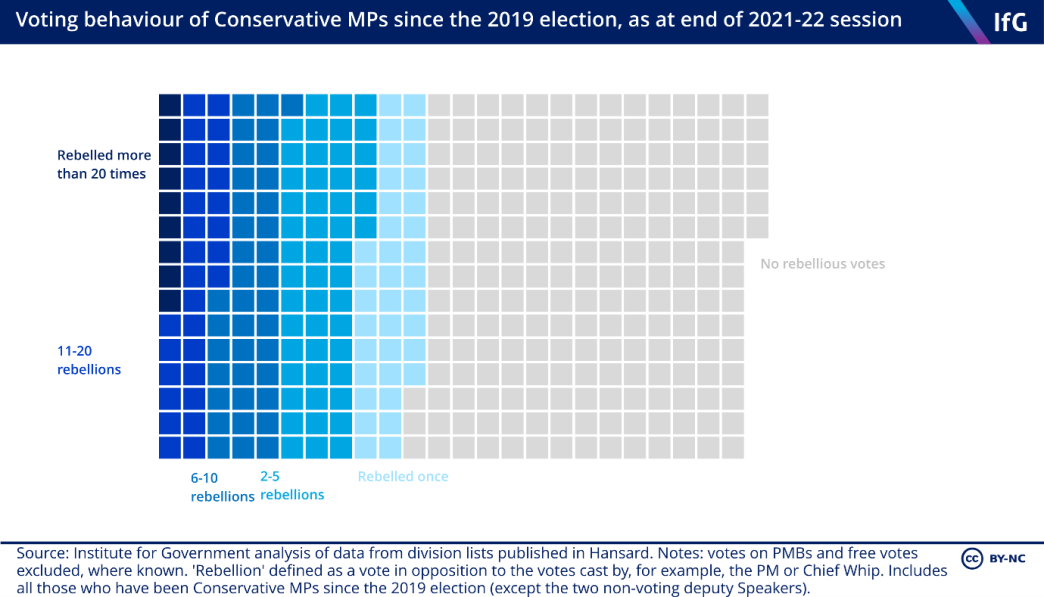
Suella Braverman is the new home secretary
6 September 2022, 19:45
Again, as widely expected, former attorney general Suella Braverman is now the home secretary. The Home Office is one of the four “great offices of state”, the role of home secretary a senior job at the top of government, and a major promotion for Braverman.
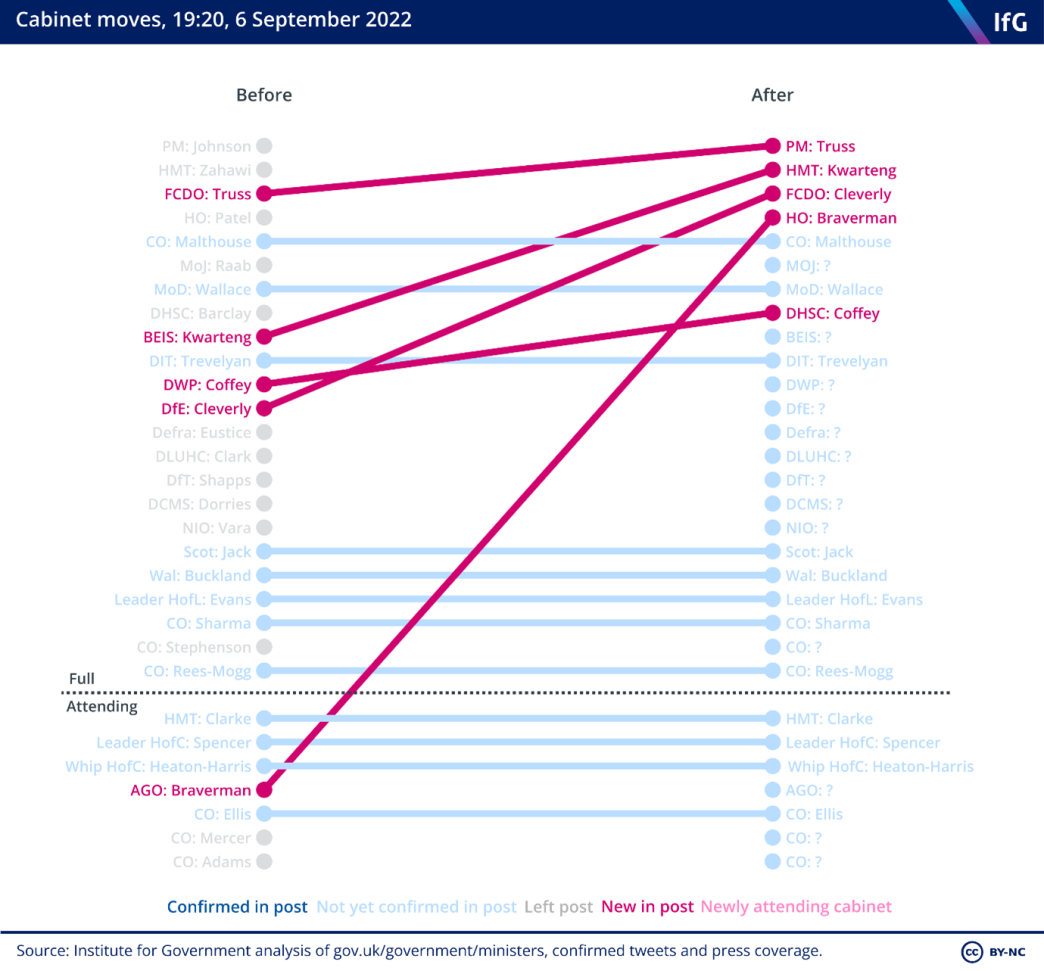
But the Home Office has often proven to be the third rail of UK politics, prone to crises and controversies for a long time. Herbert Morrison described ministers finding its corridors “paved with dynamite” as far back as 1942. And Amber Rudd, who resigned as May's home secretary because of mistakes by her officials, told the Institute that:
"The department divides into counterterrorism, policing and immigration. Counterterrorism, first class. Policing, also good. And of course, immigration was where I was unable really to get to grips with what was going on."
Today’s Home Office is no different. Braverman will inherit a series of acute policy problems that will require her immediate attention:
- Truss has committed to continuing the Johnson administration’s controversial Rwanda asylum policy in an attempt to tackle the problem of small boats crossing the English channel. But the policy has yet to be implemented, is currently in court facing a judicial review into its lawfulness, and there is as yet no evidence that it will achieve a deterrent effect.
- The department urgently needs to fix the problems with its compensation and documentation schemes in response to the Windrush scandal which have faced delays and sustained criticism.
- Six police forces across England and Wales have been placed under special measures in response to a string of failures and scandals including the Met’s response to the murder of Sarah Everard. The police operate under a “policing by consent” model which means that worsening trust in the competence of the police will undermine the government’s efforts to reduce crime.
- Disruption and queues at the border in Dover and at UK airports over the summer will need to be addressed and then inform the department’s management of the border, and its response to the ‘great resignation’ and possible industrial action in relevant sectors.
But these policy issues are in part driven by longstanding deeper institutional and cultural problems, to which Braverman will also need to turn her attention. She will need to lead the Home Office’s improvement programme in response to the Windrush Scandal, including taking a more compassionate approach to its services and to working more transparently, as recommended by Wendy Williams. This is even more difficult in the face of low morale and internal opposition to departmental policy.
And Braverman takes the reins fifteen years since the Reid reforms – the last major machinery of government change to the Home Office’s remit which created the Ministry of Justice to take responsibility for prisons and the justice system. In 2019 the IfG argued that the Home Office was not ready to handle migration after Brexit, and that the government should consider alternative options including a dedicated immigration department. Braverman and Truss should not rule out more fundamental changes if the department is unable to put into practice the full extent of the changes it needs to make.
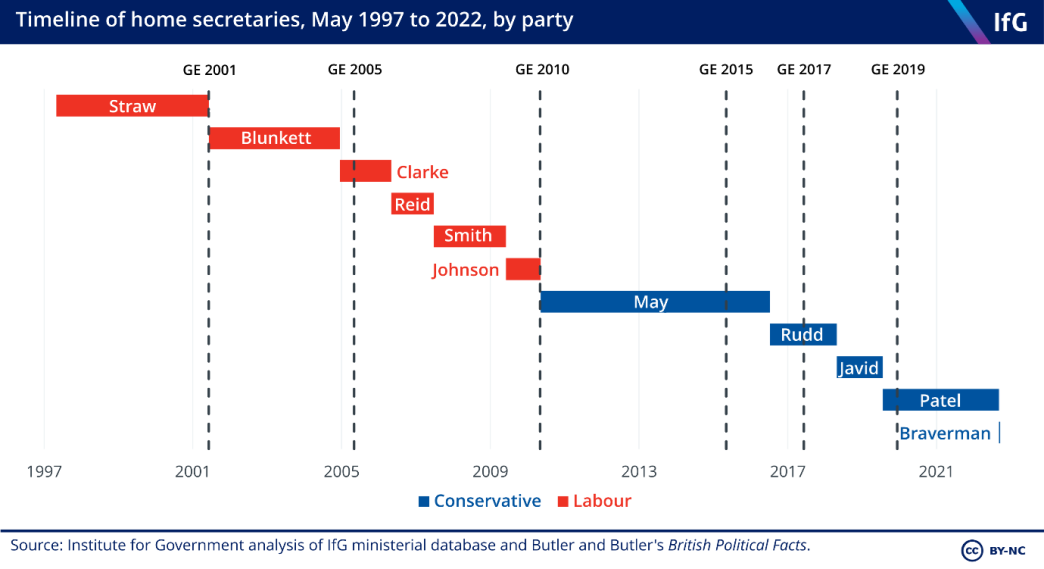
Cleverly is foreign secretary
6 September 2022, 19:43
James Cleverly is the new foreign secretary - again, a widely briefed move.
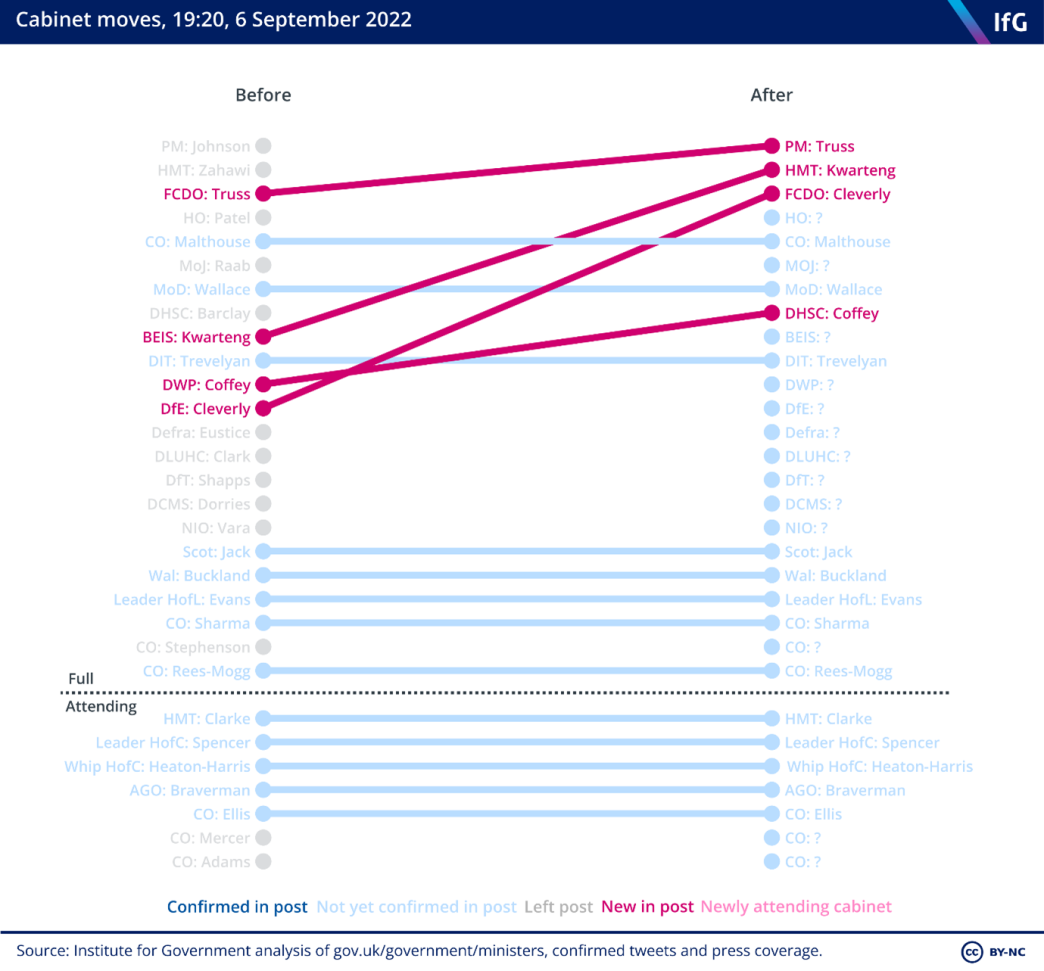
Cleverly - the 7th foreign secretary since 2010 - takes on the brief at a turbulent time and the war in Ukraine and its geopolitical impact will dominate his in-tray.
The new foreign secretary will also be responsible for negotiating with the EU over the future of the Northern Ireland Protocol. Truss has indicated that she will continue to push through the Northern Ireland Protocol Bill, which will unilaterally override huge parts of the withdrawal agreement, but doing so risks retaliation from Brussels including the possibility of a trade war. UK-EU negotiations have been on ice since last February, but a key question for the new foreign secretary will be whether to seek an agreed solution to the protocol’s problem and if so, in what areas the UK might be willing to compromise.
With all indications being that Truss enjoyed her previous two jobs of foreign secretary and trade secretary, it will be interesting to see the extent to which No.10 gets involved in day-to-day foreign policy. Foreign secretaries have long complained of the Foreign Office being ‘hollowed out’ with key decisions increasingly taken elsewhere, including in No.10 and the Cabinet Office. Former foreign secretary Philip Hammond told the Institute that
"The Foreign Office, of course, was – and I think still is to be honest – suffering from something of an identity crisis, because it is one of the great and most capable departments, but it’s been hollowed out. It’s been hollowed out by the evolution of a very presidential operation in Number 10. Major foreign policy announcements invariably get made in Number 10, and the major foreign relationships are invariably held in Number 10."
But Truss has promised a slimmed down No.10 with more autonomy for departments. Cleverley’s freedom of manoeuvre will depend on Truss’s approach.
Recent Institute for Government research showed that the newly combined Foreign, Commonwealth and Development Office has yet to find its feet. Recent news that plans to harmonise pay for officials from the two departments have been discarded are a bad sign. A common culture and sense of shared organisational purpose has yet to emerge. One of Cleverley’s biggest challenges will be to sort out the merger.
Truss has committed to cutting 91,000 civil service jobs, but reportedly while she was foreign secretary she fought for a small increase in Foreign Office staff. The Foreign Office is already well-resourced compared to its overseas comparators, although its increasing reliance on local staff abroad has dented its capability. We shall have to see whether Cleverley’s Foreign Office gets the new staff Truss seemingly fought for.
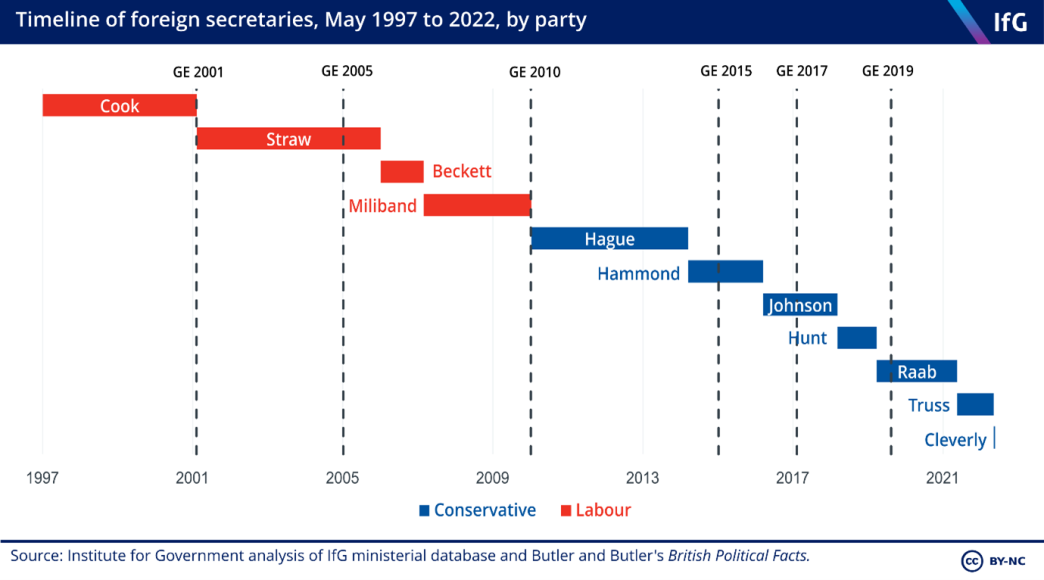
Kwarteng is the new chancellor
6 September 2022, 19:30
We have a new Chancellor—Kwasi Kwarteng—an appointment that has been rumoured in recent days. He enters Number 11 at a time when the cost of living crisis—and particularly rapidly rising energy bills—are top of the political agenda.
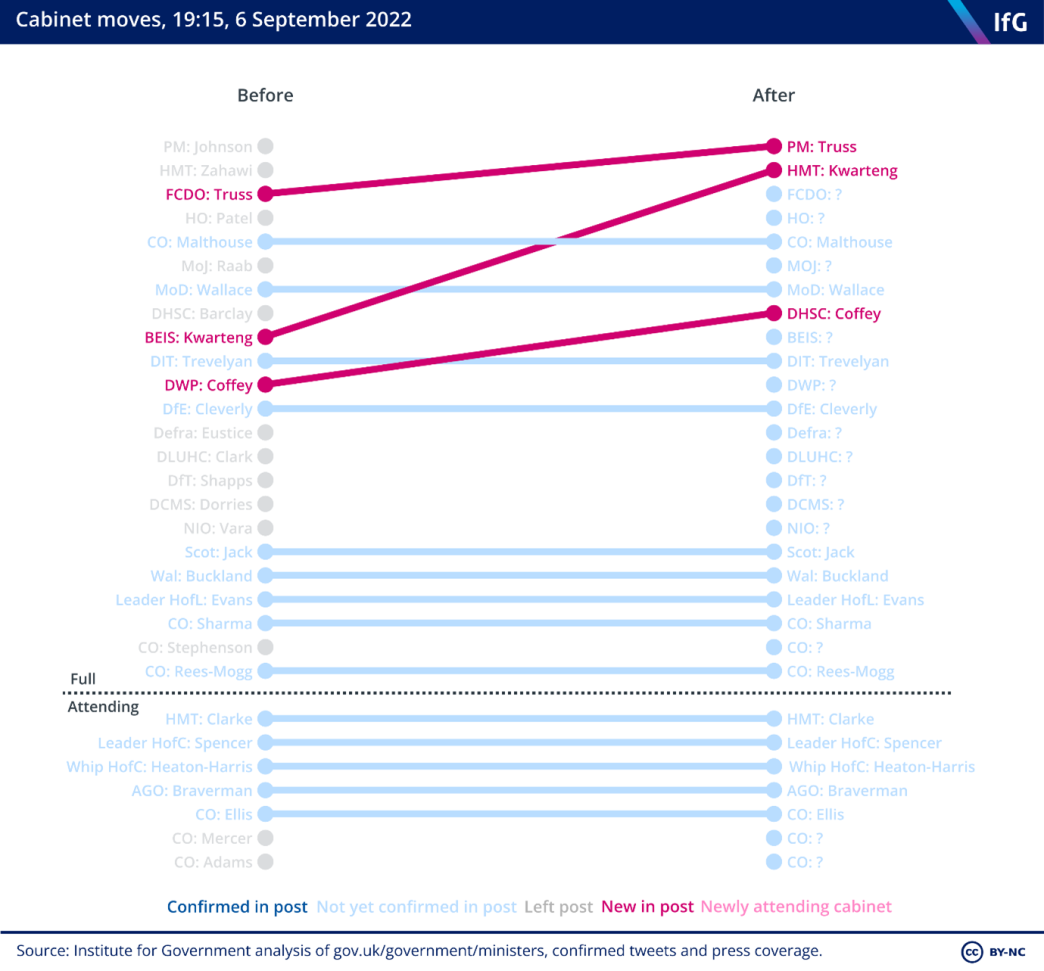
Our public finances team have just published this paper setting out the many tricky issues in Kwarteng’s in-tray. In the near term, he will have to contend with the energy crisis and rapidly rising bills.
But beyond this, Kwarteng is also likely to face lower-than-expected fiscal headroom due to a combination of inflation and higher interest rates. How will the new Chancellor balance competing tax and spending demands amid all of this? Truss has been clear that she wants to see tax cuts—but her chancellor will also be under pressure to help other public services facing high inflation and rising wages.
The reality is, our team write, that “Kwarteng will need to wrestle with the long-term fiscal reality that higher spending demands are leading the UK towards higher, not lower, taxes.”
Kwarteng is the 6th chancellor since 2010 - an average of one every two years.... (and the fifth since 2016).
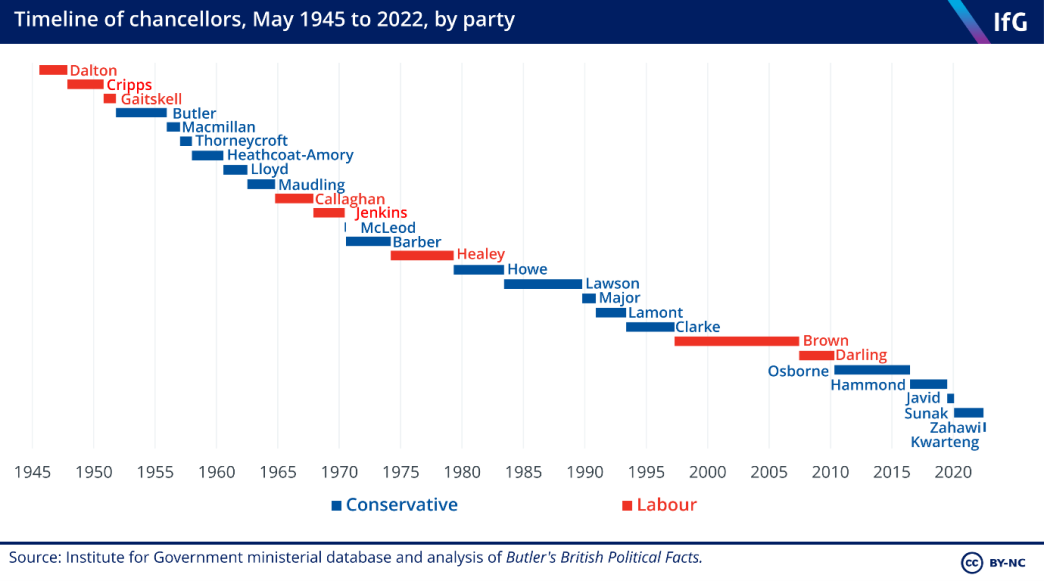
First appointment: Coffey
6 September 2022, 19:18
The prime minister has made her first appointment to her new cabinet: Therese Coffey, a close ally of Liz Truss, is the new deputy prime minister and health secretary.
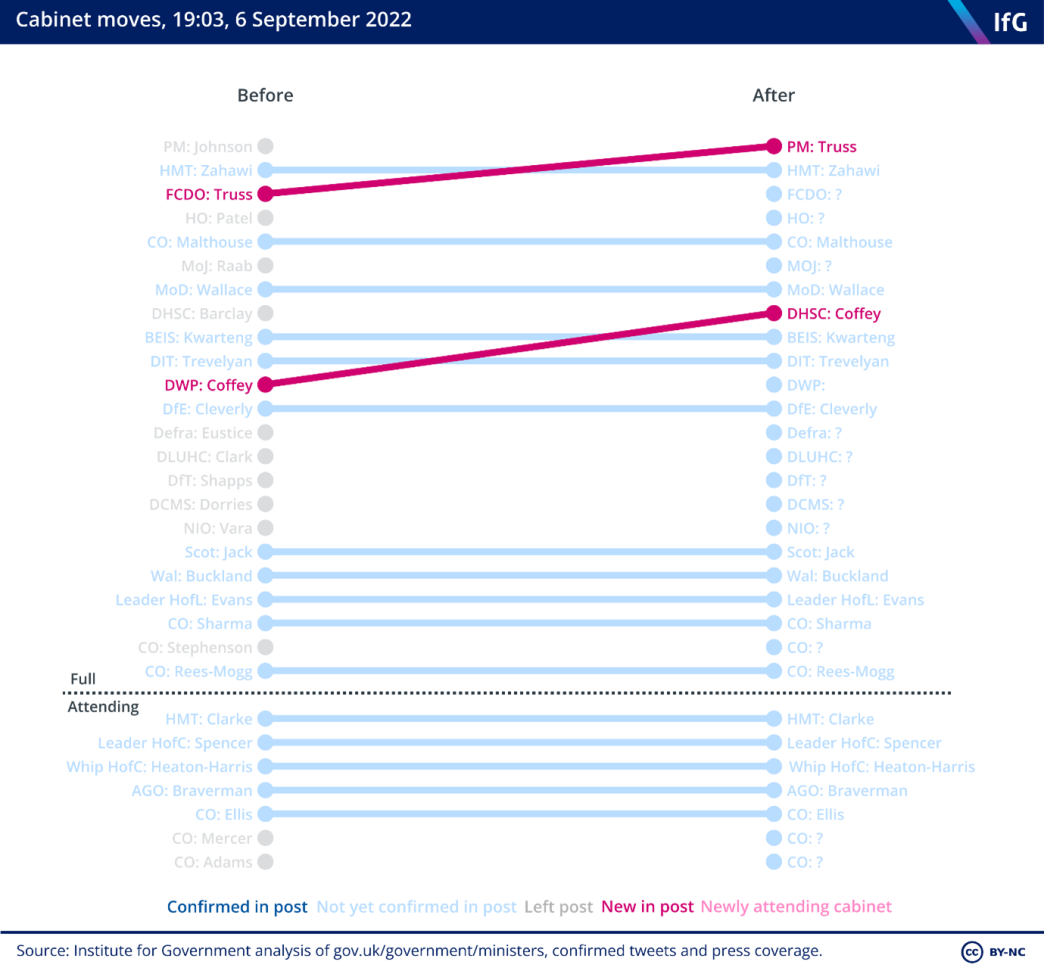
Coffey inherits a department in the middle of a serious and prolonged crisis. The Department for Health and Social Care (DHSC) helped to guide the NHS and adult social care through much of the pandemic but a return to normality in the rest of the country will not usher in a period of peace for the incoming secretary of state, who will be the 6th to do the job since 2010.
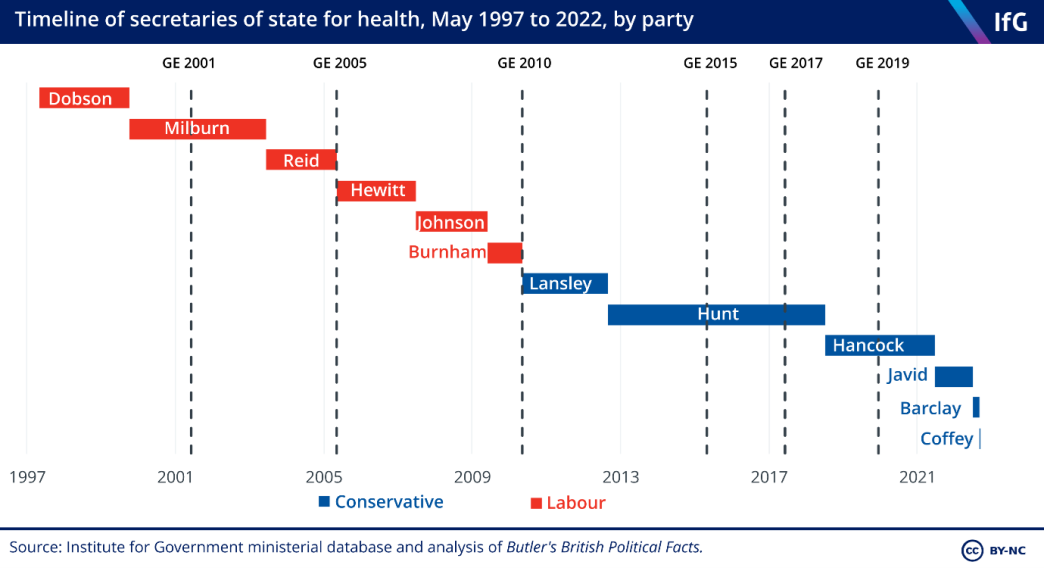
Instead, she will find herself facing a set of complex and interlinking problems:
- The spending review settlement from the end of 2021 is unlikely to be sufficient to meet the demands facing both health and social care in the wake of the pandemic. SR2021 assumed approximately 2-3% wage increases every year but rising inflation has put upward pressure on pay demands. The government recently agreed to a pay increase for NHS employees equal to approximately 5% of its wage bill, but has not put aside extra money for that increase, leaving the service with a funding gap of approximately £1.8bn. The NHS will likely have to find that money by making cuts elsewhere.
- Backlogs in demand existed before the pandemic, but Covid has exacerbated them. The number of people waiting for elective care increased dramatically throughout 2020 and 2021 and now sits at 6.7m. Even with additional funding, this backlog is not forecast to start falling until at least 2024.
- After a decline in requests for support during the pandemic, the number of people awaiting assessments for social care more than quadrupled between September 2021 and April 2022, indicating a growing backlog in that service
- All of these problems in some way relate to the staffing crisis in both health and social care. After an improvement in staff retention during the pandemic, vacancies are on the rise again. Approximately 10% of NHS jobs are currently unfilled and one estimate puts the level at 10.7% for social care.
- Both health and social care are going through some level of reform. In health, the full rollout of Integrated Care Systems (ICSs) was completed in July 2022. Meanwhile, in social care, implementation of parts of the Johnson government reforms have recently been delayed as local authorities raised concerns about their ability to fund them.
Health and social care secretaries like to put their mark on the brief by announcing programmes of reform, but Coffey should be wary of putting the NHS through yet more upheaval at a time of immense pressure.
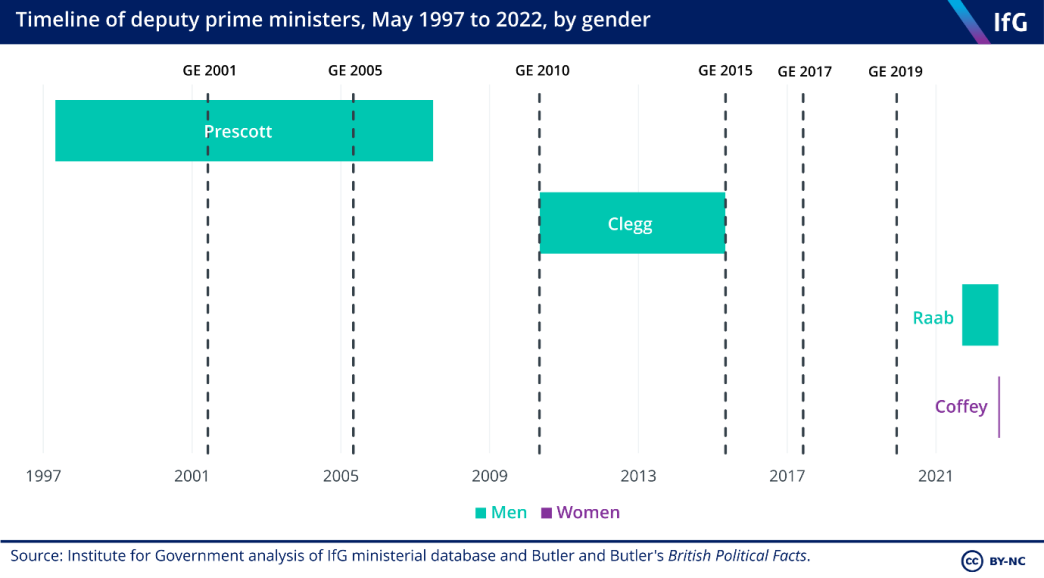
Therese Coffey’s appointment as deputy prime minister will make her the first woman to hold the role—meaning that the UK is set to be governed by a female PM and DPM for the first time. Coffey is a close political ally of Liz Truss, and served as her campaign manager as the leadership challenge began in the summer.
Coffey will combine her role as DPM with the job of health secretary. But she won’t be the first to combine two jobs in this way: her predecessor, Dominic Raab, served as deputy PM and justice secretary. Part of the reason that the DPM role is sometimes combined with other things is that it doesn’t have a set constitutional function like, say, the US Vice President.
There is no requirement for a prime minister to have a deputy, and there aren’t specific tasks that fall to them—meaning that each deputy PM can do the job differently. But the lack of a formal deputy PM role in the UK’s uncodified constitution has caused problems—for example, when Johnson was hospitalised with covid in 2020, it was not immediately clear who would take charge in his absence (Raab, as first secretary of state, acted as a caretaker). The IfG’s own Dr Catherine Haddon has explained why it’s high time for a formal acting PM role.
George Eustice and Shailesh Vara gone
6 September 2022, 19:01
Environment secretary George Eustice - who has served in Defra for several years - and the recently appointed Northern Ireland secretary Shailesh Vara have both left the government.
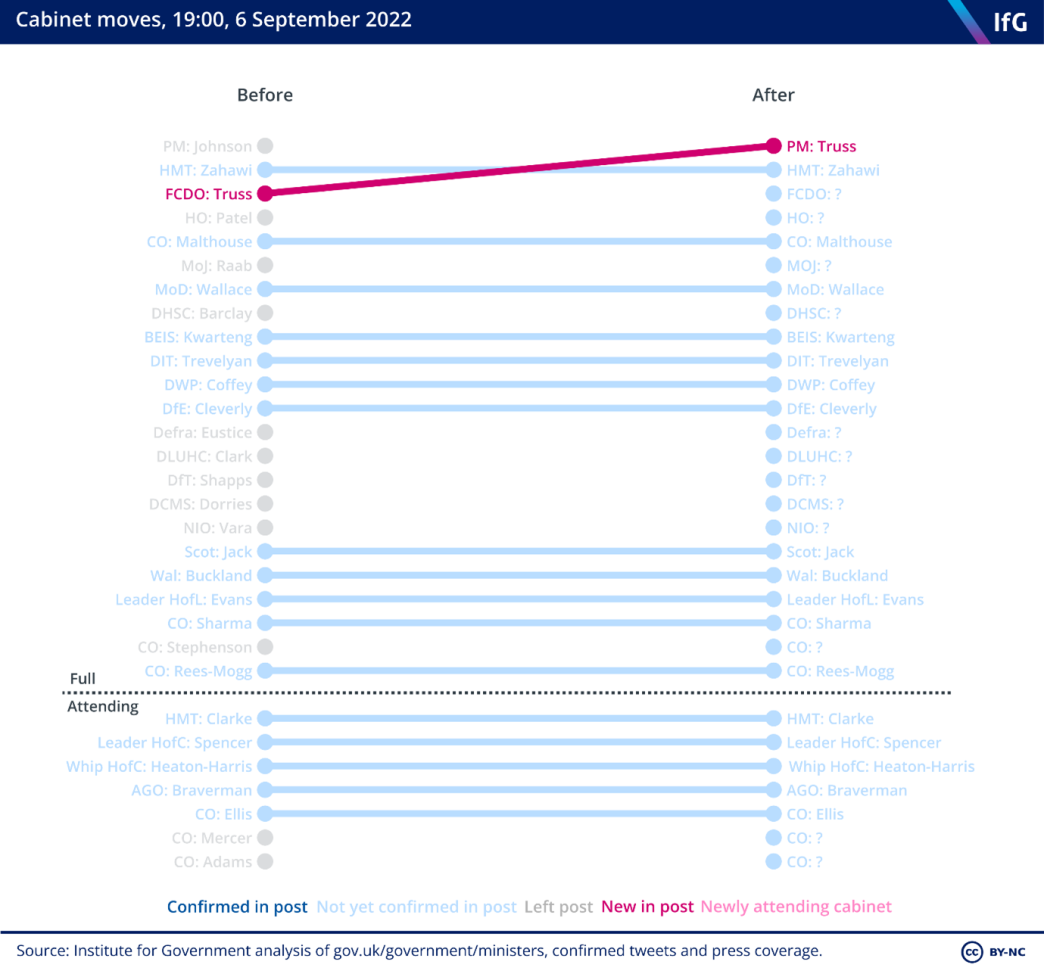
Eustice, a farmer before he entered politics, has only ever worked in the environment and agriculture department. He told the Institute that:
I can’t think of any other department that would have the breadth of expertise that you have in Defra and the family of agencies around it – whether it’s talking about some bizarre issue around the lifecycle of an oyster or the nervous physiology of a lobster, to agriculture policy and how you promote pollinators and habitats and soils and all the rest of it.
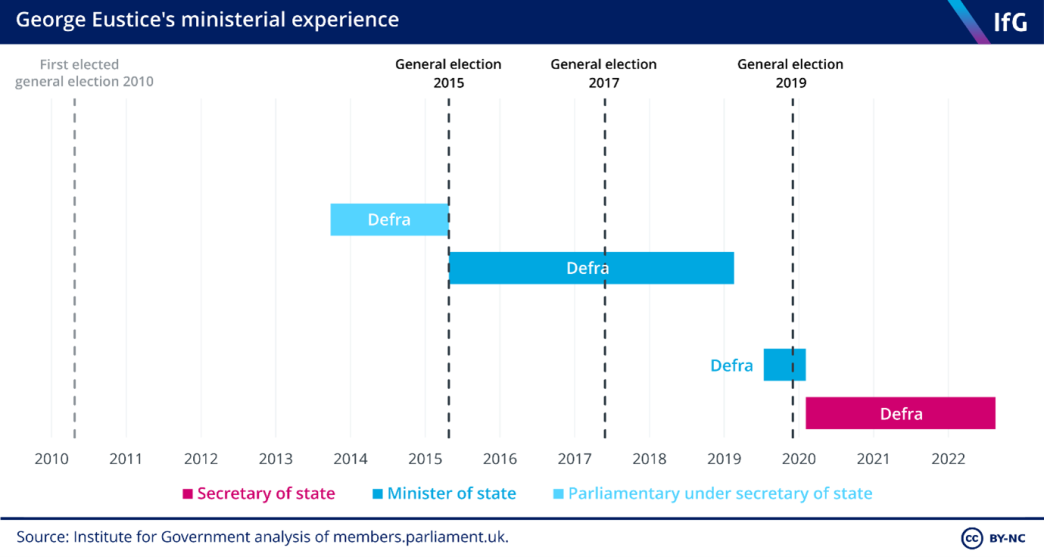
Vara was only appointed to the cabinet in the summer, after the mass resignations. He had served as a minister in the Northern Ireland Office before being promoted to cabinet. Who fills the role now is a big question - will the PM give it to a senior politician who can command respect across the Northern Irish political spectrum, or to a close political ally?
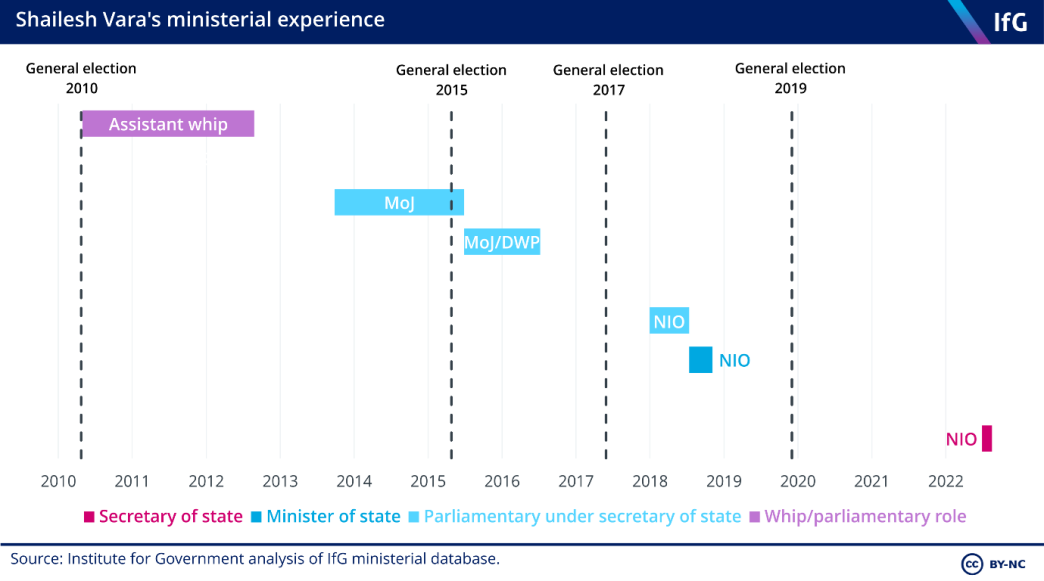
And now the government looks like this:
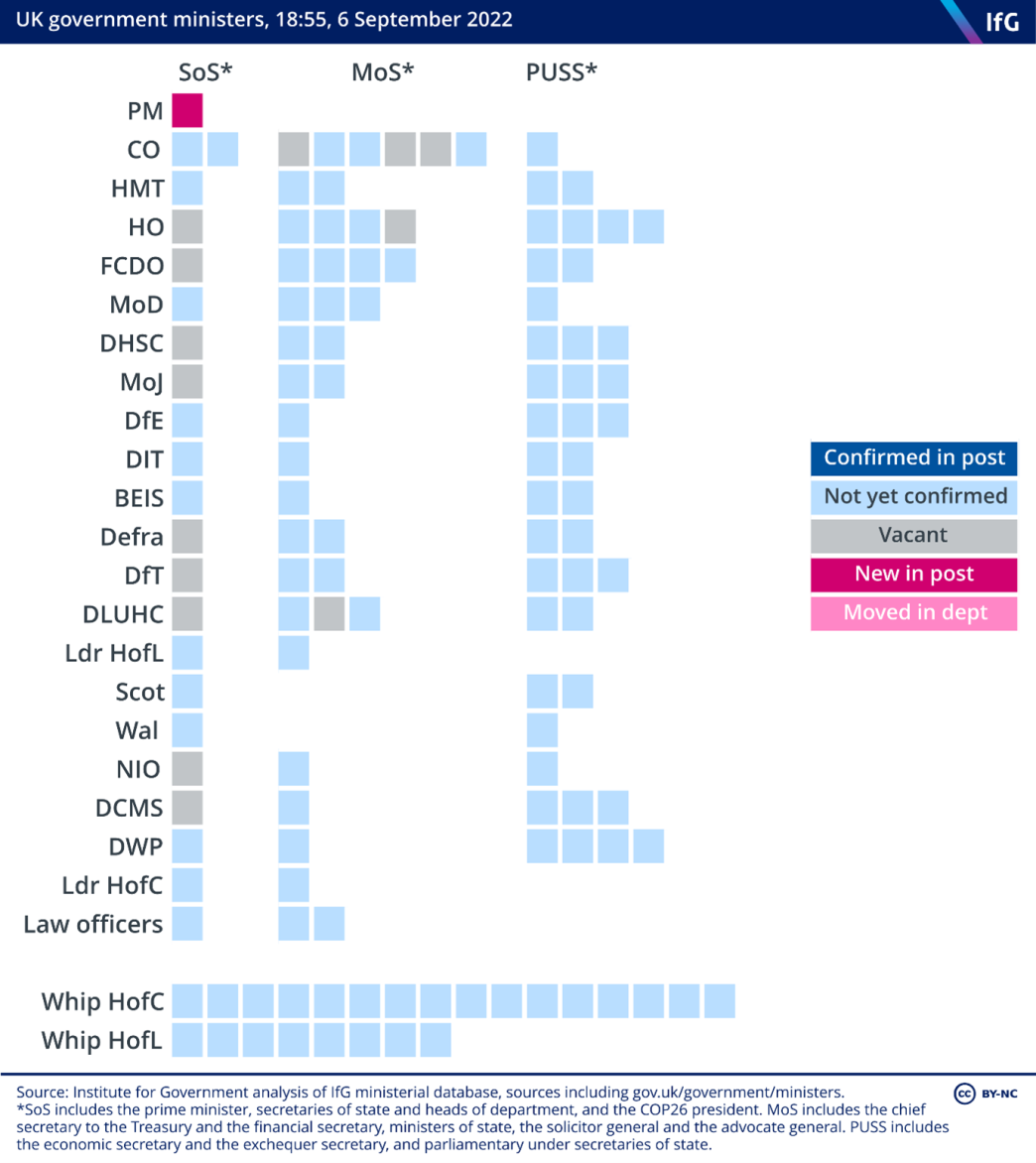
What do the sackings tell us about Truss's approach to party unity?
6 September 2022, 18:48
Alice Lilly, senior researcher at the IfG and top parliamentary watcher, writes to say that:
"One of the questions we posed at the beginning of this reshuffle was whether Truss’ appointments would indicate whether she was trying to unify her parliamentary party after a bruising leadership contest.
It’s very early days yet—we have only heard of some sackings yet, and are still waiting for appointments to be announced—but it’s notable that several of the big cabinet sackings so far (Grant Shapps, Steve Barclay, and Dominic Raab) were Sunak supporters.
Of course, it’s unsurprising that a new PM would want to stamp their authority on their cabinet—and reward loyalists. But they also need to think about how the implications of having a number of high-profile former ministers on the backbenches. That’s always a tricky balancing act."
Greg Clark leaves government
6 September 2022, 18:46
Greg Clark, who returned to government in the summer after the mass exodus of ministers, has left the Department for Levelling Up.
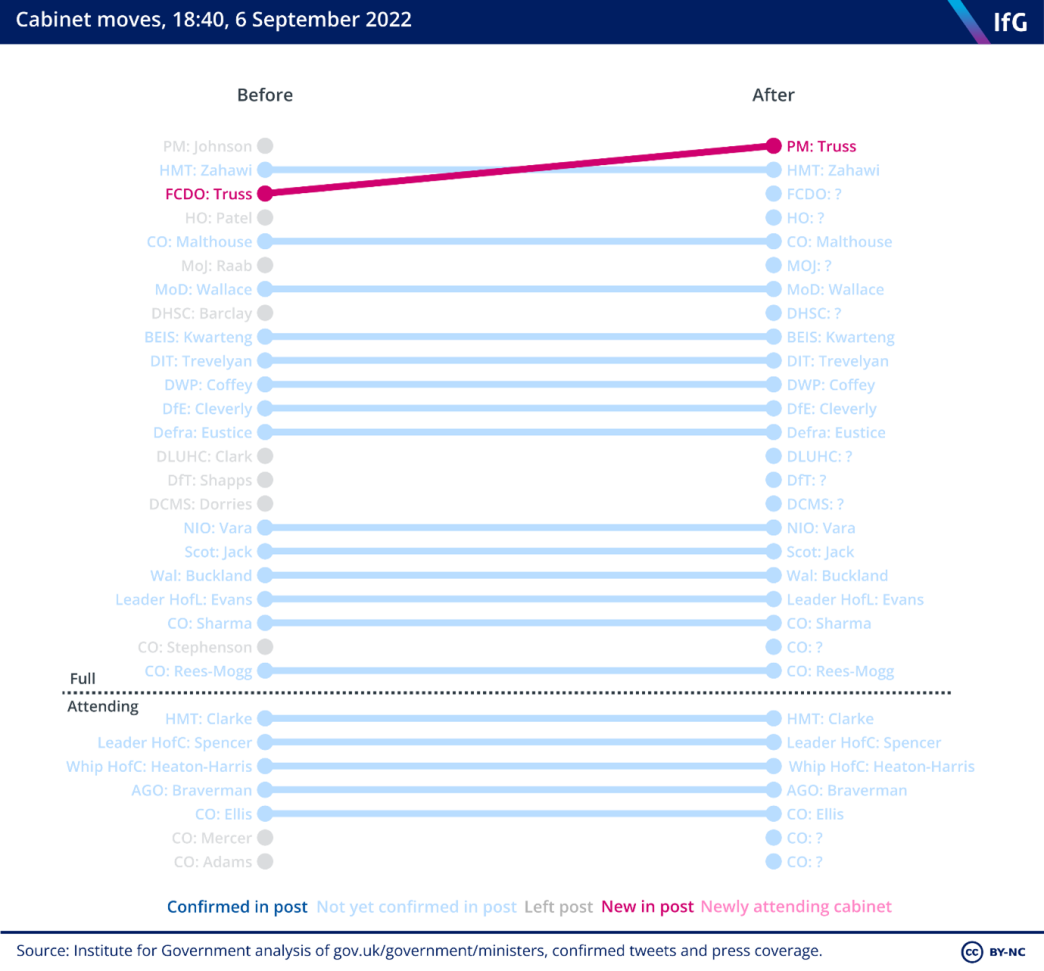
Clark had previously run that department under an earlier name, and told the Institute that:
"[We felt] that we needed to revive the sense of place and potential of cities versus towns across the country – what I did was to spend the first few months travelling around meeting city leaders."
This will be good advice for whoever takes over his department (and whatever it is called...)
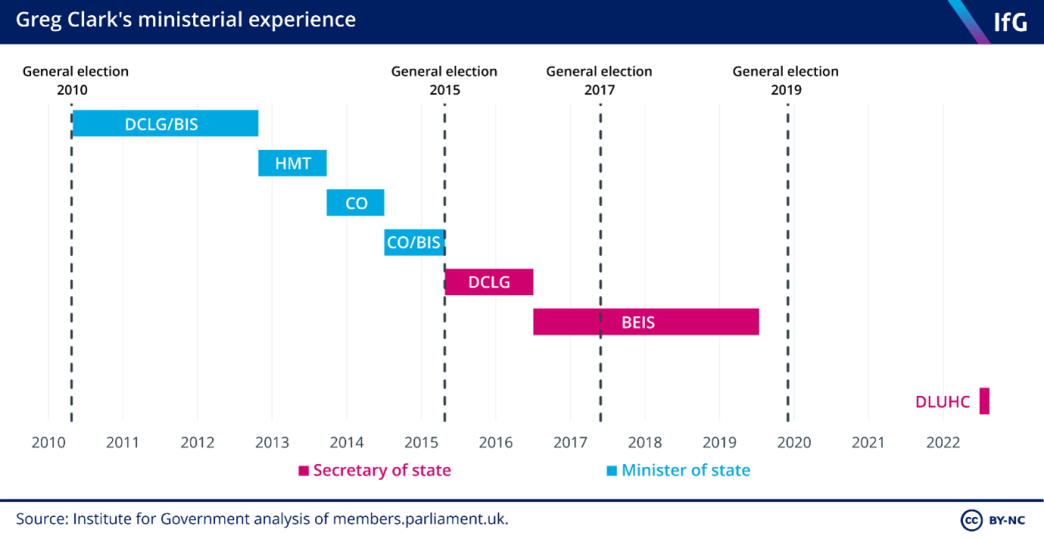
Andrew Stephenson and Johnny Mercer out of government
6 September 2022, 18:38
Andrew Stephenson, the Conservative party chair - a role in charge of campaigning - has left the government. Appointed by Johnson after Oliver Dowden after poor by-election results in June, Stephenson introduced Sir Graham Brady at the special meeting of the Conservative party on Monday when Truss was announced as the new leader.
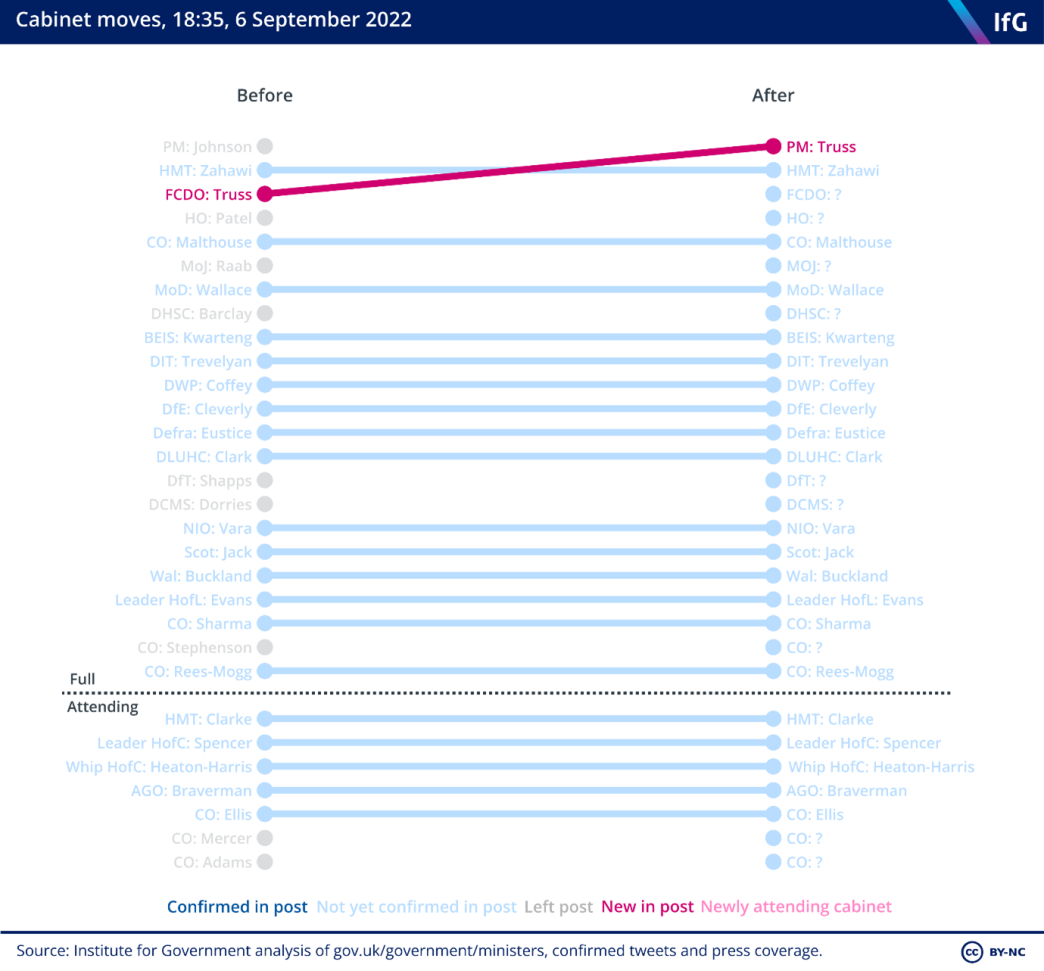
Stephenson held jobs in various government departments, but had only been in the cabinet in his capacity as party chair.
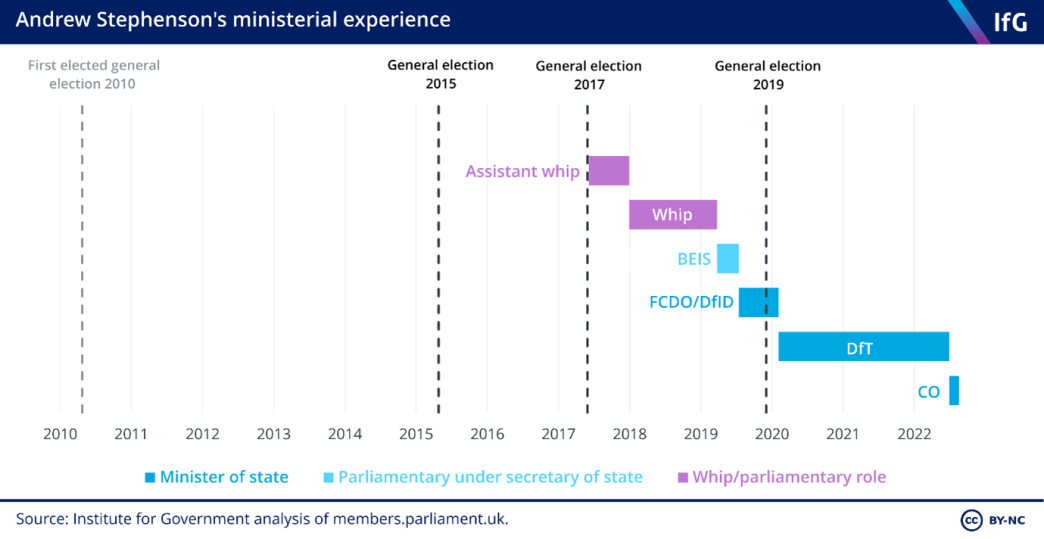
Johnny Mercer, a minister in the Cabinet Office who served under Johnson 2019-21, and then returned when over 40 ministers resigned from Johnson's government in July, has also left. Mercer told the Institute for Government that:
"I’ll be honest, my time in government was awful"
and that
"it was clear to me that, essentially, I was the face of it – I was there to get the government off the hook for its many failures on veterans – but I wasn’t actually going to be able to effect any change."
It will be interesting to see whether Mercer goes back into government a third time.
These departures mean the government as a whole looks like this:
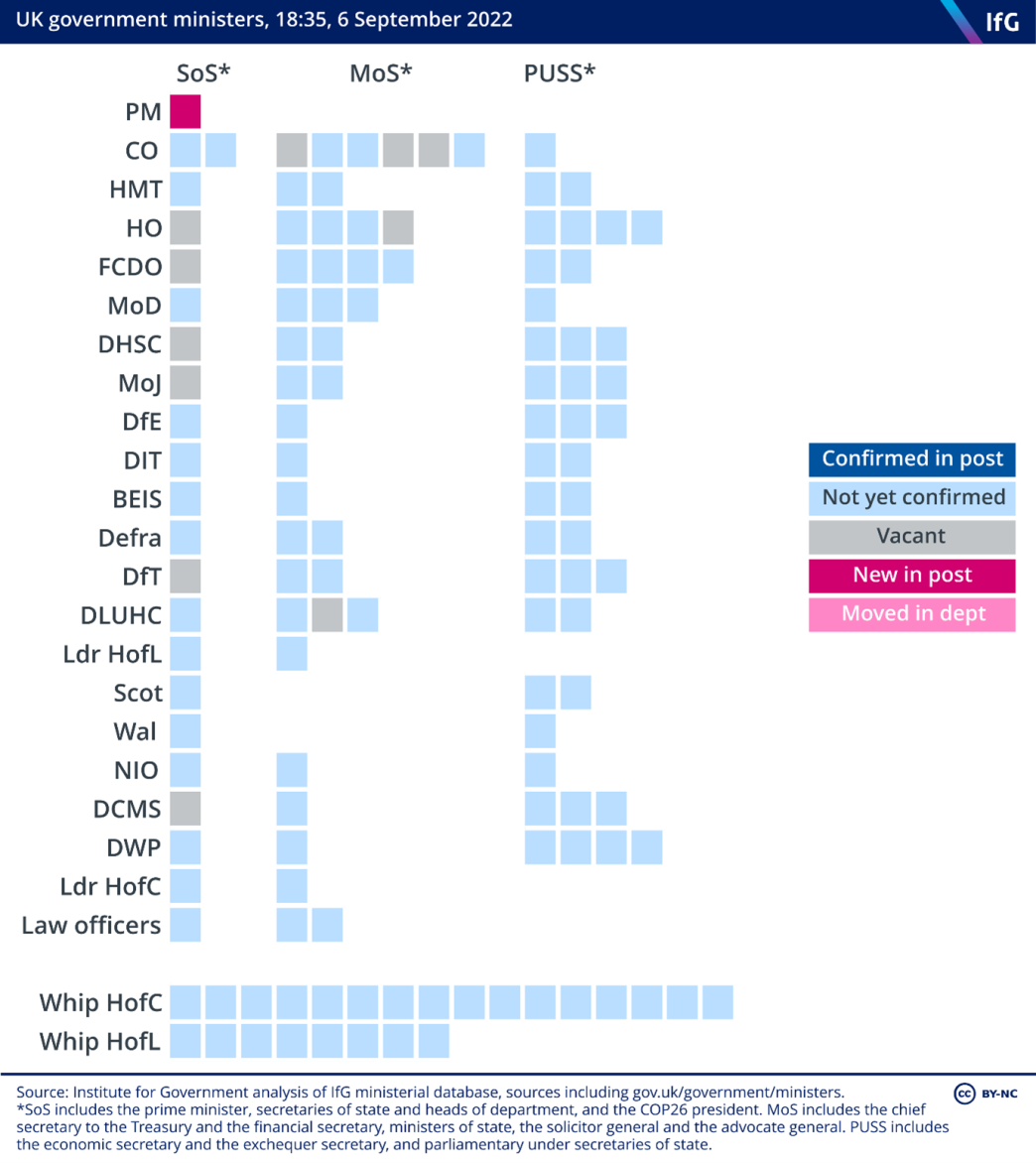
More sackings
6 September 2022, 18:12
Grant Shapps, transport secretary, and Steve Barclay, health secretary, have left the government. They were both high profile supporters of Rishi Sunak in the leadership contest.
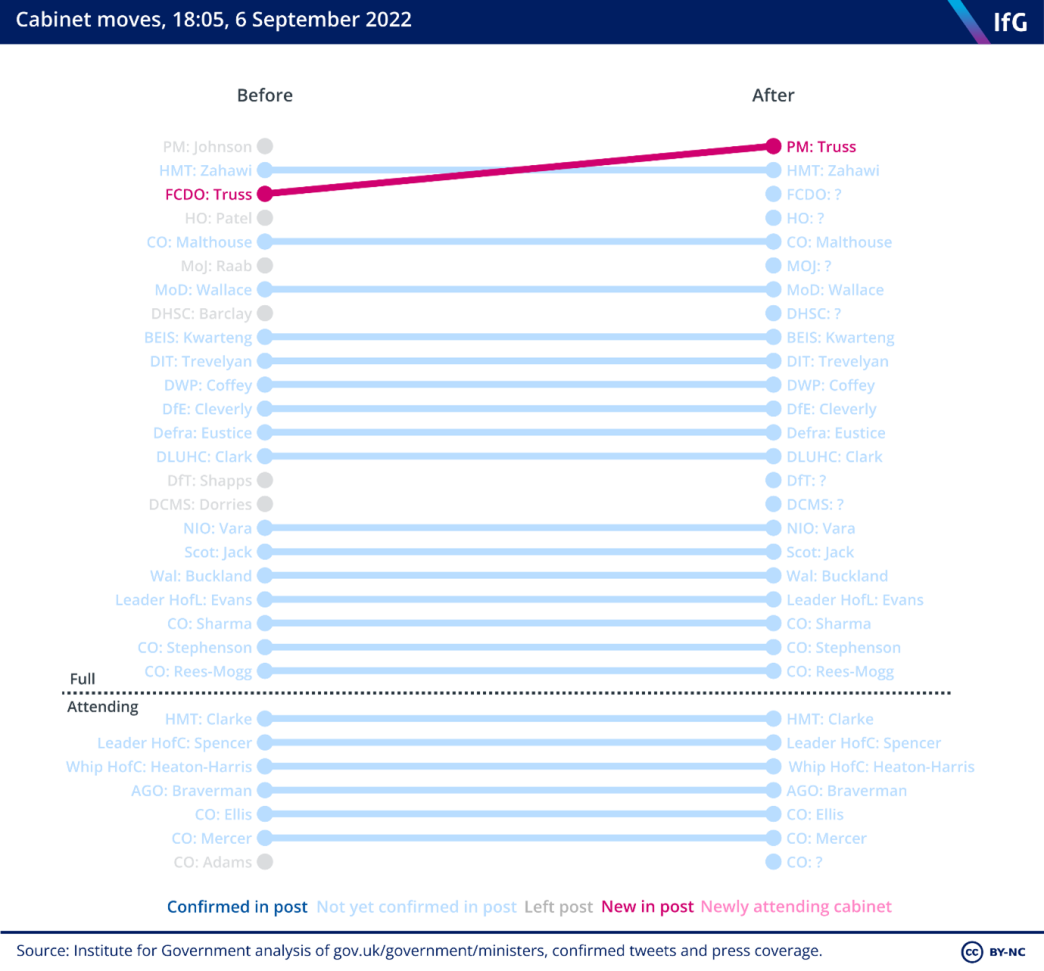
Shapps has been in and out of government over the last 12 years, and ran in the leadership contest himself, though pulled out before nominations closed. He has said he will be "an independent voice on the backbenches" now he has left the government.
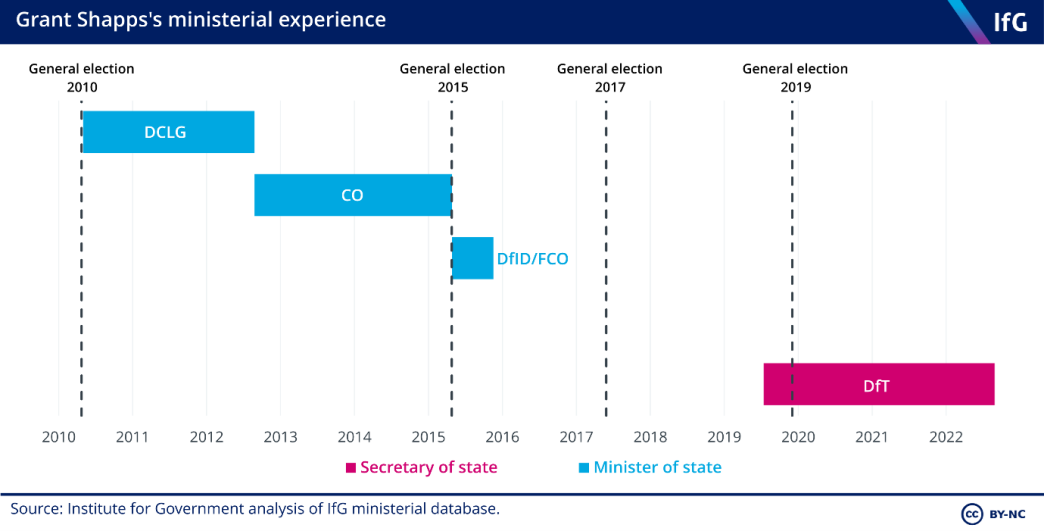
And Barclay had various important roles in Johnson's government, including, unusually, as chief of staff in No10 for a few months, alongside the chancellor of the duchy of Lancaster role. At the time, Alex Thomas of the IfG wrote that Barclay would:
"need to rapidly shed most of his ministerial responsibilities and devote himself full-time to what is an all-consuming position"
Given Barclay moved to be health secretary a few months later, it is not clear that he was able to dedicate himself fully to the chief of staff role. Hopefully Liz Truss's chief of staff will have longer in the job!
Barclay's departure means that all secretaries of state for exiting the EU are now on the backbenches.
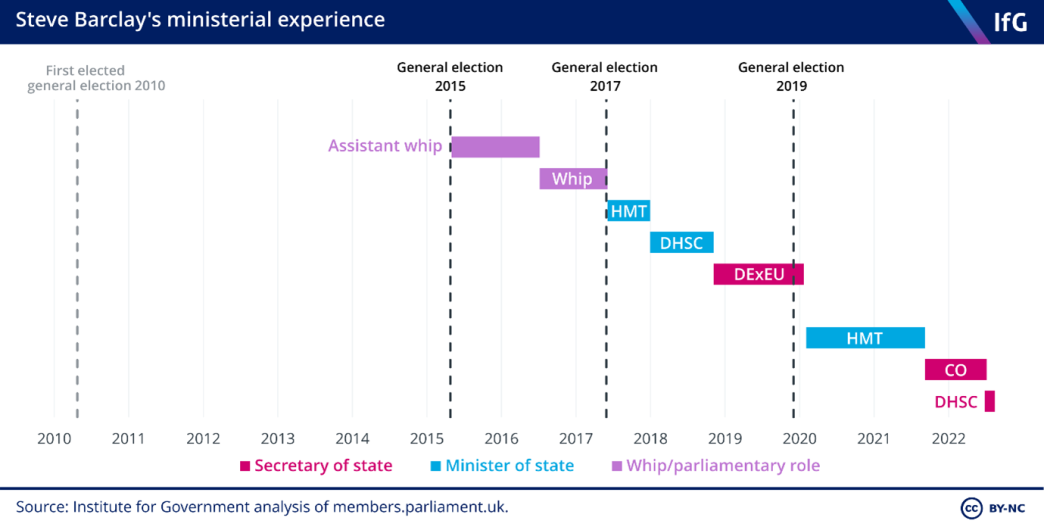
First ministerial sackings
6 September 2022, 18:00
We're now getting the first news of ministers that Truss is asking to leave government, so more vacancies are opening up. Dominic Raab, who preceded Truss as foreign secretary, has left the government.
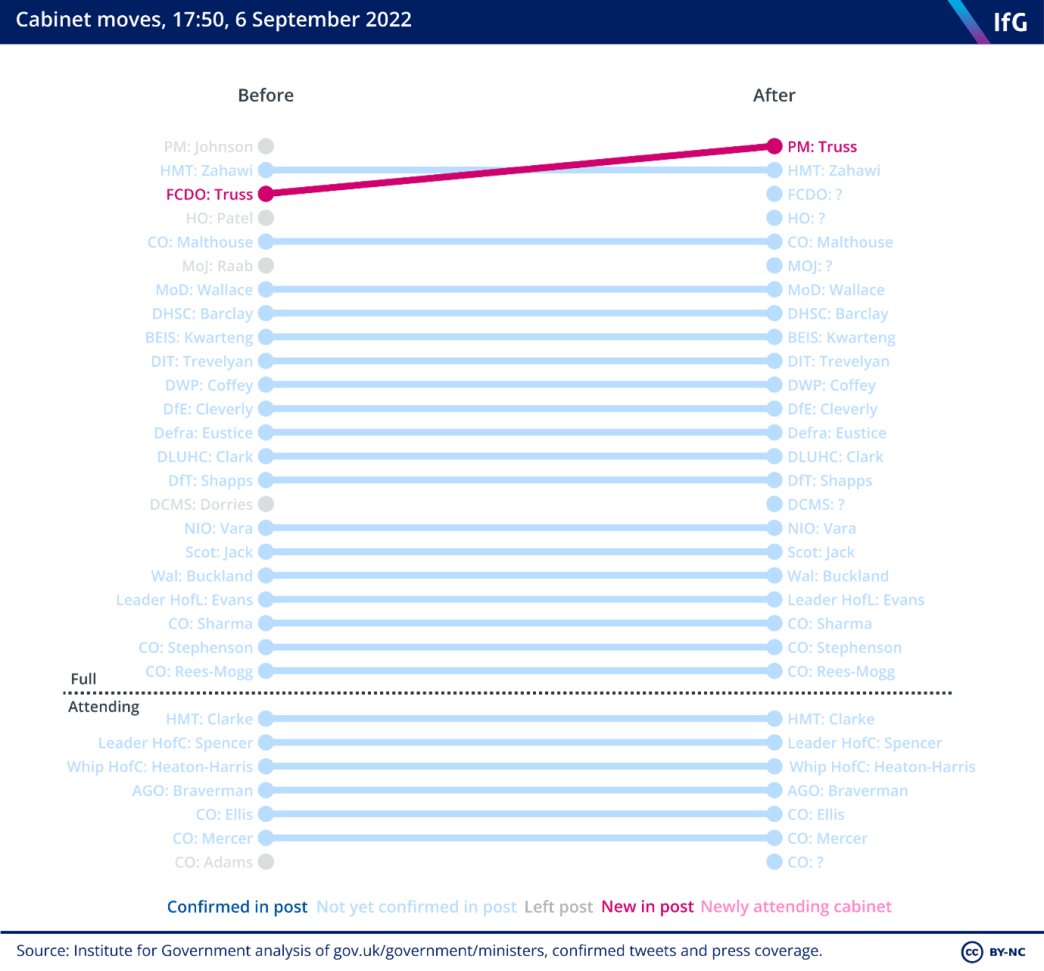
Raab served most recently as justice secretary and lord chancellor, as well as deputy prime minister. He has served under three Conservative prime ministers, first entering the cabinet under Theresa May when he was secretary of state for exiting the EU.
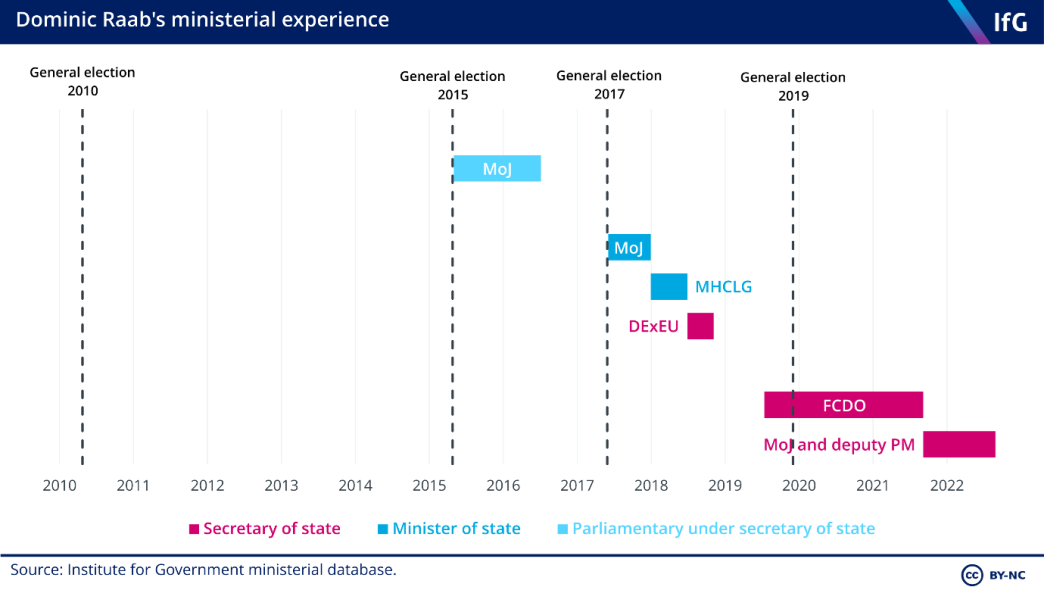
Liz Truss enters Downing Street as prime minister
6 September 2022, 17:14
Liz Truss has returned to London as prime minister and made a speech from the front of Downing Street. She spoke about her three priorities of the economy, energy and the NHS, and stressed again her focus on 'delivery'.
She has now entered No10 to begin appointing ministers. With the resignations over the last day or so, the cabinet currently looks like this - we expect it to be quite different in a few hours.
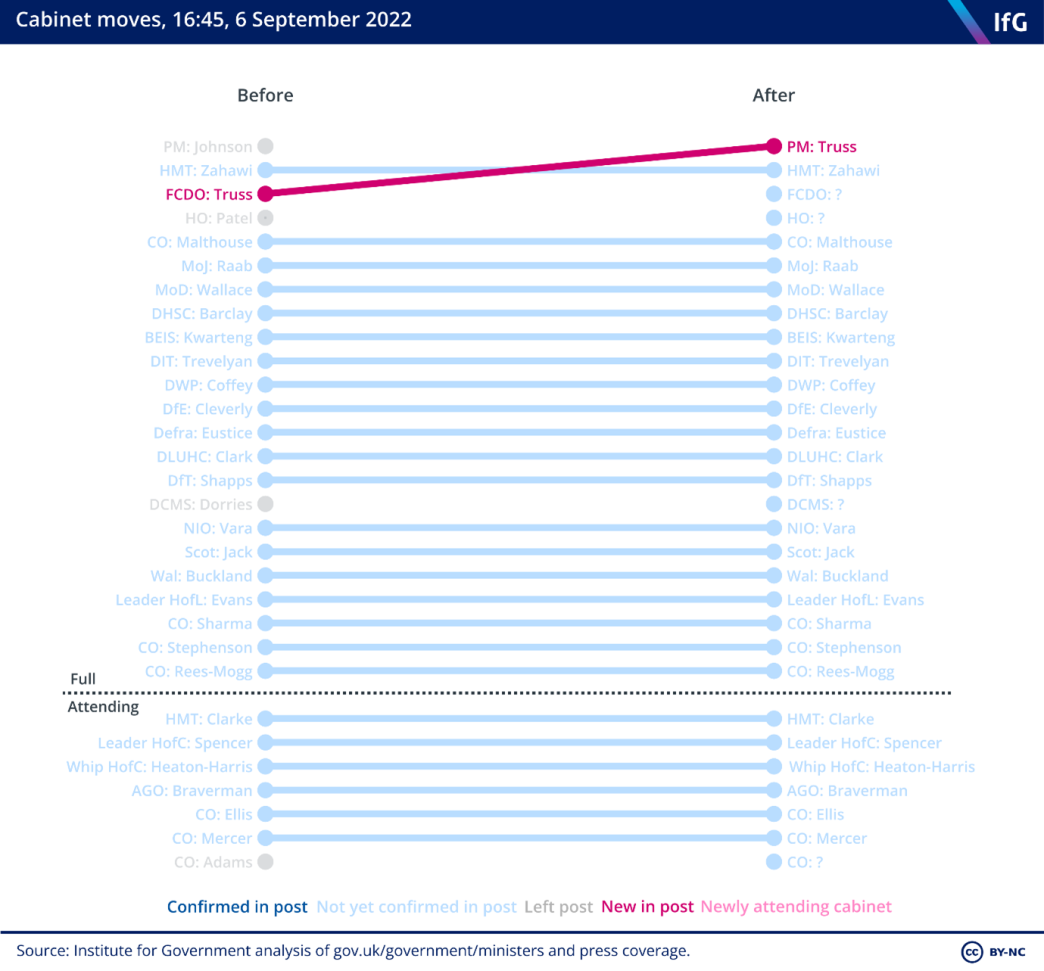
Liz Truss to begin shuffling ministers
6 September 2022, 15:55
Liz Truss has now returned to London to make her initial speech as prime minister and set up her cabinet. Johnson's outgoing cabinet represented constituencies across England, with Alister Jack the only member of the cabinet with a constituency outside England. Where will Truss's team be based? And how will her East Anglian neighbours fare in the (re)shuffle?
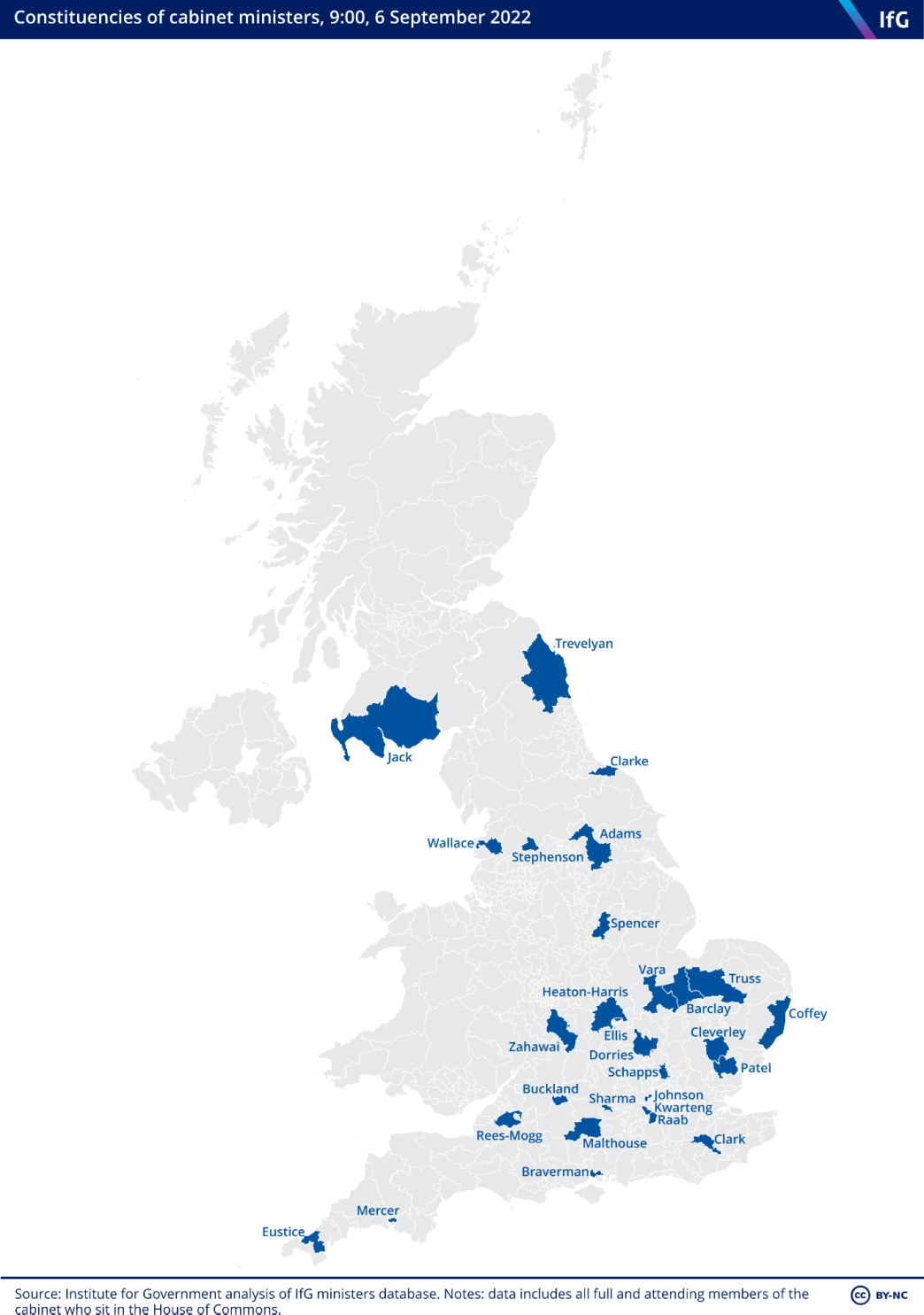
Truss is reorganising No10
6 September 2022, 15:08
Alex Thomas, programme director at the IfG, writes this about Truss's reported reorganisation of No10:
"Liz Truss’s team are “slimming down” No.10, with parts of the existing Downing Street operation moving to the Cabinet Office. The prime minister’s legislative team and – notably – her policy unit will report to her from the Economic and Domestic Secretariat, on the other side of the pod that separates No.10 from the bigger Cabinet Office building on 70 Whitehall.
This is a version of a plan from earlier this year. As one of his many government resets, Boris Johnson wanted to shift people out of an overcrowded Downing Street – but abandoned the idea when it met resistance from staff unhappy about moving further away from his court. Truss is using her moment of maximum organisational power to clear the decks.
It means the civil servants and special advisers who remain in “the House” of No.10 will be Truss’s private office, her closest political allies, the press office and the operational staff who make the PM’s life run smoothly. The move suggests Truss wants her immediate team to focus on the nuts and bolts operation of government: facilitating good decision-making, communicating the new prime minister’s decisions to the rest of the government and presenting them to the public. And with fewer senior figures competing for the prime minister’s attention, claiming to represent their views and causing confusion among departmental secretaries of state and senior officials.
The PM will still need clever people in the Cabinet Office to generate policy ideas, to interrogate government data, to advise on parliamentary handling and to hold departments accountable for making the government’s plans happen if Truss is to make good on her promise that “we will deliver, we will deliver, we will deliver”. But they will be more distant from her day-to-day work and are likely to have less uncontrolled access than Johnson gave his wider team.
This will be a good thing if it reflects a prime minister whose personality and management style supports more ordered governing and decision-making. It will also help to rationalise the competing power centres with a single domestic policy hub in the Cabinet Office. If Truss can get No.10 and the Cabinet Office working well as complementary twin entities she will have avoided one of her predecessor’s mistakes.
But for Truss’s model to work she will need to invest her personal authority as prime minister in the heads of the now more distant units, and make time in her diary to see them and direct their activity. She should give as much attention to the delivery team as to her policy unit – it would be an error to downgrade delivery and implementation given Truss’s plans. The power of a Cabinet Office unit within Whitehall is only as strong as its proximity to the PM and alignment with her priorities. Truss must guard against those who are physically most proximate shutting out the rest of the machine she needs to get things done."
As Alex said, No10 saw many resets and reorganisations under Johnson - we put them all together here:
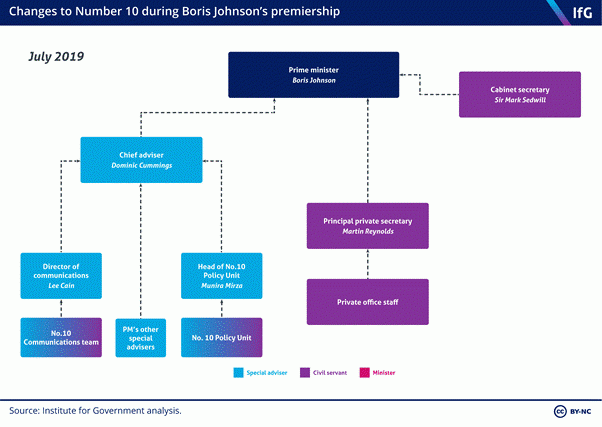
What is it like working with Liz Truss?
6 September 2022, 15:00
Liz Truss has been in government continuously since 2012, with jobs in six departments (and head of four of them) before being appointed prime minister.
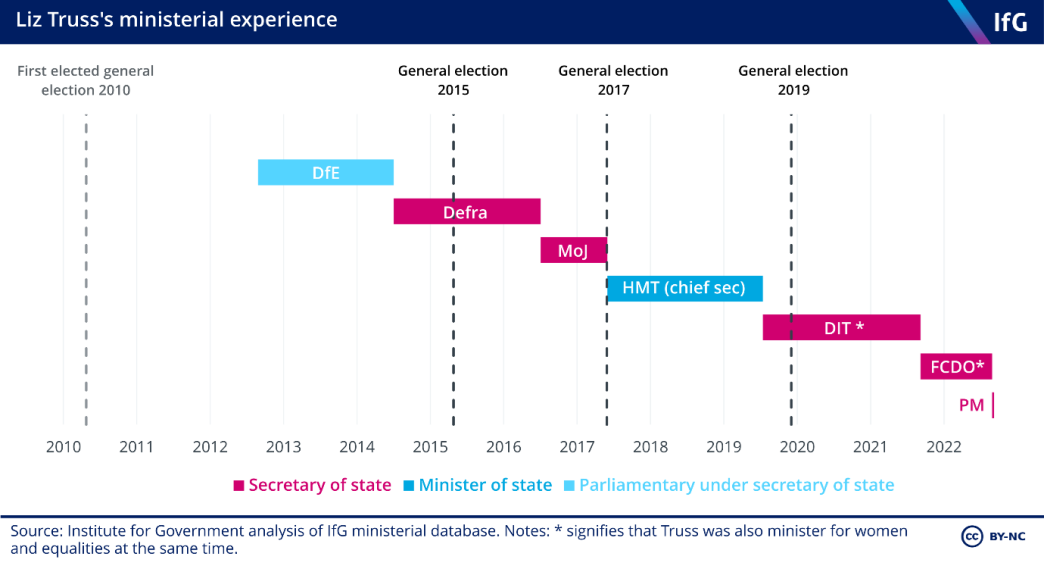
Truss has worked with lots of different ministers along the way - we've dug into our Ministers Reflect archive to see what people had to say...
Jo Swinson (whatever happened to her?) talked about when she was equalities minister - a post Truss has held for several years herself - said that Truss was very keen to help her with any initiatives she was working on:
"And Liz Truss [then Minister for Education and Childcare] was really up for things and, you know, initiatives in schools to encourage girls to do maths and things like [that]"
David Lidington, who worked closely with Theresa May when she was PM, said that one of the things he had to deal with as justice secretary was "resetting" the relationship with judges after Truss's time in the role:
"I did re-establish relations with the senior judges, that was one of the top priorities, and the prime minister made clear to me that it should be a top priority – whatever the rights and wrongs of it, you know, there had been a breakdown between Liz Truss as lord chancellor and the senior judiciary"
And George Eustice, the current agriculture secretary (for how long?) said that when he was a junior minister in the same department, and Truss was his secretary of state, she was particularly interested in digital issues, and wider aspects of the role - including media management, something she'll presumably carry over to No10...
"Liz Truss had other issues that she was very interested in, in particular digital and data and how technology could transform agriculture, and I think it’s fair to say she had more interest in issues that perhaps had an overlap with Defra but weren’t strictly Defra issues. So, issues such as skills or training or education she was very interested in, issues such as planning she was very interested in, even though there was a less direct Defra involvement to that. She also had, far more than any of the others, a pre-occupation with communications and media management."
Who will be the new Northern Ireland secretary?
6 September 2022, 14:14
Reportedly, several senior current and former ministers have turned down the job of secretary of state for Northern Ireland in Liz Truss’ cabinet.
The new Northern Ireland secretary will take on the role at a difficult time. The DUP is refusing to appoint a deputy first minister, preventing the formation of a new Executive, in protest over the Northern Ireland Protocol, and has indicated it won’t do so until the UK government passes and implements its legislation to unilaterally override parts of the UK-EU deal. The clock is ticking; the bill isn’t expected in the House of Lords until late October, but if there’s no new Executive by the 28 October, the secretary of state will be obliged to call fresh elections. But Northern Ireland’s political parties are also deeply divided over the protocol, and the majority strongly oppose the UK government’s unilateral approach.
The new Northern Ireland secretary will need to work fast to build good relationships with all political parties and establish themselves as an honest and trusted broker if they hope to get Stormont back up and running; in the current political climate, this will be a difficult task. They will also be answering questions in the Commons immediately – the first Northern Ireland questions session is on Wednesday morning, before Truss’s first PMQs.
In 2019, Institute for Government colleagues Jess Sargeant and Jill Rutter recommended that prime ministers appoint a respected figure as Northern Ireland secretary:
“Northern Ireland secretary is an important job in UK government – but prime ministers do not always treat it as such. Prime ministers should consider carefully who they make their NI secretary.
It should be regarded as a role for a (relatively) senior secretary of state who is able to command respect across the political and civil society spectrum in Northern Ireland, and able to fairly represent their views back in London. Appointments must be made with regard for the interests of Norther Ireland, not just who the PM needs to accommodate in cabinet.”
The Irish taioseach, Micheal Martin, has issued a statement saying he's looking forward to working with the new prime minister and "to reach agreed outcomes" on the protocol - the new Northern Ireland secretary will be busy from the get-go!
How much change will there be when Truss appoints her first cabinet?
6 September 2022, 13:08
As we get ministerial appointments this afternoon, one important question will be how much turnover is there. When Boris Johnson took over as prime minister, he cleared out many of Theresa May's top team. Will Truss have a similar clear out? Many of her supporters and close allies were also supporters of Johnson, so we might expect there to be less change than in 2019.
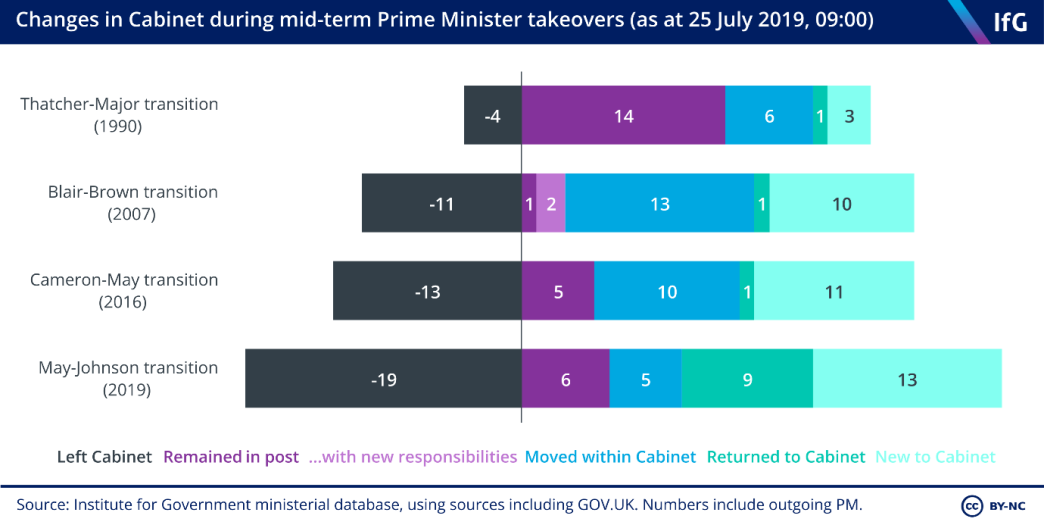
Liz Truss is prime minister
6 September 2022, 12:51
It is official – Liz Truss has now spoken to the Queen and has been asked to take on the office of prime minister and form a government.
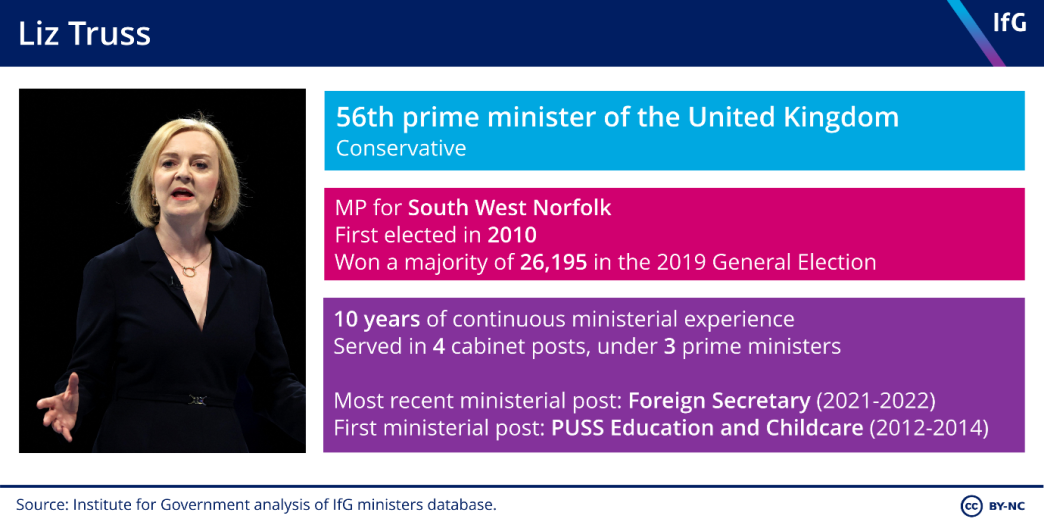
Truss is one of the most experienced prime ministers in recent years, in terms of ministerial roles – she has served continuously since being appointed as a junior minister at the Department for Education by David Cameron.
Earlier this morning the Institute hosted a discussion on the big issues Truss will be dealing with as prime minister. Acting director Hannah White set out some of the key things the new prime minister needs to focus on.
Will there be a new refugees minister?
6 September 2022, 12:18
Lord Harrington resigned as minister for refugees on 4 September, a day before the result of the Conservative leadership contest was announced.
Harrington was appointed on 8 March this year, shortly after the start of Russia’s full-scale invasion of Ukraine, which has triggered the worst refugee crisis in Europe since the Second World War. He had a specific brief to deliver the UK’s resettlement scheme to provide asylum to refugees from Ukraine, as well as overseeing the ongoing resettlement of refugees from Afghanistan. The UK’s Home for Ukraine scheme offered three-year visas to any Ukrainian citizen provided they had a sponsor in the UK willing to host them.
In his first weeks in post, Harrington was frank about the capacity issues within the Home Office that had created long delays in the issuance of visas, admitting that the government was “not geared up” to manage the volume of applicants. In the subsequent months, Harrington appears to have resolved many of these bottlenecks, and the pace at which visas have been issued has increased considerably.
Nevertheless, the fact that the government chose to retain a visa scheme for Ukrainian refugees, in contrast to European countries, means that the UK has provided asylum to fewer refugees per capita than most other countries in Europe.
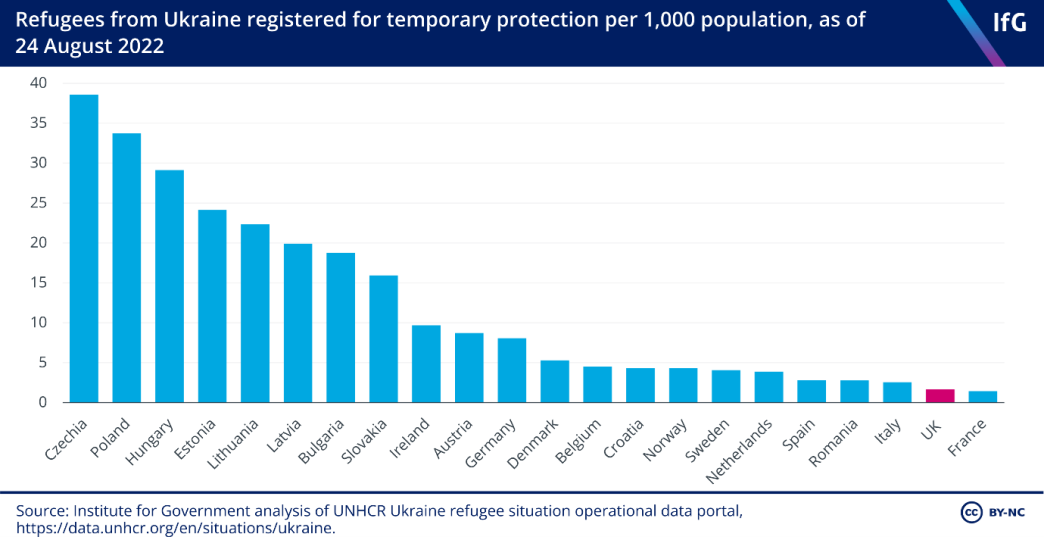
In his resignation statement, Harrington noted that his appointment was always intended to be a temporary post, and that a permanent machinery was now in place to deliver support to refugees- so it's not clear if Harrington will be replaced. However, Harrington has also called for the government to increase payments to refugee hosts to avoid a rise in homelessness in the coming months. At present, sponsors only receive state support for the first six months that they host refugees. The Afghan resettlement programme is also ongoing.
Boris Johnson no longer prime minister
6 September 2022, 12:10
Boris Johnson has handed in his resignation to the Queen. He has been prime minister for three years, one month and 14 days, meaning he was in No10 for longer than his immediate predecessor, Theresa May, but he is one of the shorter-serving post-war PMs.
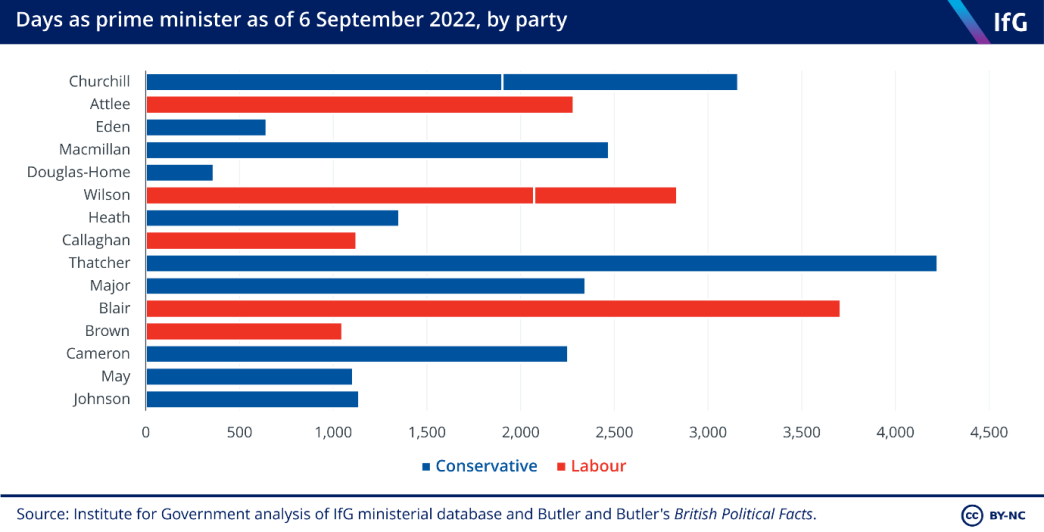
You can read more about Johnson's time as prime minister, and the questions he leaves for Truss, in the Institute's analysis here.
Priti Patel resigned - so why is she still home secretary?
6 September 2022, 11:56
While Priti Patel submitted her resignation yesterday, she is still home secretary until the next appointee takes over. Home secretary is one of a few roles in government that must always be filled – they have various legal duties and powers, so there must always be someone in post.
The same is not true for many other ministerial roles – when over 40 ministers resigned from Johnson’s government in July, many of the posts were not filled for several days. And if other ministers resign between now and Truss appointing their replacement, there is no need for her to rush to do so.
As Cath explained on twitter, while there is a gap between prime ministers, ministers still have the powers of their roles - her thread starts here.
Suella Braverman, the current attorney general, is widely briefed to be the incoming home secretary - she'll be the fifth woman to do the job if she's confirmed.
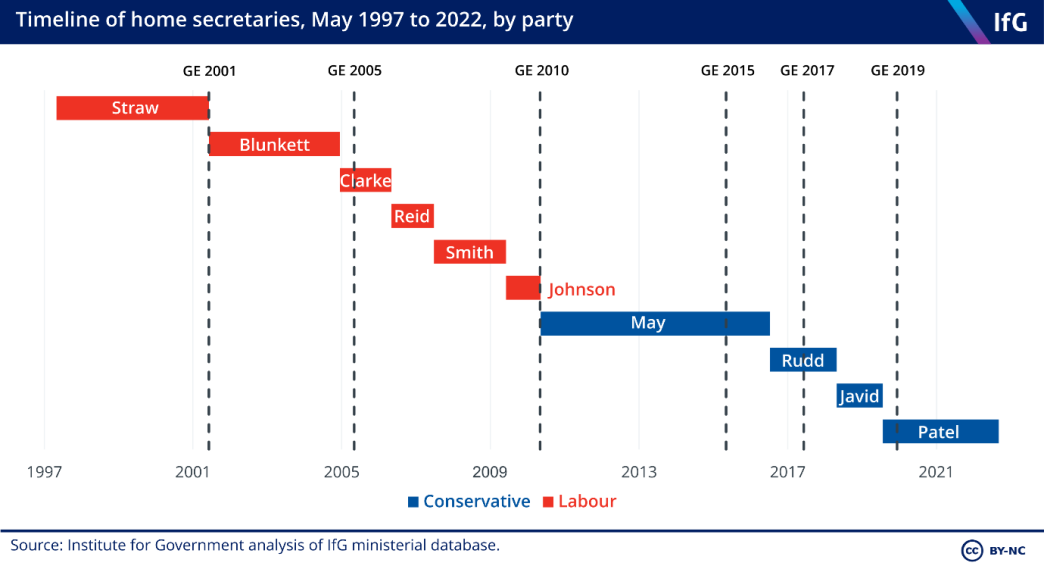
How will Truss deal with energy and climate issues?
6 September 2022, 11:32
The Institute's Jill Rutter and Tom Sasse have sent this insight into one of the big issues facing the new prime minister:
"One of the big questions Liz Truss will have to answer is how she organises energy and climate policy and who she puts in charge. Rishi Sunak said he would create a separate energy department – there was no such suggestion from Truss so it looks set to stay in BEIS. But that gives the new business secretary a huge in-tray – so she will need a big hitting energy minister tasked, vaccine-roll -out- like, with delivering Truss’s energy plan (the post is currently taken by Greg Hands, a Sunak-backer). And will that minister also lead on climate change? Truss has committed to the net zero target in 2050, albeit with less gusto than her predecessor.
A related question is what happens to Alok Sharma, who kept notably quiet during the campaign. He currently remains in the cabinet as COP26 President but also chair of the key climate change implementation committee, and he has two months left to run as COP president until the Egyptians take over in Sharm-el-Sheikh. It would make practical and policy sense for him to stay in that role til then – but does his agenda fit in a Truss cabinet? In the longer term , Truss may want to look at whether she needs to bolster the capacity of the centre to help ensure that her policies on both energy and climate change can be delivered. We made some recommendations here, including that the Cabinet Office and Treasury should play bigger roles in taking the UK to net zero emissions."
What are the key questions for Truss's first appointments?
6 September 2022, 11:20
As we wait for Liz Truss to be appointed prime minister by the Queen, speculation is mounting about who will be appointed to key cabinet posts. Here are some of the key questions we’ll be thinking about:
- Kwasi Kwarteng is expected to be named chancellor of the exchequer - his first priority will be marshalling the government's plan for responding to the energy crisis. In the IfG's event on the new PM's in tray this morning, our chief economist Gemma Tetlow discussed the options the new chancellor has
- Jacob Rees Mogg has been named as the likely head of the business and energy department - responding to the energy crisis will keep him busy.
- The briefing around appointments suggested that several people have turned down the Northern Ireland secretary job - it's always a sensitive role, but is particularly so at the moment, with no Executive in Stormont and the ongoing question of how the UK government tries to reform the Northern Ireland protocol agreed with the EU.
Yesterday, IfG programme director Alex Thomas discussed some of the key questions Truss will be thinking about as she appoints her top team with Sky News. Watch the clip here.
Nadine Dorries will not serve in Truss's government
6 September 2022, 10:59
Nadine Dorries has published her resignation letter, confirming that she won’t be continuing in the role of culture secretary. She is expected to be given a peerage in Johnson's resignation honours.
Dorries became a minister when Boris Johnson took office in July 2019, initially serving as a parliamentary under secretary of state, then a minister of state, at the Department of Health and Social Care.
She has only held the culture brief since September last year – and the change means the Department for Digital, Culture, Media and Sport will shortly be onto its 11th secretary of state since May 2010.
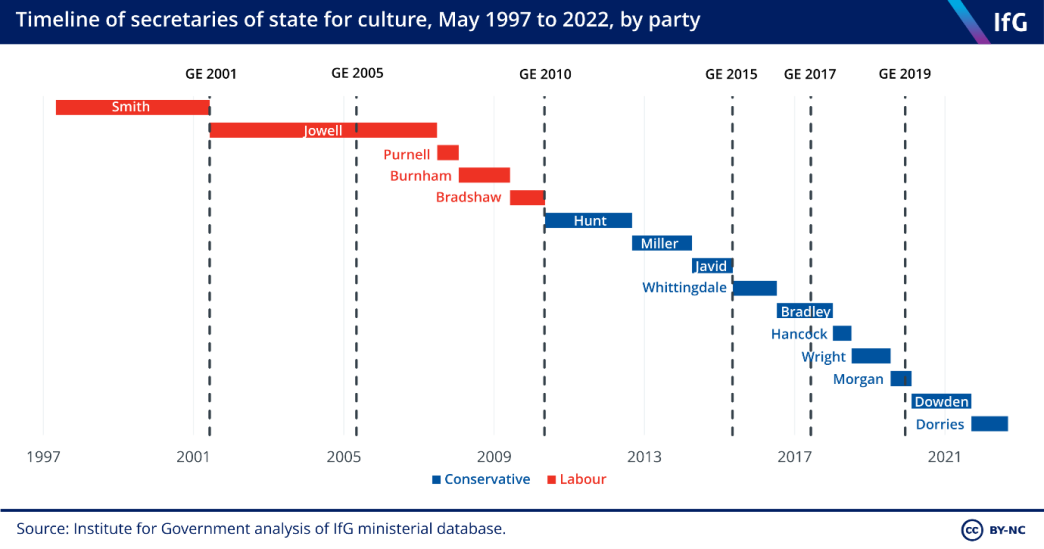
Her replacement will have quite the in-tray, with a couple of important pieces of legislation under way.
Paul Shepley, one of the Institute’s data scientists, writes:
“There’s the Online Safety Bill currently moving through parliament to get something from the 2017 Internet Safety Strategy green paper onto the statute book. Then there’s the Data Protection and Digital Information Bill due for its second reading soon, promising more flexible data protection regulations, reform of the Information Commissioner’s Office and £1bn of business savings over the next 10 years. Keep in mind that the UK’s data market was worth around 4% of GDP in 2020 and data-enabled trade makes the largest contribution to UK international services trade.”
What's at the top of the new PM's in-tray?
6 September 2022, 9:08
First things first – at 9.30 this morning the Institute is hosting an event to discuss the big issues Truss will be dealing with as prime minister. You can watch our discussion with our team of experts here.
Dr Hannah White, IfG acting director, appeared on BBC Breakfast this morning following Boris Johnson's farewell speech.
She warned that incoming PM Liz Truss needs to be careful about stripping back Number 10, as reports suggest – she needs the tools in government to help her deliver. Watch the full interview here.
Liz Truss to become prime minister
6 September 2022, 8:56
Boris Johnson has made his final speech as prime minister and today Liz Truss will become prime minister when she meets the Queen in Balmoral. She’ll then return to London to begin appointing her team.
Welcome back to the IfG live blog, where we’ll be tracking key sackings and appointments, and looking at what the new ministers will be dealing with. We expect a speech from the new PM at around 4:00pm this afternoon and then key appointments will follow and continue throughout the evening, with more junior ministerial ranks being filled tomorrow and later in the week.
Overnight, there were reports that culture secretary Nadine Dorries will not be serving in Truss's government, opening up another vacancy. Currently the cabinet looks like this: where will it be at the end of today?
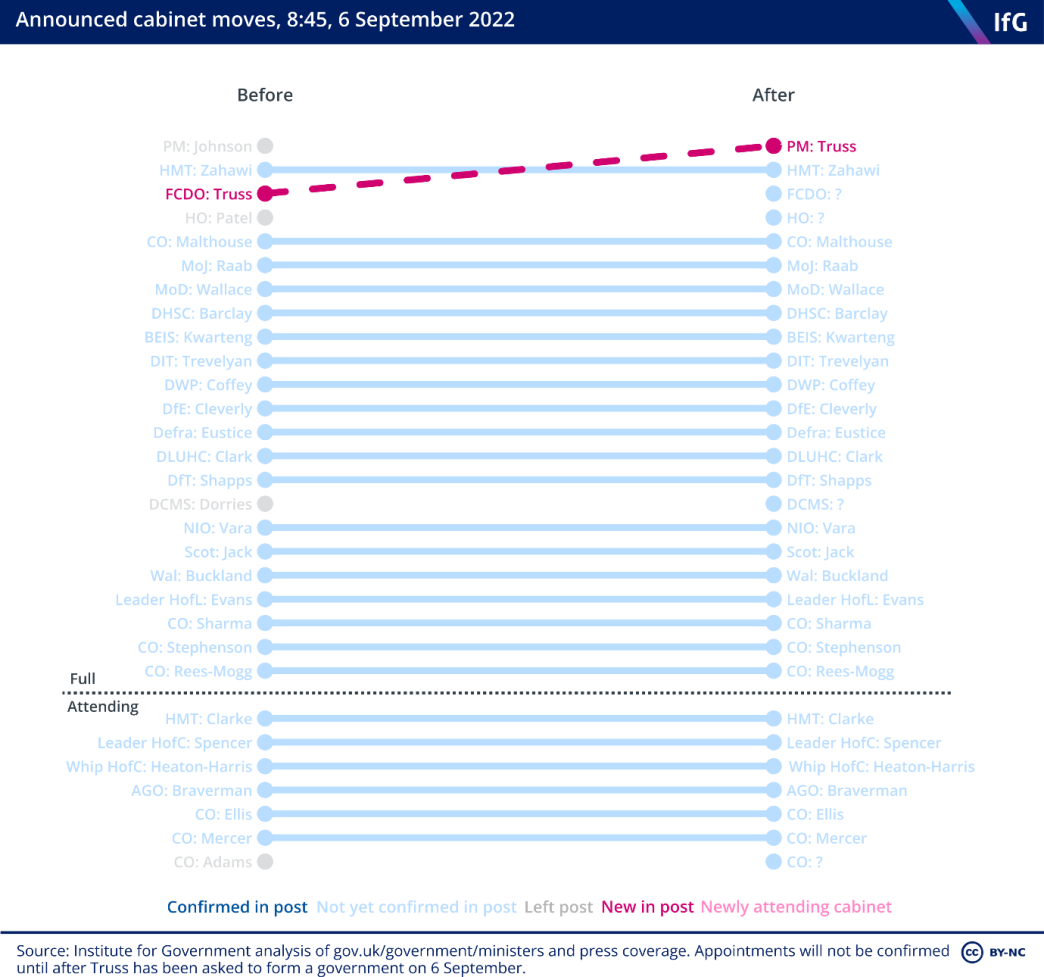
End of Day 1
5 September 2022, 18:32
With ministerial resignations already beginning, all eyes are on Truss's ministerial sackings and appointments once she has formally become prime minister. Around lunchtime tomorrow Truss will meet the Queen to be asked to form a government, and on her return to London will start to build her top team, although we may see more resignations before then, as people leave rather than get pushed out.
We expect key cabinet posts to be announced tomorrow afternoon, with other ministerial roles following throughout the week.
The IfG team are signing off for today, but will be here throughout Truss's first government formation to track sackings and appointments, look into what new ministers will be dealing with, and assess how the new prime minister changes the size and shape of government.
Priti Patel will not serve in Truss's government
5 September 2022, 18:26
Home secretary Priti Patel has announced her resignation from the government, saying once Truss takes over she will return to the backbenches. Briefing over the weekend had suggested that Patel would not be offered a post at Truss's top table, so she is perhaps jumping before she is pushed.
Patel's ministerial career was a steady rise through the ranks, until she had to resign from Theresa May's government after she was found to have misled May about a trip to Israel. She has served as home secretary for all of Johnson's premiership.
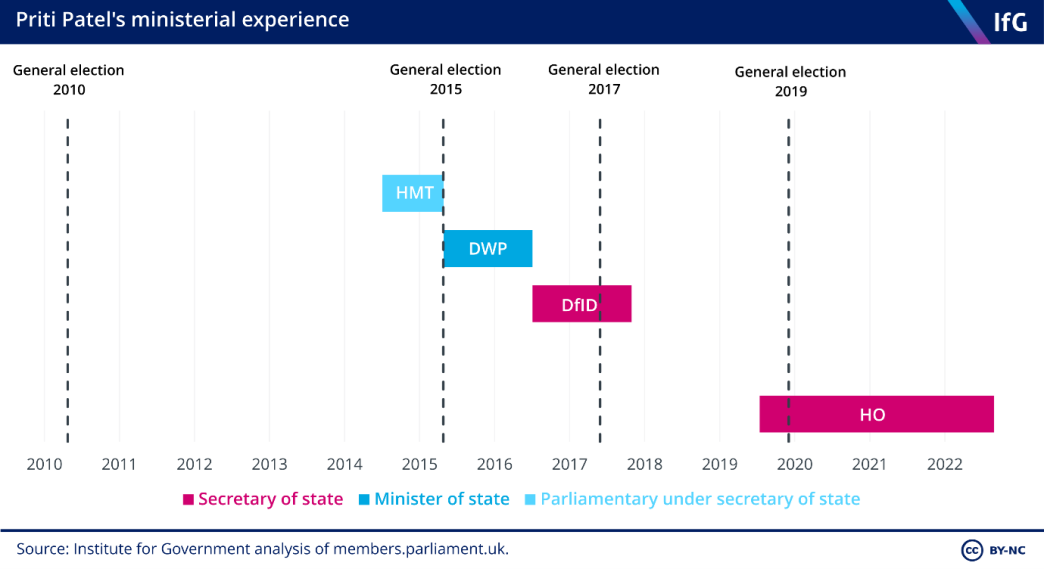
Patel's resignation means Truss needs to fill at least two vacancies in the cabinet - home secretary and her old job, foreign secretary. Of course, we expect lots more change to the cabinet tomorrow - this chart will look quite different in 24 hours' time!
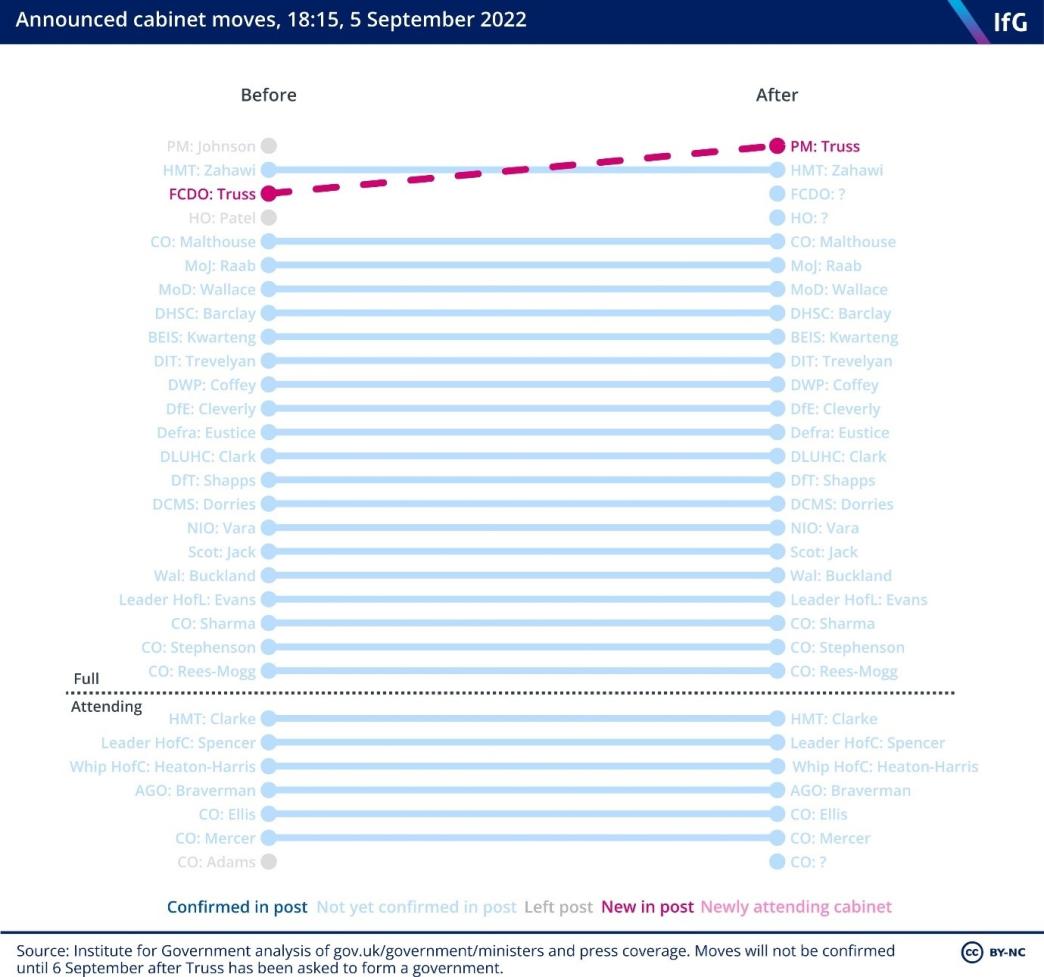
Patel is not the only minister to have resigned this evening - Nigel Adams has also resigned as a minister of state at the Cabinet Office. That means the vacancies in government currently look like this - we may see more resignations over this evening...
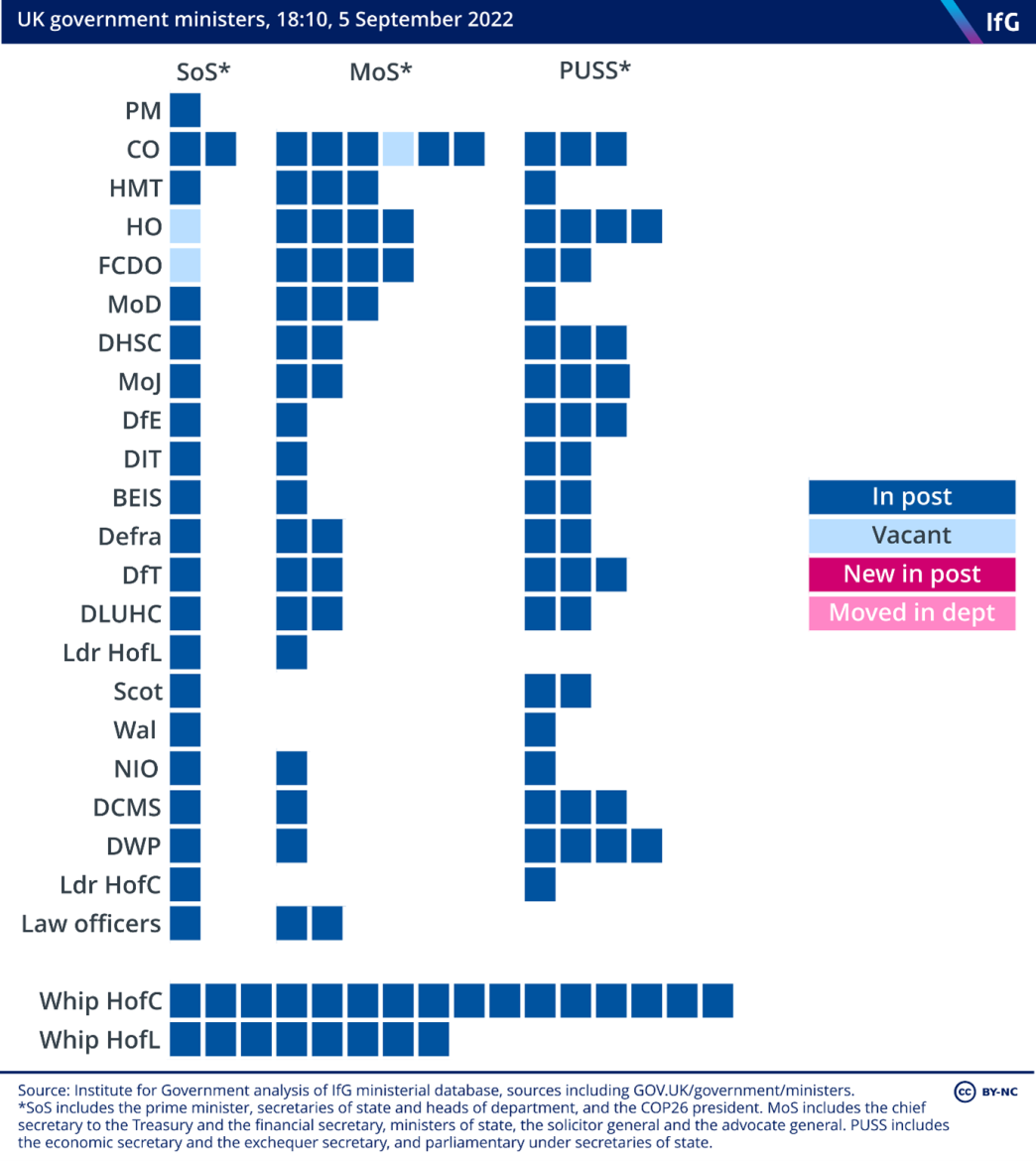
5 September 2022, 17:25
Last week Alex Thomas, head of the IfG's civil service team and a former senior official at the Cabinet Office, wrote a twitter thread last week setting out how the new PM should shape government to ensure it delivers what she wants it to - including making sure that there are clear lines of accountability in No10. You can read his thread here.
One of the recurring themes of Johnson's premiership was frequent changes in the No10 team, as this image details:
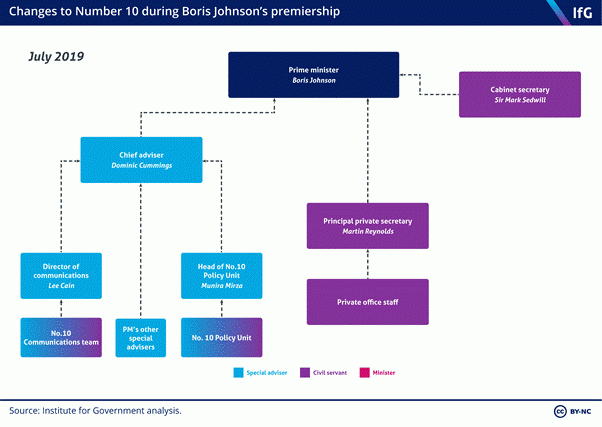
Truss's policy pledges during the campaign
6 September 2022, 16:24
Liz Truss made hundreds of pledges during the leadership campaign – now she will be prime minister, she will have the opportunity to deliver them, writes Jordan Urban from the Institute for Government's civil service team:
"Some of the pledges reflect Institute recommendations. For example, devolving more power to metro mayors was a core recommendation of our report on how metro mayors could help level up England. Updating the Integrated Review of foreign policy with a new focus on Chinese and Russian aggression is an opportunity to make clearer how ‘Global Britain’ will resolve more complex policy-specific tensions – for example, the extent to which the need to reach global net zero and build trade links means engaging with authoritarian states like China and Russia.
Truss made ‘delivery’ her watchword in her acceptance speech, but there are questions over implementation of some of her other pledges. For example, Truss has committed to net zero carbon emissions by 2050 and indicated her support for an expansion of nuclear power. But more engagement with the tax system’s role in reaching net zero and the way net zero is incorporated into UK policymaking will be needed. And there are some pledges that need further work, such as the target of cutting 91,000 civil service jobs. A workforce plan starting with what she envisions the state actually doing is the way to go about things, rather than an arbitrary headcount target. And if the aim is to save money, then money saved should be the metric that civil service leaders are judged on.
Truss will also face the challenge of reconciling her new ideas with the legacy of Johnson’s 2019 manifesto. At a hustings in Cardiff, she told the audience that “we need to prove to people who voted for us in 2019 that we can deliver what we promised in our 2019 manifesto”.
But pledges on taxation and spending mean a Truss government would likely break the manifesto’s fiscal rules. She has also proposed ending the moratorium on fracking promised in 2019, and she has ruled out returning to spending 0.7% of GNI on foreign aid. Truss could learn from the approach Theresa May’s team took when she became prime minister in 2016, and commission an exercise reconciling the manifesto with her priorities, with the authority to where necessary make decisions on how to approach trade-offs between manifesto commitments and her new pledges."
Congratulations from other politicians
05 September 2022 15:31
Politicians have been congratulating Truss on her victory, sending her their support and/or their ideas for what she needs to do differently, depending on their point of view. Her three predecessors as PM and leader of the Conservative policy have all sent tweets:
Boris Johnson wrote this, while Theresa May highlighted some of the issues Truss will be dealing with.
David Cameron says the party should unite around the new leader.
From the other side of the Commons, Sir Keir Starmer has welcomed the person he'll be questioning on Wednesday.
And politicians from across the world have been getting in touch, with the Irish taoiseach saying he's looking forward to working together with Truss - the question of the Northern Irish protocol will be one of the big issues for Truss's premiership.
From Brussels, the president of the European Commission Ursula von der Leyen has said she looks forward to working with Truss, 'in full respect of our agreements' - perhaps a reference to the Protocol.
And, from India, PM Modi has sent his congratulations, saying he hopes the UK and India can continue to strengthen their cooperation.
What do we know about Liz Truss?
5 September 2022, 15:06
On taking office tomorrow, Liz Truss will be the 56th prime minister of the UK and the third female prime minister. She has been MP for South West Norfolk since 2010 and a minister continuously since 2012.
Truss is one of the most experienced prime ministers of recent years, having served in the cabinet for six years, in four roles – most recently foreign secretary. Of recent prime ministers, only Gordon Brown beats her for length of time spent as a minister before ascending to the premiership, and she has served in the highest number of ministerial posts since John Major.
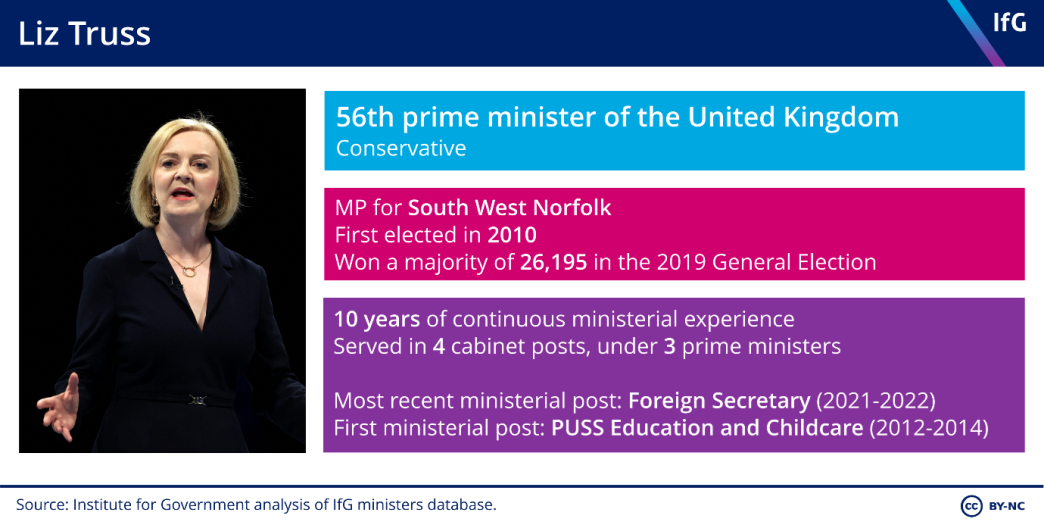
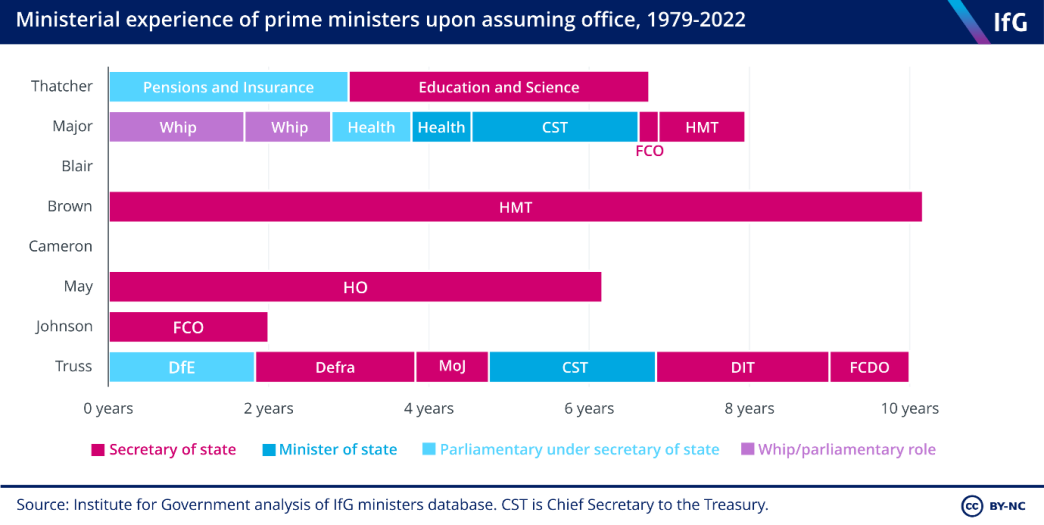
5 September 2022, 14:52
After lunch the IfG hosted a Twitter Space discussing what happens now and what issues Liz Truss will be dealing with over the coming days, weeks and months. You can listen back to the conversation here.
Liz Truss will be the next prime minister
5 September 2022, 13:21
So there we have it: Liz Truss will be the next prime minister. She won the election among Conservative party members with 57% of the vote, beating Rishi Sunak by perhaps a smaller margin than expected. In her short victory speech she thanked party members and MPs, said that she would "govern as a Conservative", and said that the party would focus on winning the election in 2024 - so potentially trying to put to rest speculation about an early election.
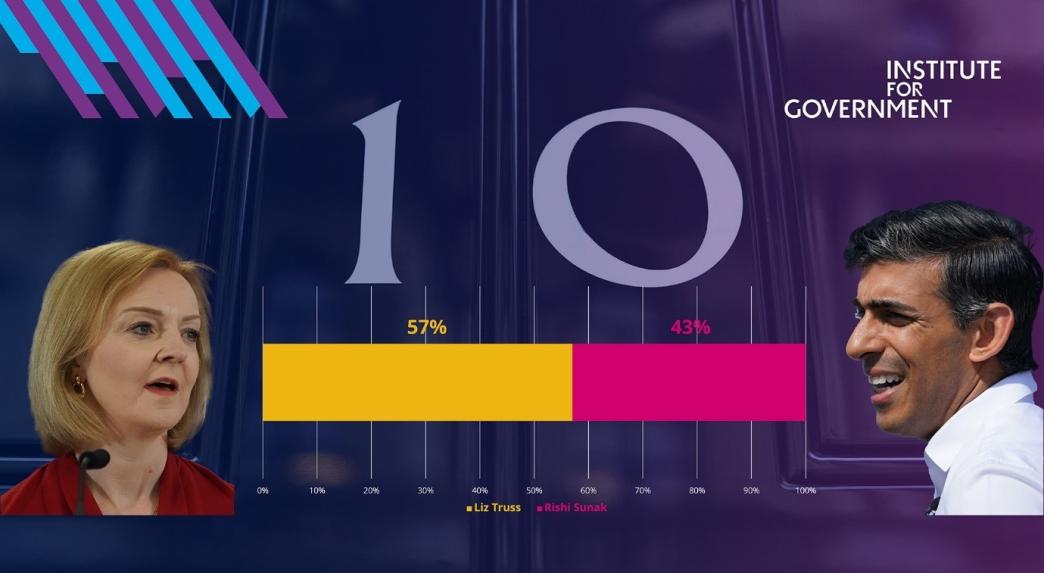
Like many previous winners of Conservative leadership elections, Truss did not have a commanding lead among MPs from the very beginning of the contest. But unlike previous winners, she only made it into the final two in the last round of MP voting, while her opponent Sunak led every stage of the voting – a lead he could not maintain with party members.
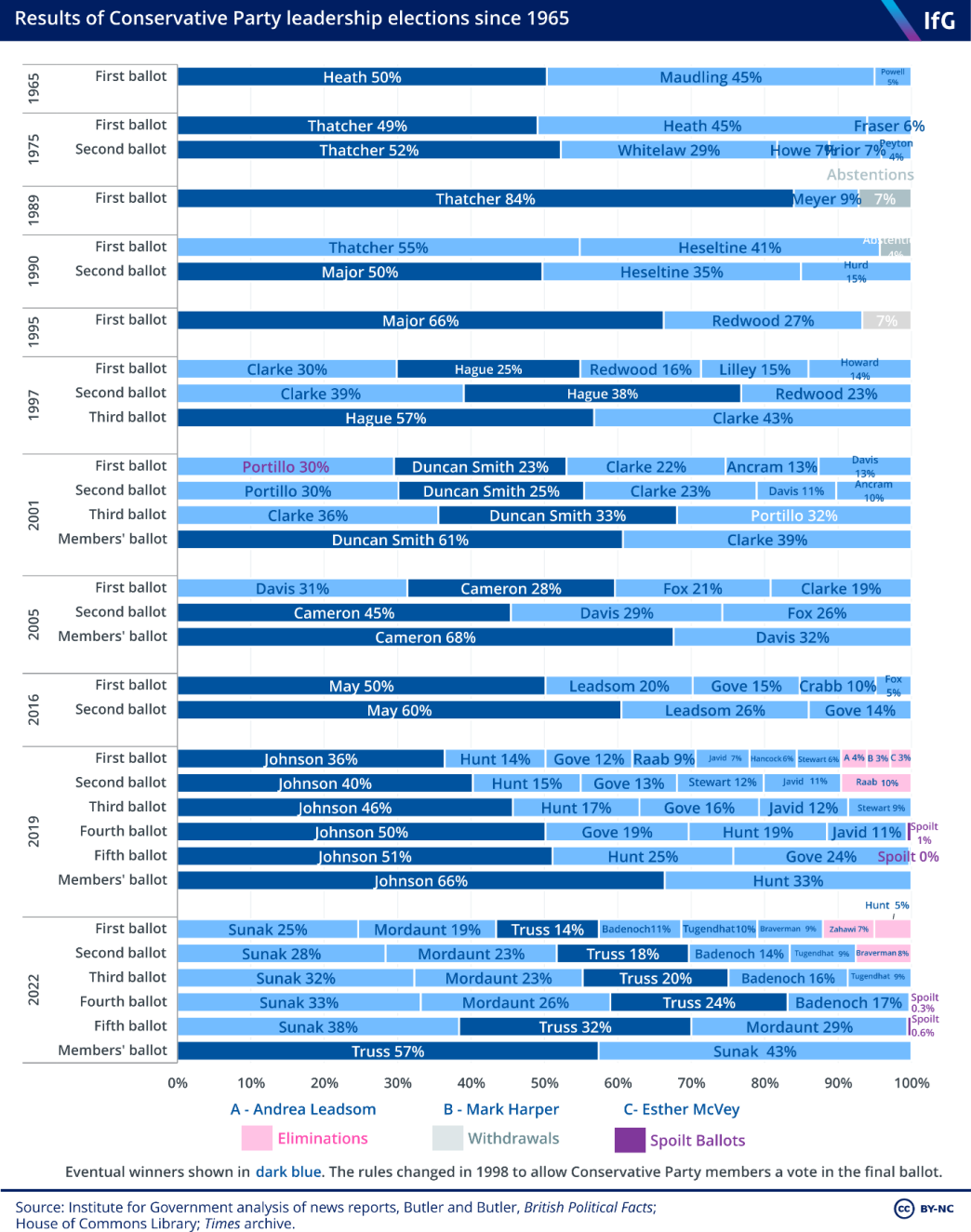
How will the next Prime Minister deal with parliament?
5 September 2022, 11:56
Today parliament returns from its summer recess—but on Wednesday lunchtime, it will be a new prime minister who stands up for Prime Ministers’ Questions, a big parliamentary test for the new PM just hours after they take office. But that is just the first test that parliament will pose for the incoming PM. Truss or Sunak will face a restive parliamentary party that often caused Boris Johnson headaches—and that was before a bruising and lengthy leadership contest. Despite Johnson securing an 80 seat majority at the 2019 general election, he faced frequent backbench rebellions—with 44% of his MPs rebelling at least once since then, and most of them doing so multiple times.
Some of the difficulties that Johnson faced were the result of thorny and contentious issues, like Brexit and measures to address the Covid pandemic. But much of the trouble also stemmed from Johnson’s poor parliamentary handling. Missteps and u-turns—like on the Paterson scandal, or the establishment of the Privileges Committee inquiry into whether Johnson misled the Commons—also made Johnson’s job much harder in parliament.
A key question for the new PM will be whether they are able to improve relations with their own backbenchers, and set up a more effective parliamentary management operation. But this won’t be easy for several reasons. First, the leadership contest has publicly exposed real tensions among Conservative MPs, and healing these won’t be easy—especially if it’s Liz Truss, who was not the choice of most MPs. Second, any reshuffle may mean that there are some disgruntled ex-ministers on the backbenchers—not to mention Johnson himself, with it being unclear what kind of role the former PM sees himself playing in the future. And third, the new PM faces a very difficult in-tray, with MPs likely to want to see quick action on the cost of living.
Something to look out for as the new government is formed are signs of how the new PM intends to address these challenges. Do their new ministerial appointments show signs of trying to restore unity to the party? Which senior figures are now going to be on the backbenchers? And how will Downing Street organise its legislative and parliamentary management operations?
05 September 2022 11:45
The IfG's senior fellow Catherine Haddon was on Sky News this morning talking about the change of prime minister and how the Conservative party chooses its leaders - you can see what she said here.
And as a reminder of how the party elects its leaders, check out our explainer here, with the results from all the stages so far.
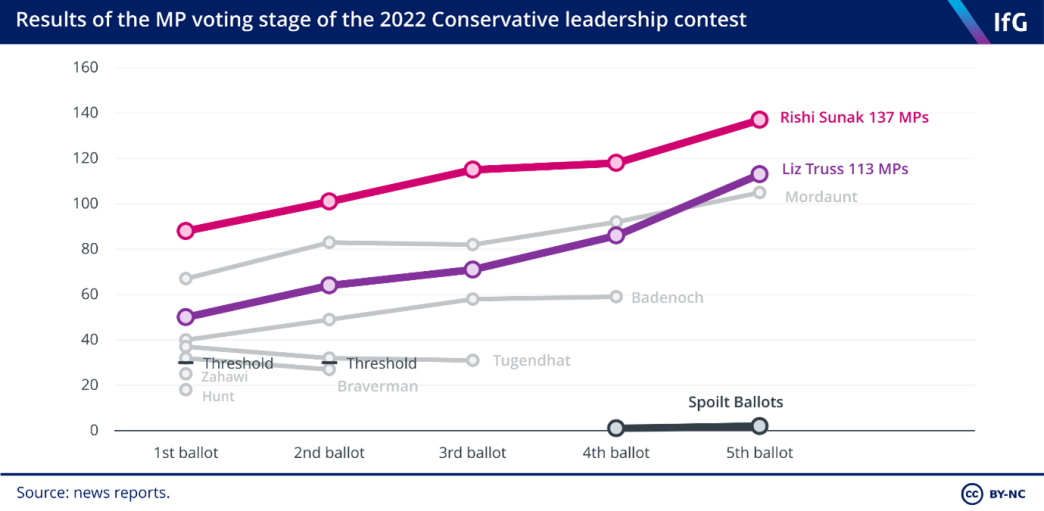
What we'll be looking out for
5 September 2022, 11:17
Ahead of the announcement of the winner of the Conservative leadership contest later today, what are some of the big questions we’ll be hoping to find answers to?
First is of course the question of what the new PM will do about the ongoing cost of living crisis and the looming increase in energy bills. Reports have suggested that Liz Truss will make a big announcement soon if she wins, although the details are not yet known.
Another big question is who will get which jobs in the new prime minister’s government. There have been lots of rumours about appointments, including that business secretary Kwasi Kwarteng will be the next chancellor, but of course nothing is confirmed until the new prime minister has been appointed by the Queen and has started building their cabinet – so we won’t find out any formal appointments until tomorrow afternoon. As well as chancellor, key posts to look out for include the energy secretary (Including whether there will be a newly-created department of energy, something that has been rumoured).
And as the new prime minister gets settled in, how much distance will they try to put between them and their predecessor? Will Truss or Sunak want to keep many of Johnson’s cabinet and flagship policies – including levelling up – or will they want to make clear that they’re going to be a very different prime minister? And will they change the structures of No10? Again, there have been rumours that Truss is planning a ‘slimmed down’ Downing Street – which posts will she get rid of? And will she, like Cameron before her, end up expanding her team after realising that a bigger team helps a PM ensure they have better oversight of what the rest of government is doing?
There are many other big questions the new prime minister will face – we’ll try and keep track of them over the next few days. If you have thoughts and questions, get in touch with us on twitter!
New prime minister live blog
5 September 2022, 10:45
Good morning and welcome to the IfG’s live blog charting the appointment of the next prime minister and their cabinet. Over the next few days the IfG’s team of experts will bring you in-depth analysis on who’s in and who’s out, their backgrounds and experience, and what they’ll be dealing with as the new government sets out its priorities.
We’re expecting the result of the Conservative leadership election at around 12:30 today – Liz Truss has been the favourite throughout the contest according to various polls, will that be borne out in the result?
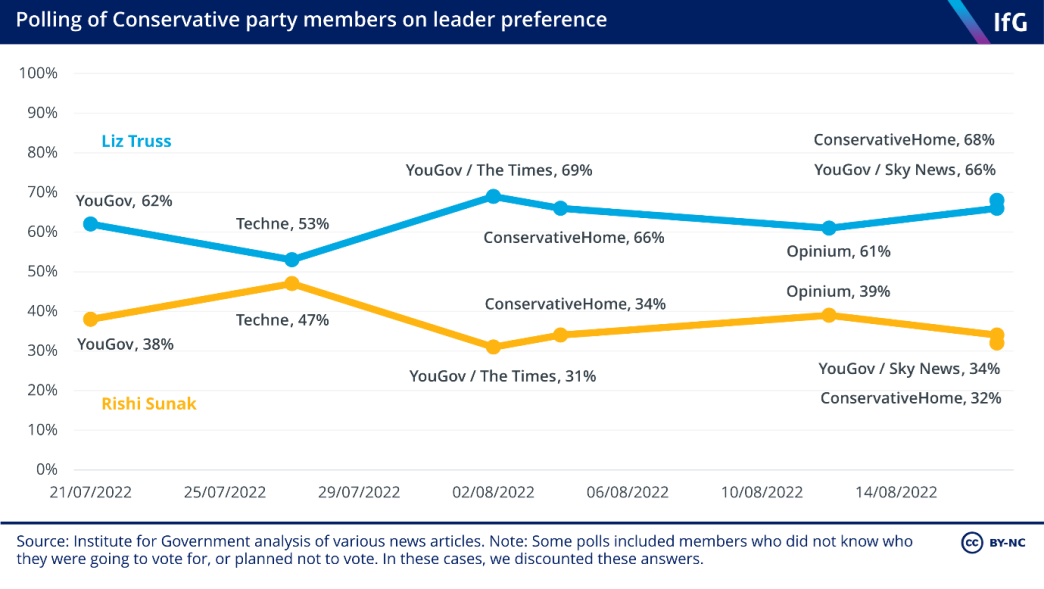
Once the result is announced, the winner does not become prime minister immediately. That takes place once Boris Johnson has resigned formally – he’ll be heading to Scotland and will hand his resignation to the Queen tomorrow. Then, the Queen will invite the winner of the electoral contest to become prime minister and form a government.
The winner will then head back to Downing Street and start appointing their cabinet, with other ministerial appointments following throughout the week. As ever, we’ll be keeping track of appointments – follow this blog and our team on twitter for all the latest analysis.
- Topic
- Ministers
- Keywords
- Government reshuffle Leadership election
- Political party
- Conservative
- Position
- Prime minister
- Administration
- Truss government
- Public figures
- Liz Truss
- Publisher
- Institute for Government